

Teaching and Learning report 2019
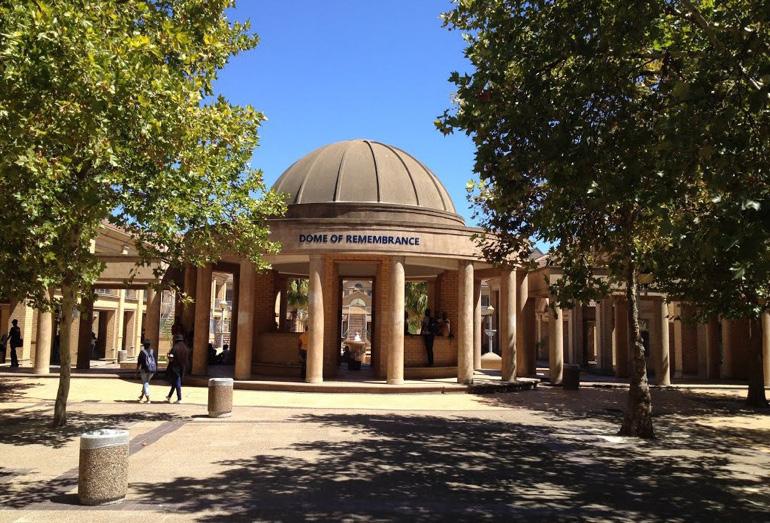

as the 2019 chapter comes to an end, the Teaching and Learning report once again celebrates the many exciting projects and activities initiated at the cape Peninsula University of Technology (cPUT). as we know, higher education institutions operate in a highly dynamic environment and cPUT has shown itself to be resilient and agile by adapting to new challenges through the engagement of stakeholders across the university community. Being one of the largest UoTs in south africa, with approximately 36000 students, cPUT has remained focused on Vision 2020 to be, “at the heart of technology education and innovation in africa”. Moving forward to 2020, we take this moment to honour the members of our teaching and learning community, students and all other stakeholders, who give of themselves to enact this vision through the programmes and projects outlined in this report. as we usher out 2019, we welcome the new dawn of Vision 2030 which will be premised on “one smart cPUT”. The report reveals that faculties, departments, support units and centres have taken on board the invitation by the Vice chancellor, Prof nhlapo, who stated “our one smart cPUT is focused on more than the technological world. it is our renewed contract with human-centricity and our biggest assets and resources – our people.” Many of the teaching and learning initiatives included in this report suggest a commitment towards this end by improving the levels of engagement on an institution-wide basis.
against this background, we welcome the inclusion of the hod Forum in the Teaching and Learning report. The work done by the Forum continues to produce good results as hods engage in dialogue and share best practice with the aim of ensuring a quality experience for cPUT students. The nature of the projects undertaken by the hod Forum has strengthened cPUTs efforts in the alignment of qualifications with the higher education Qualification sub-Framework (heQsF), assessment considerations and the integration of quality management systems. as an institution we continually strive to create a more inclusive, supportive educational environment. an important initiative that continues to gain momentum is the student Feedback on Teaching and courses. The uptake of student feedback across faculties is very encouraging with lecturers soliciting feedback from students. The benefits of the resultant increased engagement is reflected in the transformed thinking about teaching and learning which brings a new awareness to collaborative working amongst lecturers and students. We encourage this pedagogic approach that fosters partnerships between academic staff and students, leading to supportive learning relationships. This is made possible by the willingness, resilience and strength of our students, who despite their own hardship and struggle, contribute greatly to the success of the institution. The multiplicity of peer academic support initiatives such as the First
Year experience, Mentor and retention officer Programmes, and Peer Tutor and Teaching assistant development is a testament of this commitment. The aforementioned student support interventions have enhanced student success in the areas of student transition, student first year experience, academic literacy, mathematics development and integration through the development of learning communities. as part of cPUT’s commitment to develop students’ capabilities, a graduate attributes (ga) charter was drafted. The ga charter remains a work in progress. The human-centricity is evident in the exciting projects undertaken across all faculties with novel pedagogic approaches. The work conducted by the Professional education research institute(Peri), under the leadership of Prof. Winberg through developments in Work integrated Learning which explores laboratorybased learning in the sTeM field and disciplines, holds tremendous value for students. innovative projects such as these provide cPUT students with employability skills and personal attributes which greatly enhance the prospect of success. The potential is far-reaching for future collaborative industry projects, placing students at the heart of the teaching and learning agenda.
it is inspiring to see cPUT’s involvement in community wellness projects, making a difference while learning at the same time. engaging students and staff to re-imagine higher education spaces as part of decolonisation in creative ways, celebrating women as they make their mark in the maritime world and learning how to solve “real World Problems in real World contexts” together is developing a new academic attire. Many of the initiatives have involved collaboration, scholarship and research with support departments like community engagement and Work integrated Learning, centre for innovative educational Technology and Fundani: centre for higher education development.
a Faculty review of Teaching, Learning, assessment Practices and interventions towards student success has been initiated by the dVc
Teaching and Learning report 2019
Teaching & Learning. This annual event critically looks at the academic performance of each Faculty. This intended to critically analyse key indicators that impact on student success. it includes input from the different Faculties together with academic support units like the centre for innovative educational Technology, community engagement & Work integrated Learning (WiL), centre for Professional and Personal development (cPPd) and Fundani. The first review took place on 3-4 december 2019.
This engagement is intended to utilize the various support units like the Quality Management department and institutional Planning to assist in creating the conditions for faculties to understand critical trends that impact on academic performance and to ensure that we map significant predictions for effective interventions towards student success. interventions are introduced to enhance areas that require improvement and this will be reviewed on an annual basis to establish the extent to which we have made progress. The next review exercise will take place on 3-4 december 2020.
Lastly, i would like to commend the staff and students who have demonstrated excellence in teaching and learning, creative outputs and science breakthroughs. The achievements reflected in this report are inspiring and make significant contributions towards improving teaching and learning at the cape Peninsula University of Technology. Moreover, the array of initiatives implemented, fundamentally focused on creating the best possible experience for our students towards achieving success. gratitude is extended to the contributors, as well as to Fundani ched for taking the lead in bringing this together. Whilst there is still much work to be done, what has been accomplished is significant. i wish to thank the staff and students who have gone beyond teaching and learning to make the educational experience at cPUT a positive one.

Prof Rishidaw Balkaran
namate die einde van 2019 se hoofstuk aanbreek, vier die onderrig- en Leerverslag opnuut die vele opwindende projekte en aktiwiteite wat by die Kaapse skiereiland Universiteit van Tegnologie (KsUT) van stapel gestuur is. soos ons weet, werk hoëronderwysinstellings in ’n dinamiese omgewing en het die KsUT getoon dat dit veerkragtig en rats is om aan te pas by nuwe uitdagings deur die betrokkenheid van belanghebbendes oor die hele universiteitsgemeenskap heen. omdat hierdie instelling een van die grootste universiteite van tegnologie in suid-afrika is, met ongeveer 36 000 studente, kon KsUT gefokus bly op Visie 2020, naamlik “om die hartklop van tegnologie-opvoeding en innovasie in afrika te wees”. op die pad na 2020 gebruik ons die geleentheid om die lede van ons onderrig- en leergemeenskap, die studente, en al die ander belanghebbendes, wat soveel van hulself gee om hierdie visie te realiseer, te vereer aan die hand van die programme en projekte wat in hierdie verslag uiteengesit word. Terwyl ons 2019 agterlaat, verwelkom ons die aanbreek van die nuwe begin van Visie 2030 wat berus op die leuse “one smart cPUT”. die verslag dui aan dat fakulteite, departemente, steuneenhede en sentrums die uitnodiging van die visekanselier, prof nhlapo, ter harte geneem het, “ons ‘one smart cPUT’ is op meer as net die tegnologiese wêreld toegespits. dit is ons hernude kontrak met mensgerigtheid en ons grootste bates en hulpbronne – ons mense.” heelwat van die onderrig- en leerinisiatiewe wat in hierdie verslag opgeneem is, dui op ’n verbintenis tot dié doel: om die vlak van betrokkenheid oor die hele instelling heen te verbeter.
Teen hierdie agtergrond verwelkom ons die insluiting van die departementshoofde forum in die onderrigen Leerverslag. die werk wat die Forum verrig, lewer steeds goeie resultate deurdat departementshoofde by dialoog betrokke raak en die beste praktyke deel met die doel om ’n gehalte ervaring vir KsUT studente te verseker. die aard van die projekte wat deur die departementshoofde forum aangepak word, versterk KsUT se pogings om kwalifikasies in pas te bring met die hoëronderwyskwalifikasie-subraamwerk (heQsF), die assesseringsoorwegings en die integrasie van gehaltebestuurstelsels. as instelling streef ons voortdurend daarna om ’n meer inklusiewe, ondersteunende onderwysomgewing te skep. ’n Belangrike inisiatief wat steeds momentum kry, is die studente terugvoer oor onderrig en Kursusse. die gebruik van studenteterugvoer oor fakulteite heen is werklik bemoedigend namate dosente die studente om terugvoer nader. die voordele van die gevolglike verhoogde betrokkenheid word weerspieël in getransformeerde denkwyses oor onderrig en leer, wat ’n nuwe bewustheid kweek vir medewerking tussen dosente en studente. ons verwelkom hierdie pedagogiese benadering wat vennootskappe tussen akademiese personeel en studente aanmoedig en tot ondersteunende leerverhoudings lei. dit word moontlik gemaak deur die bereidwilligheid, veerkragtigheid en lewenskrag van ons studente, wat ondanks hul eie swaarkry en stryd, beduidend tot
die sukses van die instelling bydra. die veelvuldigheid van die inisiatiewe wat eweknie-akademiese steun betref, ingesluit die eerstejaarservaring, die Mentoren retensiebeampteprogram, en eweknie-tutor en Leerassistent ontwikkeling, getuig van hierdie verbintenis. die voormelde intervensies ten opsigte van studentesteun het studentesukses verbeter op die gebied van studente oorgang; die eerstejaarservaring van studente; akademiese geletterdheid; wiskundeontwikkeling; asook integrasie deur die ontwikkeling van leergemeenskappe. as deel van KsUT se verbintenis tot die ontwikkeling van studentevermoëns is ’n eienskappe van graduandi- (eg )handves opgestel. die eg handves is werk wat voortgaan. die mensgerigtheid blyk uit die opwindende projekte wat in alle fakulteite met vars pedagogiese benaderings aangepak word. die werk van die professionele onderwysnavorsingsinstituut (Peri) onder leiding van prof Winberg met die ontwikkeling van Werkgeïntegreerde Leer (WgL), wat laboratoriumgebaseerde leer in die veld en dissiplines van Wetenskap, Tegnologie, ingenieurswese en Wiskunde (sTeM) ondersoek, hou ontsaglike waarde vir studente in. innoverende projekte soos hierdie voorsien KsUTstudente van die werkgeskiktheidsvaardighede en persoonlike eienskappe, wat die vooruitsig op sukses aansienlik verbeter. die potensiaal is verreikend vir toekomstige samewerkende nywerheidsprojekte en plaas studente boaan die onderrig- en leeragenda.
dit is inspirerend om die betrokkenheid van die KsUT by gemeenskapswelstandprojekte te sien; hier word ’n verskil gemaak terwyl leer terselfdertyd plaasvind. deur studente en personeel by die kreatiewe herbesinning oor hoëronderwysruimtes as deel van dekolonisering te betrek; vroue te vier namate hulle hul in die maritieme wêreld onderskei; en te leer hoe om “probleme in die Werklike Wêreld binne kontekste in die Werklike Wêreld” saam op te los, word as ’t ware as die ontwikkeling van ’n vars akademiese gewaad beskou. Verskeie van die inisiatiewe behels samewerking, vakkundigheid en navorsing met steundepartemente soos gemeenskapsbetrokkenheid en Werkgeïntegreerde Leer, die sentrum vir innoverende opvoedkundige Tegnologie, en die Fundani-sentrum vir
hoëronderwysontwikkeling (Fundani ched).
’n Fakulteitsoorsig van onderrig, Leer, assesseringspraktyke en intervensies ten opsigte van studentesukses is deur die aVK: onderrig en Leer geloods. hierdie jaarlikse geleentheid kyk op kritiese wyse na die akademiese prestasies van elke fakulteit. dit het ten doel om kernaanwysers wat ’n invloed op studentesukses het, krities te ontleed. dit sluit insette van die onderskeie fakulteite in, tesame met akademiese steuneenhede soos die sentrum vir innoverende opvoedkundige Tegnologie, gemeenskapsbetrokkenheid en Werkgeïntegreerde Leer (WiL), die sentrum vir Professionele en Persoonlike ontwikkeling (cPPd), en Fundani. die eerste oorsig is op 3 tot 4 desember 2019 onderneem. die oogmerk met dié betrokkenheid is om die onderskeie steeneenhede, soos die departement gehaltebestuur en institusionele Beplanning, te betrek by skep van toestande wat fakulteite laat insien watter impak kritiese tendense op akademiese prestasie het en te verseker dat ons sinvolle voorspellings uitstippel met die oog op effektiewe intervensies vir studentesukses. intervensies word ingestel om gebiede aan te vul wat verbeter moet word, en dit word jaarliks hersien om te bepaal in watter mate ons vordering maak. die volgende oorsig oefening word op 3 tot 4 desember 2020 onderneem.
Laastens betoon ek lof aan die personeel en die studente wat uitnemendheid in onderrig en leer, kreatiewe uitsette en wetenskapdeurbrake behaal het. die prestasies wat in hierdie verslag weerspieël word, dien as inspirasie en lewer belangrike bydraes tot die verbetering van onderrig en leer aan die Kaapse skiereiland Universiteit van Tegnologie. die verskeidenheid geïmplementeerde inisiatiewe is fundamenteel toegespits op die heel beste studente ervaring moontlik in die strewe na studentesukses. erkenning word verleen aan al die bydraers, sowel as Fundani ched, wat die leiding geneem het om hierdie insette by mekaar te bring. alhoewel daar nog heelwat werk te doen is, is dit wat reeds bereik is van die uiterste belang. ek bedank graag die personeel en die studente wat die ekstra myl met onderrig en leer loop om die opvoedkundige ervaring aan die KsUT ’n positiewe ervaring te maak.
aM B e T h e Y e s e K e L a n QU n U n U UNjing Rishidaw Balkaran

njengoko simvala u-2019, ingxelo yokuFundisa nokuFunda kwakhona ibhiyozela iiprojekthi nemisebenzi emininzi eqalwe kwicape Peninsula University of Technology (cPUT). njengoko sisazi, amaziko emfundo ephakamileyo asebenza kwiimeko eziguquguquka kakhulu yaye i-cPUT iye yazibonakalisa yomelele yaye iguquka lula ngokuthi izivumelanise nemingeni emitsha ngokufakan’ imilomo nazo zonke iiyunivesithi. njengoko iyenye yezona UoT zinkulu eMzantsi afrika, ngabafundi abamalunga ne-36000, i-cPUT iye yaqhubeka ijolise kuMbono ka-2020 wokuba “sembindini wemfundo yetekhnoloji nokuyila eafrika”. ngoxa sihlabela mgama sisiya ku-2020, sithatha eli thuba ukuze sinike imbeko kumaqabane ethu okufundisa nokufunda nabo bonke abanye ababandakanyekileyo abathi bazincame ukuze baphehle lo mbono ngezi nkqubo neeprojekthi zichazwe kule ngxelo. njengoko siphuma ku-2019, samkela ukuvela koMbono ka2030 oya kusekelwa “kwi-cPUT enye ekrelekrele” (one smart cPUT). Le ngxelo idiza ukuba iifakhalthi, amasebe, amacandelo namaziko enkxaso aye asabela kwisimemo sesekela nqununu, unjing. nhlapo, owathi “i-cPUT Yethu enye ekrelekrele ijolise ngaphaya kwezeteknoloji. Yikontrakti yethu ehlaziyiweyo ejolise eluntwini nezona aseti nobuncwane bethu obuxabisekileyo – abantu bethu.” amaphulo amaninzi okufundisa nokufunda aqukiweyo kule ngxelo abonisa ukuzimisela ekufezeni le njongo ngokuphucula imilinganiselo yokufakan’ imilomo kwiziko.
Xa sijonga le meko, siyakwamkela ukuqukwa kweForam ye-hod kwingxelo yokuFundisa nokuFunda. Umsebenzi owenziwa yile Foram uvelisa iziphumo ezihle njengoko ii-hod zifakan’ imilomo zize zabelane ngenjongo yokuqinisekisa amava asemgangathweni kubafundi be-cPUT. Uhlobo lweeprojekthi eziye zathathwa yiForam ye-hod luye lomeleza imigudu ye-cPUT yokulungelelanisa iimfaneleko nesiseko esingaphantsi seeMfaneleko zeMfundo ePhakamileyo (higher education Qualification sub Framework ̶ i-heQsF), izinto ezifunyaniswe kuhlolo nokuqukwa kweenkqubo zokulawulwa komgangatho. njengeziko sisoloko sizabalazela ukuyila imo equkayo, nexhasayo ngokwezemfundo. iphulo elibalulekileyo eliqhubekayo lifumana amandla yinkcazelo yaBafundi engokuFundisa neZifundo. Ukuthathwa kwenkcazelo yabafundi kwiifakhalthi kukhuthaza kakhulu njengoko abahlohli becela inkcazelo kubafundi. iinzuzo zokufakan’ imilomo okungumphumo zibonakala ekucingeni okutshintshileyo ngokufundisa nokufunda okuza nolwazi olutsha ngokusebenzisana phakathi kwabahlohli nabafundi. sikhuthaza le mfundo ikhuthaza ubudlelane phakathi kwabasebenzi bezemfundo nabafundi okukhokelela kulwalamano lokufunda ngenkxaso. oku kuphunyezwa kukuzimisela, ukomelela namandla abafundi bethu, abathi nokuba kunzima bezabalaza, babe negalelo elivakalayo ekuphumeleleni kweli ziko. Ukuba maninzi kwamaphulo okubambisana kwezemfundo njengeenkqubo ezinjenge-First Year experience, i-Mentor and retention officer Programme kunye ne-Peer Tutor and Teaching assistant yimbonakaliso yoku kuzimisela. La
maphulo achazwe ngasentla okuxhasa abafundi aye akhuthaza impumelelo yabafundi kumacandelo okutshintsha kwabafundi, amava abafundi onyaka wokuqala, ezemfundo, uphuhliso kwizibalo, nokuquka ngokuphuhlisa abo bafundayo. njengenxalenye yokuzimisela kwe-cPUT ukuphuhlisa ubuchule babafundi, kwabhalwa umgaqo-nkqubo wabathweswa-zidanga owaziwa njenge-graduate attributes (ga) charter. Umgaqo-nkqubo we-ga kuhlala kusetyenzwa kuwo. Ukunikela ingqalelo ebantwini kubonakala kwiiprojekthi ezibangel’ umdla ezenziwa kuzo zonke iifakhalthi ngeendlela ezintsha zemfundo. Umsebenzi oqhutywa yi-Professional education research institute (i-Peri), phantsi kobunkokeli bukanjing. Winberg ngophuhliso ekuFundeni okuhlanganisa uMsebenzi i-WiL (Work integrated Learning) ehlola ukufunda okusekelwe elebhu kumacandelo esTeM, kunexabiso elimangalisayo kubafundi. iiprojekthi zobugcisa ezifana nezi zinika abafundi be-cPUT ubugcisa obubenza baqeshwe neempawu zobuqu ezilikhuthaza kakhulu ithemba lokuphumelela. Likhulu kakhulu ithemba lokusebenza kwixesha elizayo kwiiprojekthi zorhwebo, kubekwa abafundi kwindawo ebalulekileyo kumba wokufundisa nokufunda.
Kuyakhuthaza ukubona i-cPUT ibandakanyeka kwiiprojekthi zokuba sempilweni zabahlali, besenza umahluko ngoxa befunda kwangaxeshanye. Ukufakan’ imilomo nabafundi nabasebenzi ukuze ukhangele izithuba zemfundo ephakamileyo njengenxalenye yokususa ubukoloniyali ngeendlela ezichuliweyo nokubhiyozela amanina njengoko esenza igalelo elibonakalayo kwezokuhamba ngolwandle yaye befunda indlela yokusombulula “iingxaki zehlabathi zoKwenene ngokwendlela yehlabathi loKwenene” bebambisene uhloboolutsha lwezemfundo. amaphulo amaninzi aye aquka ukufakan’ imilomo, inkxaso-mali nophando namasebe axhasayo njenge-community engagement ne-WiL, iZiko loBugcisa beTheknoloji yezeMfundo i-cieT, kunye neZiko leMfundo ephakamileyo i-Fundani.
Uhlolo lweFakhalthi lokuFundisa, ukuFunda, iinkqubo Zohlolo nongenelelo olujoliswe kwiMpumelelo yaBafundi luye lwaqalwa yi-dVc yokuFundisa
nokuFunda.. esi siganeko saminyaka le sijonga indlela eqhuba ngayo ezifundweni iFakhalthi nganye. oku kusekwe ngenjongo ukuhlalutya izalathi eziyintloko ezinegalelo kwimpumelelo yabafundi. oku kuquka izimvo ezivela kwiiFakhalthi ezahlukeneyo kunye namacandelo enkxaso yezemfundo njengeZiko loBugcisa beTheknoloji yezeMfundo, Ukufakan’ imilomo noLuntu nokuFunda okudibene noMsebenzi (community engagement & Work integrated Learning – i-WiL), iZiko lophuhliso luseManqwanqweni noloBuqu (cPPd) noFundani. Uhlolo lokuqala lwabakho nge-3-4 kudisemba 2019.
oku kufakan’ imilomo kujoliswe ekusebenziseni amacandelo awahlukeneyo enkxaso njengesebe lokuLawula umgangatho nezicwangciso zeZiko ukunceda ekuyileni iimeko zeFakhalthi ukuze iqonde imizila ebalulekileyo enegalelo kwindlela ekuqhutywa ngayo kwezemfundo nokuqinisekisa ukuba sicwangcisa uqikelelo olululo ukwenzela ungenelelo olululo ukuze abafundi baphumelele.
Ungenelelo luqaliswa ukukhuthaza iinkalo ezifuna uphuculo yaye oku kuya kuhlolwa qho ngonyaka ukuze kubonwe umkhamo esiye senza ngawo inkqubela. Uhlolo olulandelayo luya kubakho nge-3-4 disemba 2020.
okokugqibela, ndingathanda ukuncoma abasebenzi nabafundi abaye babonisa ubugcisa ekufundiseni nasekufundeni, inkcazelo enobugcisa nempumelelo kwezenzululwazi. izinto eziphunyeziweyo ezivela kule ngxelo ziyakhuthaza yaye zenza igalelo elibalulekileyo ekuphuculeni ukufundisa nokufunda kwicape Peninsula University of Technology. ngaphezu koko, uthotho lwamaphulo aye enziwa, ajolise ngokuyintloko ekuyileni awona mava asemgangathweni kubafundi bethu ukuze baphumelele. sidlulisela ongazenzisiyo umbulelo kwabo baye banefuthe, kwakunye neFundani ched ngokuthatha ukhokelo ekuhlanganiseni le nto. nangona kusekho umsebenzi omnnzi omele wenziwe, inkulu into eyenziweyo. ndithanda ukubulela abasebenzi nabafundi abaye badlulela ngaphaya kokufunda ukuze benze ukufunda e-cPUT kube ngamava amnandi.
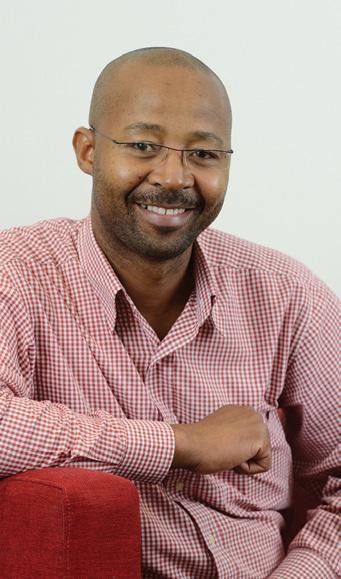
as 2019 is drawing to a close, as a university we continue to embrace and give priority to teaching and learning; and this commitment has been, and continues to be, fulfilled in different forms, which include building capacity in the domains of student support, curriculum renewal and transformation, as well as in academic staff development. The UcdP has been at the centre stage in terms of facilitating and supporting cPUT’s teaching and learning projects and sub-projects, as well as research in teaching and learning. Mutually inclusive pillars meant to drive these three teaching and learning imperatives have not only been foregrounded to address notions of inequal-ities in higher education in general but have also been entrenched in social justice orientations towards achieving quality teaching and learning at cPUT in particular.
in 2019, the dheT‘s overall allocation for cPUT was r 28 604 391, all of which was directed at developmental initiatives and interventions intended to advance and improve the academ ic project, as categorised in the areas mentioned above. during the year under review, we have continued with a wellcoordinated plan in which critical sub-categories (comprising (i) student development and success, (ii) staff development, (iii) capacity development and training in research, (iv) work-integrated learning and community engagement and (v) curriculum renewal) have
received more attention than before; and these imperatives have been amplified through the application of the Logic Model. cPUT has benefited from a number of workshops hosted in 2019 in favour of the 2018–2020 UcdP implementation cycle; and, as a result of that, the Monitoring and evaluation (M&e) of the grant under the auspices of stellenbosch University’s centre for research on evaluation, science and Technology (cresT), in partnership with the department, has crafted a better framework for the implementation of the UcdP.
Based on the lessons learnt from 2018, in the current year (2019), the university’s academic project has displayed better and more informed approaches and methods to drive the implementation process. The student success ecosystem has gained some momentum; and, in part, this can be attributed to academic literacy interventions which continue to give impetus to the faculties. For example, based on feedback, the Fundani Maths support Project is considered to have made excellent progress in supporting student success at the Faculty of engineering; and this achievement has generated some interest from other faculties. another critical academic literacy and sociocultural intervention project, namely cPUT101, has been piloted across faculties, and has targeted specific departments with a view to equipping students o V e r V i e W F r o M T h
with the necessary skill sets, both academically and socially during their firstyear experience.
other flagship student-related programmes continue to receive priority. We are becoming increasingly aware of the fact that cPUT students require intermittent and continuous academic support and interventions. in line with the sentiments of the broader developmental goals of access, success and transformation, student academic support programmes, such as tutoring, mentoring and teaching assistantship schemes, have registered some spinoffs in 2019. aligned to cPUT’s graduate attributes, students who are directly involved tutors are given the opportunity to develop their own leadership, relational and critical thinking skills, all of which are necessary for and in their future employment.
in recent times, we have come to realise the risks and threats associated with some of our academic programmes (e.g. tutorial programmes) being fully funded through the Ucdg; and, given the spinoffs that are associated with these academic support programmes, the institution has taken a bold step to make incremental financial provision for the Tutorial programme in particular with a view to funding such a programme fully, as it forms an essential part of the cPUT academic project.
also involved in our vision for the future, some of our intentions involve giving priority to subjects at risk, and thus identifying available support mechanisms and those which are unavailable, and planning accordingly. This initiative will be made possible through, among others, a subject review mechanism being carried out in various faculties. responses to this process have revealed that, while student underperformance might well be academic, the overwhelming issues that impact academic underperformance are reportedly non-academic. The student Feedback on Teaching and courses (sFTc) project is being implemented as another triangulation teaching and learning strategy to determine not only our strengths but some of our
systematic challenges and weakness that tend to impede potential for success and desired throughput rates.
academic staff development remains one of our major im-peratives, and this is accomplished through various developmental initiatives in teaching and learning. The Teaching advancement at Universities (TaU) fellowship is one of the success stories in which the institution takes pride. This national project not only reflects the competence levels of what the institution can produce, it also suggests that cPUT can compete fairly with other institutions of higher learning. in 2019, all three cPUT candidates successfully completed the requirements of the 2018–2019 TaU Fellowships Programme: Prof. Muhammad nakhooda, dr anna dippenaar and dr Xena cupido. We support the sentiments of the national Framework for enhancing academics as University Teachers, which states:
The purpose of the Framework is to consolidate and build on activities and resources that are currently dispersed; provide a stable, long-term base for national initiatives; raise the status of university teachers and teaching; identify where targeted funding and interventions are needed to develop and strengthen university teachers across the higher education system; and align institutional strategies with national transformation imperatives. This will enable teaching development initiatives across the sector to have maximum impact (2018:2).
The institution continues to support this developmental initiative. Both faculty and institutional teaching awards remain enthusiastically supported forms of recognition of excellence as they are bestowed upon those who innovatively uplift the standard of teaching and learning at university. The resources derived from the UdcP/g have contributed to this genuine cause. our recent institutional awardees include dr Zayd Waghid, Ms Belinda Verster and Mr joe john.
The institution continues to offer both formal and informal qualifications in
respect of academic staff development. The Pgdip in Teaching and Learning (2019) is a joint collaborative programme among three institutions (cPUT, stellenbosch and UWc) intended to capacitate academics as university teachers. staff across the three institutions continue to engage in knowledge exchange through residential interaction and through the online platform. cPUT also continues to create an enabling environment through a programme for professionals, ngaP (new generation of academics Programme). in 2019, the institution was granted approval by the dheT in respect of Phase 5 of the programme; and this positive outcome has enabled the institution to fill four academic positions: academic staff development; afrikaans lecturer; english lecturer; and Water resource Management and environmental geohydrology lecturer. capacity development continues to grow through informal programmes such as the Teaching development Programme (TdP), as well as scholarship of Teaching and Learning (soTL) whose purpose is to support the development of newly-appointed academic staff to sharpen their competence as university teachers, as well as in their capacity as researchers in teaching and learning. Further harnessing and enhancing of research in teaching in learning is achieved through the research and innovation Fund for Teaching and Learning (riFTaL). during the year under review, 18 lecturers were funded to conduct research-based teaching, aimed at improving their teaching practices. The research and innovation in Teaching and Learning conference (riTaL) has been created as a professional platform for such academics to showcase their research and thereby promote the sharing of best practices in teaching and learning. cPUT considers the project of curriculum review to be an imperative meant to promote social justice and transformation. The university is becoming increasingly aware of the need to view and use curriculum as a critical site of engagement between students and academics in terms of the choices made as we grapple with knowledge construction and knowledge sharing. From 2016 onwards, in response to serious engagement and calls towards decolonisation of the university structures and cultures, institutionally-based evidence of developed materials (published in special volumes and as journal articles intended to address notions of decoloniality)
are slowly accumulating and some of these are available not only to address the transformation concerns but also to be put to good use as part of the curriculum renewal agenda. Book launches on languages and law, as well as seminars on language decolonisation and social justice (hosted by Fundani ched and the Unit for applied Law), all signal the ongoing and excellent progress that is being made.
important work continues to blossom through the curricu lum officers Forum in respect of curriculation of new qualifications in alignment with the new higher education Qualifications sub-Framework (heQsF). The Qualification evaluation committee (Qec) that stems from the Forum is entrusted with an essential responsibility: that of screening and commenting on all draft qualification documentation submitted to the committee, prior to submission to the committee. other curriculum-related activities initiated in 2019 include the development of a short course on developing heQsF qualifications. The course is hosted on the cPUT Learner Management system (LMs), Blackboard, with participants having to complete structured tasks between sessions to complete all the documentation for submitting their new qualifications for accreditation by the che and for registration by saQa. The benefit of the course underscores the conceptualisation of the qualification and final documentation which becomes of a sufficiently high quality to receive full, unqualified accreditation on first submission.
also central to our vision for the future is our foundation provision programme, the extended curriculum Programme. This is an area that must be taken more seriously if we are keen on increasing enrolments (30% as required), improving academic performance and contributing meaningfully to curriculum reform, while remaining fully effective and thus facilitating throughput (rather than focusing on numbers, as it were). The draft Policy Framework for extended curriculum Programmes by the dheT has put forward a promising policy proposal that will potentially deliver us somewhere, if the implementation is well thought through.
namate 2019 ten einde loop gaan ons as universiteit voort om onderrig en leer te omhels en daaraan voorkeur te gee. hierdie verbintenis word nagekom – en sal steeds in verskeie vorms nagekom word –onder meer deur kapasiteitsbou in die domein van studentesteun, kurrikulumvernuwing en transformasie, en die ontwikkeling van akademiese personeel. die program vir die ontwikkeling van universiteitskapasiteit (UcdP) vorm die middelpunt van die fasilitering en ondersteuning van die Kaapse skiereiland Universiteit van Tegnologie (KsUT) se onderrig- en leerprojekte en subprojekte, asook die navorsing in onderrig en leer. onderling inklusiewe pilare wat bedoel is om hierdie drie onderrig- en leervraagstukke te dryf word nie alleen op die voorgrond geplaas by die aanpak van opvattings oor ongelykhede in die hoër onderwys in die algemeen nie, maar ook verskans in oriëntasies rakende sosiale geregtigheid ter bereiking van gehalteonderrig en -leer in die besonder aan KsUT.
die dhoo (departement van hoër onderwys en opleiding) se toekenning aan KsUT in 2019 het altesaam r28 604 391, 48 beloop, wat in geheel bedoel was vir ontwikkelingsinisiatiewe en intervensies gerig op die bevordering en verbetering van die akademiese projek wat in die voormelde terreine gekategoriseer is. gedurende die verslagjaar het ons voortgegaan met ’n goed gekoördineerde plan waarin kritiese subkategorieë [bestaande uit (i) studente ontwikkeling en sukses, (ii) personeelontwikkeling, (iii) kapasiteitsontwikkeling en navorsingsopleiding, (iv) werkgeïntegreerde leer en gemeenskapsbetrokkenheid, en (v) kurrikulumvernuwing] meer aandag geniet het as vantevore; terwyl hierdie vraagstukke deur die toepassing van die Logic Model versterk is. KsUT het voordeel getrek uit ’n aantal werksessies wat in 2019 in die belang van die 2018 2020 UcdP implementeringsiklus aangebied is; en as gevolg daarvan het die Monitering en evaluering (M&e) van die Toekenning onder die vaandel van die Universiteit stellenbosch (Us) se sentrum vir navorsing oor Wetenskap en Tegnologie (senWeT), in vennootskap met die departement, ’n beter raamwerk vir die implementering van die UcdP bewerk.
gegrond op die lesse wat uit 2018 geleer is, vertoon die universiteit se akademiese projek in die huidige jaar (2019) beter en meer ingelig wat die benaderings en metodes wat die dryf van die implementeringsproses betref. die ekosisteem vir studentesukses het momentum gekry, wat deels toegeskryf kan word aan intervensies betreffende akademiese geletterdheid wat voortgaan om stukrag aan die fakulteite te verleen. gebaseer op terugvoering word die Fundani Wiskunde ondersteuningsprojek byvoorbeeld as uitstekende vordering met die ondersteuning van studentesukses in die Fakulteit ingenieurswese beskou; en hierdie prestasie het ’n mate van belangstelling uit ander fakulteite ontlok. ’n ander kritiese projek rakende akademiese geletterdheid en sosiokulturele intervensie, te wete cPUT101, is oor fakulteite heen geloods en was op spesifieke departemente gerig om studente met die vereiste stel vaardighede, sowel akademies as sosiaal, vir hul eerstejaarservaring toe te rus.

Prof Monwabisa Ralarala
o rsig V a n die d i re K T e U r : (F U n dani c hed )
ander vlagskip-studentverwante programme geniet steeds prioriteit. ons word al hoe meer bewus van die feit dat KsUT-studente terugkerende en deurlopende akademiese ondersteuning en intervensies benodig. in pas met die sentimente van die breër ontwikkelingsdoelwitte ten opsigte van toegang, sukses en transformasie, het studente se akademiesesteun programme, waaronder tutorskap , mentorskap en onderrigassistentskap skemas, ’n paar neweprodukte in 2019 geregistreer. studente wat direk betrokke is as tutors word in ooreenstemming met KsUT se eienskappe van graduandi die geleentheid gegee om hul eie leierskap , relasionele en kritiese denkvaardighede te ontwikkel, wat as ’n geheel vir en deur hul toekomstige lewe van werk vereis word.
in die laaste jare het ons besef dat die risiko’s en bedreigings verbonde aan sekere van ons akademiese programme (onder meer die tutoriaalprogramme) ten volle deur die toelaag vir universiteitskapasiteitsontwikkeling (Ucdg) befonds word en, gegewe die neweprodukte wat met hierdie akademiesesteunprogramme verband hou, het die instelling ’n gewaagde stap gedoen om inkrementele finansiële voorsiening vir die tutoriaalprogram te maak, met die oog daarop om so ’n program volledig te befonds, aangesien dit ’n wesenlike deel van die KsUT akademiese projek uitmaak.
sekere van ons voornemens wat ook met ons toekomsvisie te make het, behels voorkeur aan vakke wat bedreig word en die identifisering van beskikbare steunmeganismes en dié wat nie beskikbaar is nie, asook die dienooreenkomstige beplanning. hierdie inisiatief word moontlik gemaak deur onder meer ’n meganisme vir vakhersiening in verskeie fakulteite. die terugvoering oor hierdie proses het aan die lig gebring dat, hoewel studente onderprestasie waarskynlik akademies van aard kan wees, die oorweldigende kwessies wat akademiese onderprestasie beïnvloed, nie noodwendig akademies van aard is nie. die studenteterugvoer oor onderrig en Kursusse (sFTc) word geïmplementeer as ’n verdere triangulasiestrategie vir onderrig en leer ten einde nie alleen ons sterk punte nie, maar ook sekere van ons stelselmatige uitdagings en swak punte te bepaal wat die potensiaal vir sukses en die gewenste deurvloeikoerse belemmer.
die ontwikkeling van akademiese personeel bly een van ons belangrikste vraagstukke, en dit word bewerkstellig deur verskeie ontwikkelingsinisiatiewe in onderrig en leer. die genootskapsprogram vir onderrigbevordering op Universiteit (TaU) is een van die suksesverhale waarop die instelling trots is. hierdie nasionale projek weerspieël nie net die bekwaamheidsvlakke wat die instelling kan lewer nie, maar dit dui ook daarop dat KsUT regverdig met ander hoëronderwysinstellings kan kompeteer. in 2019 het al drie KsUT kandidate die vereistes van die 2018 2019 genootskapsprogram vir onderrigbevordering op Universiteit (TaU) suksesvol voltooi: Prof Muhammad nakhooda, dr anna dippenaar en dr Xena cupido. ons steun die sentimente van die nasionale raamwerk vir die verbetering van akademici as universiteitsdosente, wat lui: die instelling ondersteun steeds hierdie ontwikkelingsinisiatief. sowel die
die doel van die raamwerk is om aktiwiteite en hulpbronne wat tans verstrooi is te konsolideer en daarop voort te bou; ’n stabiele langtermynbasis vir nasionale inisiatiewe te bied; die status van universiteitsdosente en -onderrig te verhoog; uit te wys waar geteikende befondsing en intervensies nodig is om universiteitsdosente deur die hele hoëronderwysstelsel heen te ontwikkel en te versterk; en institusionele strategieë met nasionale vraagstukke vir transformasie in pas te bring. dit sal verseker dat inisiatiewe vir onderrigontwikkeling oor die hele sektor heen ’n maksimale impak sal hê (2018:2).
fakulteits as die institusionele onderrigtoekennings bly entoesiastiese vorms van erkenning van uitnemendheid, aangesien dit toegeken word aan diegene wat die standaard van onderrig en leer op universiteit op vernuwende wyse verhoog. die hulpbronne wat uit die UdcP/g verkry word, dra tot hierdie verdienstelike saak by. ons onlangse institusionele bekroondes sluit in dr Zayd Waghid, me Belinda Verster en mnr joe john.
die instelling bied steeds formele en informele kwalifikasies aan vir akademiese personeelontwikkeling. die ngdip in onderrig en Leer (2019) is ’n gesamentlike samewerkingsprogram tussen drie instellings (KsUT, stellenbosch en UWK)
wat dit ten doel het om akademici as universiteitsdosente te bekwaam. Personeel oor die drie instellings heen gaan voort met kennisuitruiling via koshuisinteraksie en die aanlyn platform. KsUT skep ook steeds ’n bemagtigende omgewing deur middel van ’n program vir professionele persone, ngaP (die nuwe generasie akademiese program). in 2019 ontvang die instelling goedkeuring van die dhoo vir fase 5 van die program; terwyl hierdie positiewe uitkoms die instelling in staat stel om vier akademiese poste te vul: akademiese personeelontwikkeling; Lektor vir afrikaans; Lektor vir engels; en Lektor vir Waterhulpbronbestuur en omgewingsgeohidrologie. Kapasiteitsontwikkeling groei steeds deur informele programme soos die onderrigontwikkelingsprogram (ooP), sowel as deur die Vakkundigheid van onderrig en Leer (VvoL) wat dit ten doel het om die ontwikkeling van nuut aangestelde akademiese personeel te ondersteun om hul vaardighede as universiteitsdosente op te skerp, ook wat hul hoedanigheid as navorsers in onderrig en leer betref. Verdere benutting en verryking van navorsing in onderrig en leer word bereik deur die navorsings- en innovasiefonds vir onderrig en Leer (riFTaL). gedurende die verslagjaar het 18 akademici befondsing ontvang om navorsingsgebaseerde onderrig te doen wat daarop gemik is om hul onderrigpraktyk te verfyn. die navorsings en innovasiefonds vir onderrig en Leer (riFTaL) is geskep as ’n professionele platform vir sodanige akademici om hul navorsing ten toon te stel en sodoende die uitruil van beste praktyke in onderrig en leer aan te moedig.
die KsUT beskou die kurrikulumbeoordelingsprojek as ’n vraagstuk om sosiale geregtigheid en transformasie aan te moedig. die akademiese universiteit raak al hoe meer bewus van die noodsaaklikheid daarvan om die kurrikulum te sien en te gebruik as ’n kritiese terrein van betrokkenheid tussen studente en akademici by die keuses wat gemaak word terwyl ons met kenniskonstruksie en kennisdeling worstel. sedert 2016, en na aanleiding van noue betrokkenheid en oproepe tot dekolonisering van die universiteitstrukture en -kulture, neem institusioneel gebaseerde bewyse van ontwikkelde materiaal (wat in spesiale bundels en as tydskrifartikels gepubliseer word en bedoel is om opvattings oor dekolonialiteit aan te spreek) stadig maar seker toe, en sekere daarvan is beskikbaar nie alleen om die transformasieprobleme aan te spreek nie, maar ook om as deel van die vernuwingsagenda vir die kurrikulum ingespan
te word. die boekbekendstellings oor tale en die reg, asook die seminare oor taal-dekolonisering en sosiale geregtigheid (aangebied deur Fundani ched en die eenheid vir Toegepaste reg), dui in geheel op die voortdurende en uitstekende vordering wat gemaak word.
Belangrike werk gaan voort deur die Kurrikulumbeampte forum ten opsigte van die kurrikulering van nuwe kwalifikasies in ooreenstemming met die nuwe hoëronderwyskwalifikasie-subraamwerk (heQsF). die Kwalifikasie-evalueringskomitee (Qec) wat uit die Forum voortspruit, het ’n wesenlike verantwoordelikheid: dié van keuring van en kommentaar op alle konsepkwalifikasiedokumente wat aan die komitee voorgelê word, vóór dit aan die komitee voorgelê word. ander kurrikulumverwante aktiwiteite wat in 2019 begin is, sluit in die ontwerp van ’n kortkursus oor die ontwikkeling van heQsFkwalifikasies. die kursus word aangebied op die KsUT leerderbestuurstelsel (LBs), Blackboard, waar deelnemers tussen die sessies gestruktureerde take moet uitvoer om al die dokumentasie vir die indiening van hul nuwe kwalifikasies vir akkreditasie deur die Kommissie vir hoër onderwys (Kho), en vir registrasie deur die suid-afrikaanse Kwalifikasie-owerheid (saKo), te kan voltooi. die voordeel van die kursus beklemtoon die konseptualisering van die kwalifikasie en die finale dokumentasie wat uiteindelik van ’n voldoende hoë gehalte moet wees om volle, ongekwalifiseerde akkreditasie met die eerste inhandiging te bekom.
’n Verdere sleutelkwessie wat ons toekomsvisie betref, is ons fondasievoorsieningsprogram, die Uitgebreide Kurrikulumprogram. dit is ’n terrein wat meer aandag behoort te geniet indien ons hoër inskrywings wil lok (30% soos benodig), akademiese prestasies wil verbeter, en betekenisvol tot die hervorming van die kurrikulum wil bydra, terwyl ons steeds ten volle effektief bly en sodoende deurvloei verseker (eerder as om op “getalle” per se te fokus). die Konsepbeleidsraamwerk vir Uitgebreide Kurrikulumprogramme van die dhoo lewer ’n belowende beleidsvoorstel wat ons moontlik êrens kan bring indien die implementering daarvan goed deurdink word.

UNjing Monwabisa Ralarala
njengoko u-2019 esondela ekupheleni, njengeyunivesithi, siyaqhubeka ngokwamkela nokubeka phambili ukufundisa nokufunda; yaye oku kuzimisela bekusoloko, yaye kusafezekiswa ngeendlela ezahlukeneyo, eziquka kodwa ezingaphelelanga apho, ekwenzeni luqilima imiba emalunga nenkxaso kubafundi, ukuhlaziywa kwekharityhulam notshintsho, kwakunye nophuhliso lwabasebenzi bezemfundo. i-UcdP ibiphambili ekuphumezeni nasekuxhaseni iiprojekti neeprojekti ezingaphantsi zokufunda nokufundisa ze-cPUT, kwakunye nophando olungokufundisa nokufunda. iintsika ezidibanisayo ezilungiselelwe ukuqhuba ezi mbopheleleko zintathu zokufundisa nokufunda azikhange zibalaseliswe nje kuphela ukulungisa iinkalo zokungalingani kwimfundo ephakamileyo ngokubanzi kodwa zikwabethelelekile kwizifundo zobulungisa eluntwini kujoliswe ekuphumezeni, ikakhulu, ukufundisa nokufunda okusemgangathweni e-cPUT.
ngo-2019, iyonke imali i-dheT eyibekele i-cPUT yayiyi-r 28 604 391, 48, yonke yayijoliswe kumaphulo nongenelelo lophuhliso olwenzelwe ukuhambisela phambili nokuphucula iprojekti yezemfundo, njengoko zidweliswe ngokweenkalo ezichazwe ngasentla apha. ebudeni balo nyaka uhlolisiswayo, siye saqhubeka nesicwangciso esilungelelaniswe kakuhle apho izintlu ezilungelelanisiweyo ezibalulekileyo (eziquka (i) ukuphuhliswa nokuphumelela kwabafundi, (ii) ukuphuhliswa kwabasebenzi, (iii) ukuphuhliswa kobugcisa nokuqeqeshela uphando, (iv) imfundo enxulumene nomsebenzi nokubandakanya abahlali kwakunye (v) nokuhlaziywa kwekharityhulam) ziye zanikwa ingqwalasela ngakumbi kunangaphambili; yaye ezi mbopheleleko ziye zandiswa kusetyenziswa iModeli yokuZikisa ukucinga (Logic Model). i-cPUT iye yazuza kwiiwekshophu eziliqela eziye zaqhutywa ngo-2019 eziqhwabel’ izandla umjikelo wokumiselwa kwe-2018–2020 UcdP, yaye, ngenxa yoko, ukujongwa nokuPhononongwa (Management and evaluation – M&e) kwesibonelelo phantsi kweminqweno emihle yeZiko loPhando nohlolisiso, inzululwazi noBugcisa kwiYunivesithi yasestellenbosch (centre for research on evaluation, science and Technology – i-cresT), ngokusebenzisana nesebe, iye yayila isiseko esingcono sokuphunyezwa kwe-UcdP.
ngokusekelwe kwizifundo ezifundwe ngo-2018, kulo nyaka umiyo (u-2019), iprojekti yezemfundo yeyunivesithi iye yabonisa amaphulo angcono neendlela ezinika ulwazi nangaphezulu zokuqhuba inkqubo yokuphunyezwa kwawo. inkqubo yempumelelo yabafundi seyiqalile ukuphakamisa isantya; yaye, ngokuyinxenye oku kungathiwa kubangelwe lungenelelo lokufunda kwezemfundo oluthe gqolo ukukhuthaza ezi fakhalthi. Umzekelo, ngokusekelwe kwinkcazelo, iProjekthi yokuXhasa iZibalo yeFundani (Fundani Maths support Project) ibonwa njengeyenze inkqubela esemagqabini ekuxhaseni impumelelo yabafundi kwiFakhalthi yobunjineli, yaye le mpumelelo iye yakhulisa umda kwezinye iifakhalthi. enye iprojekthi yongenelelo ebalulekileyo yemfundo nokufunda kunye nenkcubeko yoluntu, ebizwa ngokuba yi-cPUT101, iye yalingwa kuzo zonke iifakhalthi, yaye iye yajoliswa kumasebe athile ngenjongo yokuxhobisa abafundi ngoluhlu lobugcisa obufunekayo, ngokwezemfundo nasekuhlaleni, ebudeni bonyaka wokuqala.
ezinye iinkqubo eziphambili ezinxulumene nabafundi zisoloko zibekwa phambili. siye siyibona ngakumbi inyaniso yokuba abafundi be-cPUT bafuna inkxaso nongenelelo lwezemfundo olufumaneka ngamaxesha athile noluqhubekayo ngokunjalo. ngokuvumelana neengcamango zosukelo olubanzi lophuhliso, olofikelelo, olwempumelelo nolotshintsho, iinkqubo zokuxhasa abafundi kwezemfundo, njengokufundisa, ukuqeqesha nokuhlohla, iinkqubo zokuncedisa, ziye zaneziqhamo ezihle ngowe-2019. ngokuhambelana nezinto ezixakathwe yi-cPUT, abafundi ababandakanyeke ngokuthe ngqo ekufundiseni banikwa ithuba lokuphuhlisa ubunkokeli babo, ubugcisa bokusebenzisana nabantu nokuzikisa ukucinga ngezinto ezibalulekileyo, zinto ezo ezibaluleke kakhulu kwimisebenzi abaza kuyenza kwixa elizayo.
Kutshanje, siye sayiqonda imingcipheko nezisongelo ezinxulumene nezinye iinkqubo zethu zemfundo (umz. iinkqubo zokufundisa) ezifumana imali ngokupheleleyo kwi-Ucdg; yaye ngenxa yeenzuzo ezinxulumene nezi nkqubo zokuxhasa imfundo, eli ziko liye lathatha inyathelo lokuzimisela lokunyusa inkxaso-mali yeenkqubo zokuFundisa ngakumbi ngenjongo yokuzixhasa ngokupheleleyo ezi nkqubo, njengoko ziyinxalenye ebalulekileyo yale projekthi yokufunda ye-cPUT.
nasekufundeni. UkuPhuculwa kokuFundisa kwiiYunivesithi (Teaching advancement at Universities – i-TaU) kuyenye yezinto eziphumelelise eli ziko nesizidlayo ngazo. Le projekthi yelizwe ayibonisi nje kuphela imilinganiselo yokuzimisela yoko kunokuveliswa ngala maziko, koko ikwabonisa ukuba i-cPUT inokukhuphisana ngokulinganayo namanye amaziko emfundo ephakamileyo. ngo-2019, bobathathu abagqatswa be-cPUT baye bazifikelela ngempumelelo iimfuneko zenkqubo yokuPhuculwa kokuFundisa kwiiYunivesithi ngo-2018–2019 (TaU): Unjing. Muhammad nakhooda, ugqr anna dippenaar nogqr Xena cupido. siyazixhasa izimvo zenkqubo esisiseko yeLizwe yokuXhasa iziFundiswa ezinjengooTitshala baseYunivesithi, ethi:
injongo yale nkqubo isisiseko kukuqinisa nokwakhela kwimisebenzi nobuncwane obusasazwayo ngoku; ukulungiselela isiseko esiqinileyo nesihlala ixesha elide samaphulo elizwe; ukuphakamisa indili yootitshala beyunivesithi nokufundisa; ukubona apho kufuneka khona inkxaso-mali nongenelelo ukuze kuphuhliswe kuze komelezwe ootitshala beyunivesithi kuyo yonke inkqubo yemfundo ephakamileyo; nokulungelelanisa amaqhinga eziko neenjongo zotshintsho kuzwelonke. oku kuya kukhuthaza amaphulo okuphuhlisa ukufundisa kulo lonke eli candelo ukuze libe nefuthe kangangoko 2018:2).
Kanti enye into equkiweyo kumbono wethu wexesha elizayo, ezinye iinjongo zethu ziquka ukubeka phambili izifundo ezisemngciphekweni, ngaloo ndlela sijonga iindlela zenkxaso ezikhoyo nezo zingekhoyo, nokuceba ngokuvumelana naloo meko. eli phulo liya kumiselwa, phakathi kwezinye izinto, ngokumiselwa kwenkqubo yokuhlola izifundo eyenziwa kwiifakhalthi ezahlukeneyo. izimvo malunga nale nkqubo ziye zadiza ukuba, ngoxa ukungaqhubi kakuhle kwabafundi kubandakanya ezemfundo, intaphane yemiba enegalelo ekungaqhubini kakuhle kwezemfundo kuthiwa ayinanto yakwenza nezemfundo. inkcazela evela kuBafundi ngokufundisa nezifundo (student Feedback on Teaching and courses – i-sFTc) iyaphunyezwa njengelinye iqhinga elintluntathu lokufundisa nokufunda ukuze kufunyaniswe kungekuphela nje amandla esinawo kodwa neminye imingeni nobuthathaka kwinkqubo yethu, zinto ezo zityekele ekuphazamiseni amandla okuphumelela namanani afunekayo kwezemfundo.
Ukuphuhliswa kwabasebenzi bezemfundo kuseyenye yezona zinto zinyanzelekileyo kuthi, yaye oku kuphunyezwa ngamaphulo awahlukeneyo ophuhliso ekufundiseni
eli ziko liyaqhubeka lixhasa eli phulo lophuhliso. iimbasa zokufundisa zefakhalthi nezeziko ziseziindlela ezixhaswa ngamandla zokugqala abo baphume phambili, njengoko zinikwa abo bawuphakamisa ngobuchule umgangatho wokufundisa nokufunda eyunivesithi. Ubuncwane obufunyenwe kwi-UdcP/g buye banegalelo kweli phulo lokwenene. abaye bawongwa kutshanje kweli ziko baquka ugqr Zayd Waghid, unkszn Belinda Verster noMnu joe john.
eli ziko liyaqhubeka nokunikezela iimfaneleko ezicwangcisiweyo nezingacwangciswanga ukuze kuphuhliswe abasebenzi kwezemfundo. i-Pgdip Yokufundisa nokufunda (2019) yinkqubo edibeneyo yentsebenziswano phakathi kwamaziko amathathu (i-cPUT, i-stellenbosch ne-UWc) eyenzelwe ukuxhobisa izifundiswa njengootitshala baseyunivesithi. abasebenzi kuwo omathathu la maziko bayaqhubeka bezibandakanya ekwabelaneni ngolwazi ngokufakan’ imilomo nabahlali nakumaqonga akwi-intanethi. Kanti i-cPUT iyaqhubeka nokudala imo eyenza abantu baphumelele ngenkqubo
yezifundiswa eyi-ngaP (inkqubo yesizukulwana esitsha sezifundiswa). ngo-2019, eliziko lanikwa imvume yi-dheT ngokuvumelana neBakala 5 lale nkqubo; yaye ezi ziphumo zihle ziye zenza eli ziko lazalisa izithuba ezine zezifundiswa: Uphuhliso ngokwezemfundo Kwabasebenzi; umhlohli wesiafrikaans; umhlohli wesingesi; nomhlohli woLawulo lwaManzi nokuhamba kwaManzi kokusingqongileyo. Ukuphuhliswa kwabantu kuyaqhubeka kukhula ngeenkqubo ezingacwangciswanga njengenkqubo yokuPhuhliswa kokuFundisa (Teaching development Programme – TdP), kwakunye nesikolo sokuFundisa nokuFunda (school of Teaching and Learning ̶ soTL) ezinjongo yazo ikukuxhasa uphuhliso lwabasebenzi abazizifundiswa abasandul’ ukuqalisa ukuphucula ubuchule babo njengootitshala baseyunivesithi, nesakhono sabo njengabaphandi ekufundiseni nasekufundeni. Ukuqinisa nokomeleza ngakumbi uphando ekufundiseni nasekufundeni kuphunyezwa ngengxowa-mali yoPhando noPhuculo lokuFundisa nokuFunda (research and innovation Fund for Teaching and Learning – i-riFTaL). Phantsi kwalo nyaka uhlolisiswayo, abali-18 baye baxhaswa ngemali ukuze baqhube ukufundisa okusekelwe kuphando, okujolise ekuphuculeni iindlela abafundisa ngazo. Uphando nophuculo Lokufunda nokufundisa (research and innovation into Teaching and Learning i-riTaL) luye lwayilwa njengeqonga elikumgangatho ophezulu lezi zifundiswa ukuze zibonise uphando lwazo ngaloo ndlela zikhuthaze ukwabelana ngeendlela ezisemagqabini zokufundisa nokufunda. i-cPUT igqala iprojekthi yokuhlolwa kwekharityhulam njengosukelo olujoliswe ekukhuthazeni okusesikweni notshintsho kuluntu. iyunivesithi yemfundo iya iphawula ngakumbi imfuneko yokujonga nokusebenzisa ikharityhulam njengebala elibalulekileyo lokufakan’ imilomo phakathi kwabafundi nezifundiswa ngokuvumelana nokhetho olwenziwayo njengoko sihlangabezana nokwakhiwa kolwazi nokwabiwa kolwazi. Ukususela ngo-2016 ukuya phambili, ngelokusabela iintetho namakhwelo okususwa kwempembelelo yobukoloniyali kwiziseko nenkcubeko yeyunivesithi, ubungqina obusekelwe kweli ziko beencwadi ezipapashiweyo (ezipapashwe kwimiqulu ekhethekileyo nanjengamanqaku kalindixesha ajoliswe ekuvezeni iingcamango zokusuka kobukoloniyali) ngokuthe ngcembe ziyakhula yaye ezinye kwezi zinto zikho kungekuphela nje ukulungisa iinkxalabo ngotshintsho kodwa ukuze zisetyenziswe kakuhle njengenxalenye yomba wokuhlaziywa kwekharityhulam.
imiboniso yokwazisa ngeencwadi ezithetha ngolwimi nomthetho, kwakunye neengqungquthela ezingolwimi nokususwa kobukoloniyali nobulungisa kuluntu (eququzelelwa yiFundani ched necandelo loMthetho osebenzayo), konke kungumqondiso wenkqubela eqhubekayo nesemagqabini eyenziwayo.
Umsebenzi obalulekileyo usaqhubeka ukhupha iziqhamo ezihle ngoncedo lweForam Yamagosa eKharityhulam (curriculum officers Forum) ukuvumelanisa iimfaneleko ezintsha zifane nekharityhulam kunye nesiseko esingaphantsi seeMfaneleko zeMfundo ePhakamileyo (higher education Qualifications subFramework – i-heQsF). iKomiti yokuhlolwa kweeMfaneleko (Qualification evaluation committee – Qec) ephuma kule Foram inikwe iimbopheleleko ezibalulekileyo: leyo yokuhluza nokugqabaza ngazo zonke iidrafti zamaxwebhu eemfaneleko afakwe kwikomiti, ngaphambi kokuba zifakwe kule komiti. eminye imisebenzi enxulumene nekharityhulam eqalwe ngo-2019 iquka ukuveliswa kwesifundo esifutshane ekuphuhliseni iimfaneleko ze-heQsF. esi sifundo sifumaneka kwinkqubo yokuLawula aBafundi ye-cPUT (Learner Management system ̶ iLMs), apho abathathi-nxaxheba kufuneka benze imisebenzi elungelelanisiweyo phakathi kweeseshoni ukuze bazalise onke amaxwebhu okufaka iimfaneleko zabo zokupasiswa yi-che nokubhaliswa yi-saQa. inzuzo yesi sifundo ibethelela ukuqinisekiswa kweemfaneleko namaxwebhu okugqibela aba kumgangatho ophezulu ukuze apasiswe ngokupheleleyo ukufakwa kwawo okokuqala.
Kwakhona eyona nto iphambili kumbono wethu malunga nengomso yinkqubo yethu yokunikezela ngesiseko esihle, inkqubo eyongezelelekileyo yeKharityhulam (extended curriculum Programme). Lo ngumba omele uthathwe nzulu kakhulu ukuba sifuna abantu babhalise ngobuninzi (i-30% njengoko kuyimfuneko), ukuphucula indlela ekuqhutywa ngayo ezifundweni nokuba negalelo elibonakalayo ekutshintshweni kwekharityhulam, ngoxa ihlala inempumelelo ngokupheleyo ukuze kulungiselelwe izinga lokuphumelela (kunokunikela ingqalelo kwinto esingathi ‘ngamanani’). Le drafti yesiseko soMgaqo-nkqubo seenkqubo zeKharityhulam ezongezelelekileyo (Policy Framework for extended curriculum Programmes) we-dheT iye yazisa ngaphambili isiphakamiso somgaqo-nkqubo othembisayo onokusibeka endaweni, ukuba ukufezwa kwawo kucingisiswe kakuhle.
c e L e B r aT i ng Teaching and Learning achie V e M e n T s aT c P UT

1.1 i n stitutional Teaching e x cellence aw ards
1.2 T hroughput rates at the University
1.3 h i storical premise of the h od Forum






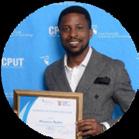
candice Livingston
Mrs raché hanekom
nalisha singh
assoc Prof oluwaseun oyekola Lise Botha
dr Bronwyn swartz
r yan Matthews
Teaching and Learning report
1.1 institutional and Faculty awards for Teaching excellence

Dr Zaid Waghid, the 2018 recipient of the Faculty of education Teaching excellence award and institutional Teaching excellence award, received the national heLTasa Teaching excellence award at their recent 2019 conference.
Institutional awards
Mr joe john, the FeBe ecP coordinator and a chemical engineering lecturer, was awarded one of 3 cPUT institutional Teaching excellence awards, and thus qualified to apply for the national Teaching excellence awards hosted by heLTasa.
FacULTY oF edUcaTion
The Faculty award went to dr candice Livingston in the Faculty of education. dr Livingstone received the award at the institutional Teaching excellence awards ceremony on 5 december.
FacULTY oF heaLTh and WeLLness
The five departmental winners are: dr Lisa graham, (Biomedical sciences) dr Kathleen grant (Biomedical sciences), nkosikho sogwagwa (Biomedical sciences), Llizane Mcdonald (eMs) and Valdiela daries (Medical imaging and Therapeutic sciences).
This year the Faculty also introduced a number of new categories. The winners in these categories are:
outstanding Workplace Learning engagement Initiative: john Meyer (eMs) service Learning – saaiga ismail (MiTs) Language initiatives – dr Lisa graham (Biomedical sciences).
outstanding research Awardees: Prof Peter clarke-Farr (ophthalmic sciences), dr hilda Vember (nursing) and dr glenda davison (Biomedical sciences)
outstanding teaching with technology initiative: dr Lisa graham (Biomedical sciences).
outstanding First-Year experience and orientation initiative: Wendy solomon (Biomedical sciences)
outstanding curriculum development: Marlene Bezuidenhout (dental sciences)
The dean of the Faculty, Prof Penelope engel-hills, said celebrating success in the workplace was important and thanked
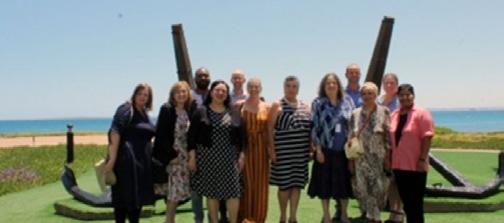
Some of the winners in the different categories in the Faculty of Health and Wellness with Acting Dean of the Faculty, Prof Penelope Engel-Hills
FacULTY oF engineering and BUiLT enVironMenT
Faculty and Departmental teaching excellence Awards 2019
The following FeBe staff members won awards during the annual Teaching excellence awards that celebrate T&L.
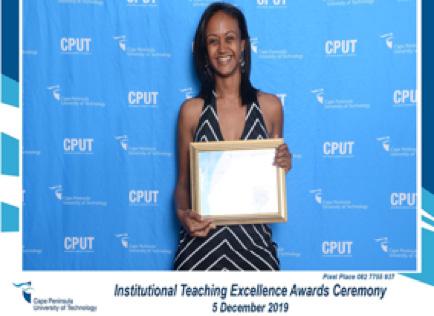


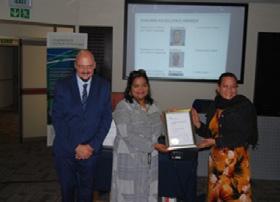
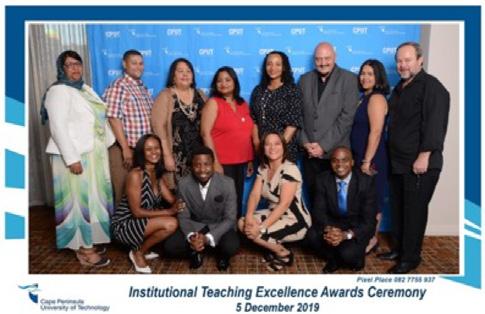
on the 5th of december 2019, two academics were duly recognised for their contribution to teaching and learning. Mrs raché hanekom from the department of Biotechnology and consumer science and Mr andrew rand from the department of environmental and occupational studies were honoured with departmental and Faculty Teaching and Learning excellence awards, respectively.
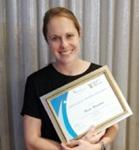
Mrs raché Hanekom of the department of Biotechnology and consumer science with her certificate of Teaching excellence 2019
Dr. Mncedisi Dewa (from Industrial and Systems Engineering) with his wife, at the Teaching Excellence Award Ceremony
Assoc. Prof. Oluwaseun Oyekola from Chemical Engineering: Faculty Excellence Award
Dr Sweta Patnaik from Clothing and Textile Technology Departmental Award
1.2 Throughput rates at the University
Throughput rates reflect the efficiency of teaching and learning at an educational institution. efficiency is measured per cohort of students admitted to the University in a specific year. The statistics below reflect the throughput rate in 2015 and 2016 at cPUT. The numbers reflect the students who managed to complete their qualifications in minimum time, indicated as “graduates in Min time”. however, not all students manage to complete within the prescribed time period and some take an extra year (“graduates in Min + 1”) or an additional two years (“ graduates in min + 2”). in this teaching and Learning report, covering 2019, the throughput rate of 2015 and 2016 is included.
cPUT is currently phasing in a new suite of qualifications, all aligned to the higher education Qualification sub-Framework (heQsF) as stipulated on the 10 level national Qualifications Framework (nQF).
a) All qualifications: The overall throughput rate for all students in the 2015 and 2016 cohorts is as follows:
b) National Diploma: The national diploma is a three-year qualification if completed fulltime in minimum time. in the table below 808 students took an extra year to complete the nd and an additional 249 need an extra two years to complete
e) Baccaluareus technologiae degree: The BTech is a one year programme if done full time.
f) Bachelor degree (480 – NQF 8) is a full-time programme over four years.
1.3 historical Premise of the hod Forum
in response to recommendations 5 and 6 of the higher education’s Quality council (heQc’s) institutional audit report on the cape Peninsula University of Technology in 2011, the hod forum was established.
g)
i) Diploma (360 credits) is a three-year full time programme. The student numbers are low in 2015 and 2016, because the diplomas are higher education Qualification sub-framework (heQsF) aligned qualifications replacing the national diploma.
The heQc recommended that cPUT consider “broadening the roles of heads of departments (hods) beyond administrative duties and facilitate their further development of management and leadership skills in the areas of teaching and learning, research and community engagement”. The heQc also recommended that “cPUT investigate and remove the obstacles to communication between offices, structures and campuses”. The conceptualisation of the hod Forum therefore was intended to provide the space in the university for hods and management to engage constructively, and to enable the hod level of management to be fully capacitated to provide strategic leadership to their staff and students.
as reporting on the hod Forum is a new section of the Teaching and Learning report, this narrative moves from the purpose of the hod Forum as outlined above to providing an overview of its position and role within the university. it then reflects on some of the activities that were undertaken in the first part of 2019, many of which represented a culmination of projects started in earlier years. Meetings for the Forum are held quarterly and this report will focus on activities in the first two meetings, until May 2019. Thereafter, the hod Forum proceeded under the new leadership of the dVc: Teaching and Learning, Prof rishidaw Balkaran, who joined the university in February 2019, and The director: Quality Management, dr. siyanda Makaula, who joined the university in june 2019. The forum continues under their leadership.
The terms of reference of the hod Forum state that, “The hod Forum aims to promote excellence in academic leadership through the
provision of a platform for dialogue around all matters affecting the academic space”. it is important to note that this was not a decision making forum or statutory structure of cPUT. arising out of matters raised by hods, it performs an advisory role to other structures, committees, or offices of the university and, in turn, is intended to provide support to hods in performing their duties. as stated in the terms of reference, it serves several important functions, including:
• As a university-wide community of practice for academic hods through which they can network and share bestpractice in the leadership and management of academic departments,
• in raising issues for discussion and debate and enhancing communication between hods and other strata of university leadership.
• In serving as a platform to facilitate and execute the development and enhancement of the wide range of skills, knowledge and competencies needed by hods in order to effectively discharge their responsibilities.
central to everything in this forum are the hods and the desire to ensure the best possible quality experience for students. The forum plays a significant role in raising the matters, both internal and external to the university, necessary for this to happen.
The hod Forum is chaired by the dVc: Teaching and Learning and facilitated by the director: Quality Management. during the course of 2019, the people in both these vital functions changed. The forum said goodbye to Prof anthony staak and Ms. Luclaire airey and welcomed Prof rishidaw Balkaran, as the dVc: Teaching and Learning and dr. siyanda Makaula as the director:
Quality Management. since assuming the leadership of the Forum, Prof Balkaran has imparted his own unique take on the role of the forum. This has been broadened to incorporate discussion on high level issues prevalent in the higher education landscape and to allow the opportunity for hods to engage with renowned practitioners on matters setting the context for higher education today. The intended focus is to move beyond cPUT and enable hods to be fully conversant with all factors influencing how they can contribute positively to their staff and students.
in welcoming Prof. Balkaran to cPUT at the beginning of 2019, the forum acknowledged the importance not only of his expertise in both industry and academia, but also in the fact that he had worked through the ranks to the position of executive dean in his prior organisation. The relevance this brings to understanding the tensions prevalent to the hods’ role and shaping the forum going forward places him in a unique positon to provide guidance to the forum. The clarity of his understanding was evident in his address to the hods at his first engagement with the forum. in addressing the hods, Prof Balkaran emphasised the need for a well-qualified workforce with a clear understanding of their students, equipped to deal with the matters arising through various social justice considerations.
as mentioned previously, the projects discussed in the forum were not only wide-ranging, they also ran through from meetings of previous years. The enduring camaraderie in the forum was evident in the February meeting where hods shared their achievements, ideas and condolences for deceased colleagues. The intention was one of promoting integration and the meetings in the first semester of 2019 reflected on some of the major issues confronting hods as well as imparting knowledge and information
on the major projects concerning the university. one such project was the heQsF alignment project.
1.3.1 HeQSF Alignment project
This ongoing project concerned the alignment of cPUT’s qualifications with the higher education Qualification sub Framework (heQsF). While the development of qualifications was run by other cPUT units, the forum provided the opportunity for integration and direct communication with hods.
The year commenced with a focus on curriculum design, the formation of the Qualification evaluations committee (Qec) initiated by Prof Balkaran and the importance of linking the new qualifications to transitional considerations. a presentation was done on highlighting the importance of reviewing the intended structure of qualifications to identify high-stakes subjects that could impede student progress (Fig.1).
the progress of qualification approval was given to the hods, thus integrating the work of institutional Planning, academic development and Quality Management with the knowledge base of hods, many of whom are not members of the associated committees. Until the full implementation of the heQsF aligned qualifications, this is likely to remain an important focus of cPUT and hods
1.3.2 Integration of HoD planning, t&L Strategy, Assessment and Quality Management
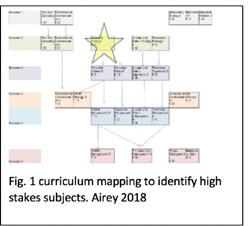
as the processes associated with the Qec matured, the deputy director institutional Planning, Ms Thembisa Khomo, took members of the hod Forum through the requirements and various associated templates, thus greatly aiding and formalising the qualification approval process within departments and faculties. regular updates on
Following through from the previous year was the embedding of planning elements into the quality management systems of academic departments. The focus through the hod Forum reiterated what was developed through the department Quality improvement Planning (dQiP) sub-system and referred hods to the importance of developing a robust Teaching and Learning strategy for their departments, that informed the academic project, especially in the implementation of the heQsF-aligned qualifications. included in this was the need to embed appropriate assessment design and practices into their respective T&L strategies and this formed a separate focus area for the Forum.
1.3.3 Assessment Considerations
assessment pedagogy formed a focus area during previous years and 2019 culminated with consideration for the examination activity itself. as the integrity of the assessment process is integral to the validity of qualifications at cPUT, the beginning of 2019 concluded the previous assessment sessions with Ms. Kuselwa Marala from the registrar’s division presenting the outcomes of internal audit findings as well as moderators’ and invigilators’ reports. This
informed the improvement actions required by hods within their departments.
The discussion on assessment throughout the meetings, was broadened and led by Mr sakkie smit, director of the centre of e-learning and innovation (cieT), to include the integrity of online assessment and e-learning generally. emerging from the discussions was the need for staff training in assessment practice particularly and the need for the continual induction of new staff on the assessment environment. at the conclusion of the hod forum in May 2019, a strong theme was emerging on e-learning assessment and the integration with 4ir and blended learning. This hub of engagement was integrated across different units in cPUT, particularly cieT and academic Planning.
1.3.4 Integration with Institutional Units and Closing of resurging DQIp Findings
as always the integration of quality management systems into the work of hods and academics featured extensively on the programme of the forum. in early 2019, engagement with hods was focussed on Programme reviews and the input of hods into the process. The role of hods as panel members and the role and responsibilities of the chairperson were discussed (Fig. 2).


Further, the integration of the ods strategy with their planning and continuous quality improvement, achieved through their dQiPs, was highlighted. in 2018, the use of dQiPs to manage the resurgence of findings that were supposed to be closed out, became a matter for attention (Fig. 3). This continued in the 2019 Forum meetings with follow-up on progress attained in closing out the re-opened indings.
Within the hod Forum, the hods had the opportunity to indicate directly to the dVc: Teaching Learning important institutional matters that were interfering with the final closure of findings.
arising from this, the second meeting in 2019 was focussed on providing a chance for hods to bring their concerns directly to the attention of the senior managers of various portfolios. This provided senior managers with the opportunity to thoroughly engage hods on the respective cTs, operations and security, and human capital strategies and the stage of progress that had been attained.
The success of this was evident in the significant drop in the resurgence of findings at the institutional level and it went a long way to developing an understanding between colleagues that alleviated some frustrations.
1.3.5 training Activities
arising directly from requests made by the forum members, a significant amount of funding was provided by the Training and development Manager Ms shaheida hendricks for training hods on the cape higher education consortium (chec) Training and development Leadership Programme. This was attended by many hods who indicated that they received benefit and enjoyment from taking part in this programme.
additional training sessions provided by cPUT to forum members have also covered aspects of labour law and the management of staff. during the latter part of 2018, the acting dean of students, adv. harper, tried to initiated a programme for the training of hods in student disciplinary matters, which continued through to 2019. however, the stance of hods was that chairing such committees created a conflict between them and their students and impacted on their core duties in various ways. hods were not in favour of the programme and it did not progress further through the forum.
1.3.6 postgraduate Considerations
an emerging area in discussion by hods in 2019 was that of postgraduate support. With the need to address the doctoral review of the che, hods raised matters concerning postgraduate students. Prof dina Burger director: research received comments on the support students from other institutions required, the process of contracts and bursaries, supervision support and the need for tracking systems. arising from this meeting a suggestion was made that hods explore what constitutes quality in a postgraduate environment. While in its early stages at this time, the matter was superseded by the che doctoral review and taken
forward by the doctoral review Team under the auspices of Prof Balkaran and dr Makaula.
1.3.4 tutor programme
early in 2019, considerations arose on funding of the Tutor Programme. This is recognised as an important factor in supporting students, especially those in subjects considered to be at-risk subjects and raised concern amongst hods dr Xena cupido provided oversight on the matter and engaged with hods on their concerns (Fig.4).
Through the engagement of the dVc with the Fundani representatives, many of the difficulties experienced in 2019 seemed to have been alleviated. While various channels were used for this engagement, the hod Forum provided the direct link to the dVc: Teaching and Learning for their concerns to be heard.

1.3.4
Sharing and the HoD Community of practice
always appreciated by members of the hod forum was the opportunity to share practice and talk about their successes and those of their staff and students. The year was initiated with a
creative presentation from the dean of informatics and design, Prof johannes cronje, which demonstrated new and innovative teaching practice using the theme of assessment to reinforce some principles of innovative assessment. discussion ensued on authenticity versus validity in a test, working under pressure, and about fidelity of assessment. This resonated well with the simulator assessment done in the sports and recreation Management
programme and the cognitive and metacognitive training done by emergency Medical sciences in high stakes situations. This presentation by Prof. cronje provided useful knowledge as well as demonstrated an innovative and enjoyable from of online assessment and multiple choice construction.
hods had the opportunity to do short presentations about their projects and innovations. in May 2019, hods spoke about:
• The prestigious EUHOFA congress, which will be hosted by the cape Town hotel school in 2022
• The study abroad partnership between Cape Town Hotel school and Texas Tech University (Usa)
• The Hosco specialised recruitment programme
• A student competition project initiated by the Clothing and Textile Technology department, as well as an affordable smart diabetic footwear project that has been initiated
• The Life Sciences project and innovative RPL practices initiated by The department of emergency Medical care.
1.3.4 V ision 2030 and
Conclusion
The overarching matter that concerned the hod Forum in 2019 was the conceptualisation and development of the new strategic plan for cPUT, namely vision 2030. These discussions, introduced
Teaching and Learning report
in the first meeting of 2019, were ably led by Prof renee Pellisier and Prof Balkaran, and took the hods through conceptualising the Fourth industrial revolution, and sMarT universities. The forum then took a break in the second semester of 2019 to accommodate changing management. The Vision 2030 discussion was continued in the first semester of 2020 and formed a major focus of the newly reconvened hod Forum. Under the auspices of Prof Balkaran and dr. Makaula these important discussions will inform the strategic planning for hods in 2020, thereby renewing the quality management cycle for departments.
as one looks at the faces of the Forum members many changes are evident as hods come and go. Following on from the new revolving hod policy, the filling of acting hod positions, resignations and retirements, new members now form the majority of the Forum. Thanks are conveyed to all hods for their unwavering support of the hod Forum. The baton was passed to the new members of management in june 2019 and judging from the current activities in 2020 Forum members can anticipate an inspiring journey forward.
Teaching and Learning
de V e L o P M e n Ta L ini T i aT i V e s

2.1 s t udent feedback on Teaching and c o urses ( s F T c )
2 .2 c a mpus life and activities outside the classroom
The SFTC report addresses the activities generated to train lecturers to create online student feedback surveys at CPUT:
• The benefits of online student feedback
• Student Feedback Survey Workshops focusing on ‘subjects at risks’, in the Faculty of Business Management Sciences
• Supporting lecturers in the Faculty of Engineering and the Built Environment to create surveys in response to the need of ECSA
• The number of SFTC survey reports generated in 2019.
• Student learning/Student feedback symposium held on the 2 October 2019
• IZIMVO: An online web-based feedback application
• Collaboration with the Association of African Universities (AAU)

Student Feedback Survey Workshops
Teaching and Learning report

The student feedback process played an important role in the subject review process. Workshops were held in the Faculty of Business Management sciences (FBMs) which enabled lecturers to design online surveys for their specific subjects that were deemed to be at risk. Lecturers were given a question data bank from which they were able to choose the relevant questions for their survey. The Faculty of Dr Najwa Norodien Fataar
engineering requested several workshops for their academic staff members and workshops were held with the chemical engineering, Mechanical engineering departments, the latter including the Mechatronics offering.
Number of SFtC reports generated
The student Feedback office collected the surveys online and analysed the data. The lecturers, in turn, received a student feedback report and were requested to close the feedback loop by providing students with the overall results. a total of 85 subjects were surveyed and feedback reports were given to the lecturers.concerning their teaching approaches.
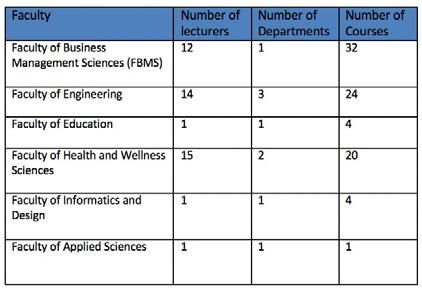
Table showing the number of lecturers, number of departments and number of courses participating in student feedback surveys.
another significant event for the student Feedback project was the student Learning/student Feedback symposium held on 2 october 2019. Lecturers and senior students such as tutors and Teaching assistants were invited to present their teaching and learning practices. as the coordinator of the student Feedback project, i gave a presentation on our new initiative which is an online student feedback tool designed in consultation with the information Technology (iT) staff of cPUT called iZiMVo.
iZiMVo was developed to ensure that we have an internal cPUT tool to elicit feedback from students. iZiMVo addresses the need for lecturers to have online access to a student feedback question databank, customisable surveys and questionnaires. The reports generated using this tool will be instantaneous. a dashboard will be made available to lecturers and heads of departments to have quick access to student feedback on teaching and courses. currently, external feedback applications are being used, such as google Forms and survey Monkey. The challenge here is that the intellectual property resides with the creator of the survey and not with cPUT. The application provides analytics via sentiment analysis on both quantitative and qualitative responses. The application would belong to cPUT and the data would reside with the university. it allows for a comparative analysis of various questions/answers and periods (2018 compared to 2019). The artificial intelligence feature of the application enables far more efficient analysis and reporting.
izimvo provides lecturers with an opportunity to include the student voice in the development and improvement of the curriculum and it can be used as a student engagement tool. The feedback mechanism allows lecturers to engage with students in a reflective manner. The results of the feedback would also be useful in the subject review process. izimvo also has broad applicability within higher education as a feedback tool as well as for the development of research instruments, institutional climate surveys, market market-related feedback, i.e. open days, orientation and roadshows.
Teaching and Learning report
Furthermore, the student feedback application creates an opportunity for faculties/departments and academic staff to delve more deeply into issues related to teaching and learning. This could very well support the subject review mechanism by enabling academic staff to work in collaboration with students to develope universal and targeted interventions.
Collaboration with the Association of African Universities (AAU)
i attended the association of african Universities (aaU) in egypt, cairo from 11-15 november 2019. The theme of the symposium was “Towards a peaceful and secure africa through quality higher education”. The symposium featured africa and the sustainable development goals, specifically the aim of peace and security on the continent. i listened to many excellent speeches from senior religious leaders, academics, the deputy Minister of higher education and a senior person from the military. i gave presentations on student feedback and evaluations. i observed classes and had meetings with university executives and academics. i was able to spend time exchanging views on african university collaboration and higher education and development on the continent. i participated in the symposium in the main hall and spoke aboutthe need to provide students with support systems to flourish in their university studies. This collaboration will strengthen our link with other countries in africa.
on Thursday 14 november i participated in the africa Universities day at al-azhar University conference centre, nasr city. This important event was attended by esteemed guests from the egyptian government, military and senior members of the al-azhar University. The event featured displays by students from many african countries who gave the audience insight into their culture, history, food, and education systems.
The association of african Universities (aaU) is the apex organisation and forum for consultation, exchange of information and co-operation among
institutions of higher education in africa. aaU represents the voice of higher education in africa and supports networking by african institutions of higher education. The aaU is based in accra and has a current membership of over 360 higher education institutions (heis).

Picture of the Association of African Universities (AAU) banner, at Al Azhar University
2.2 campus life and activities outside the classroom
sport and culture development Programmes for 2019
The sport and culture department is part of the student affairs division as an official entity responsible for regulating, organising and coordinating student sport and cultural activities within the institution. sport and culture plays a significant role in the holistic development of students as it embodies essential aspects in student life that encourage friendship, fair play and co-operation among students. The department continues to maximize student participation in sporting and cultural practices in harmony with and complementary to the academic character and values of the institution. all sporting and cultural programmes in 2019 were structured in such a way as to facilitate and improve opportunities for students to acquire the necessary life skills.
sport and culture student development achievements Project
CoNteMporAry DANCe DeVeLopMeNt CLASSeS
eighty five students took part in recreational movement classes offered to all students. The project increased students’ interest in physical activity by providing a creative platform through movement that ultimately promoted a healthy lifestyle. it provided an opportunity for creative students to showcase their talent and be acknowledged by student audience. as part of the prizes, the top three were provided an opportunity to be interviewed on a programme called ‘a walk with Mel’ where the poets could present their talents on a national platform. This event created a space where students could prepare themselves for their final exams in a spiritual environment. students also had an opportunity to engage with a motivational speaker. The project advanced student centeredness and a positive student community.
SLAM poetry CoMpetItIoN
a creative competitive platform was attended by twenty-seven students. it was an awesome platform for entertainment, competition and student engagement.
CHoIr/ACApeLLA WorkSHop
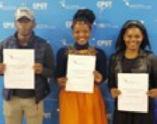
Thirty five students participated in a choir development workshop. The project has given birth to a structured choir development within our institution.
perForMINg ArtS FLASH perForMANCeS
Flash performances are impromptu performances with short programmes of music, skits and dance performed for about thirty minutes. campus performances were held on 25 February; 11 and 23 april; 26 july and 12 and 23 august 2019. it created vibrancy and visibility of arts programmes on campus and allowed students to perform for their peers. it also provided opportunities for arts students who were not selected for national programmes to perform in front of an audience. it was used as a recruitment tool for the arts society, as it created vibrancy and visibility of arts programmes on campus and allowed students to perform for their peers.
grAHAMStoWN FeStIVAL

a play was performed by the cPUT arts society at the grahamstown national arts Festival on 29 june 02 july 2020. The stage provided drama students with an opportunity to participate in a professional environment and allowed them to have their creativity and ability tested within the professional arts industry.
Teaching and Learning report 2019
Book CLUB FUNDA MZANtSI CoMpetItIoN
an annual book club competition was held in george on 23-27 september 2019. students during the competition had to review, analyse and debate prescribed books in any of the 11 south african languages. This encouraged the reading of work by south african authors and provided an opportunity for students to test their literacy skills. it encouraged debate and exploration of literary themes amongst students.
DeBAtINg SoCIety
The d6 debating society was launched a at each residence. This programme has been extended to 2020. debates were held at eWr and cape suites residences on 2 and 16 august 2019. The programme developed critical thinking, analysis and public speaking amongst students and facilitated an integrated programme with residences. The involvement of alumni in the programme stimulated a lot of interest and encouraged students to be coached by their peers.
CHoIr
The cPUT choir performed the anthem at all rugby home matches and semi-finals of the Varsity shield, the Vc’s installation, the autumn graduation and the bursary handover ceremony. catsville residence hosted a woman’s month concert and the cPUT choir performed with other residence choirs on 21 February, 11 and 25 March, 4 – 12 april and 24 august 2019. The Varsity shield performances gave the choir an opportunity to be part of big university events. The Mcd events also gave the choir an opportunity to perform for cPUT management and broader audiences. This gave the choir marketing opportunities and visibility which encouraged other students to participate.
WeLLNeSS DAy IN tHe pIAZZA
The project was held on 22 july 2019 in partnership with other departments that included student counselling, the clinic and disability Unit. about 6590 students participated in this project. The event promoted active and
healthy lifestyles amongst students congruent with the notion of “a healthy mind in a healthy body”. it forged mass participation in sport and recreation amongst students in the interests of reducing possible illnesses such as diabetes, stress, trauma, and many others that place a financial burden on the institution. it also established a broad participation base for the growth of sport and recreation at cPUT which could lead to a proper sport development continuum. The event promoted active lifestyle and fitness amongst students, facilitated vibrancy within the cPUT community and stimulated an interest in cPUT sport.
SeLF-DeFeNCe CLASS/DeMoNStrAtIoN
The project was about teaching self-defence skills to approximately eighty students, mainly women, on 30 september 2019 in partnership with student development. it empowered students particularly women with requisite techniques to manage prevailing gender based violence in our communities. cPUT students were occupied with positive social events that brought about balance between academic and social environments, which in effect will prevent them from engaging in any anti-social behaviour.
IZIMBokoDo WoMeN’S toUrNAMeNt

The tournament was specifically designed for female students in commemorating Women’s day. it was eld on 22 august 2019 at Wellington campus, for the following sport codes: rugby, table tennis, netball and football. The project aimed to build character in students by providing them with opportunities to learn teamwork, self-sacrifice, discipline, and to overcome adversity whilst learning qualities of personal responsibility. it played a vital role in the reduction of teenage pregnancy, violence, alcohol or drug abuse and many other unwarranted activities linked to delinquent
behaviour. it also distracted students from antisocial behaviour through constructive engagement in activities that added meaningful value in reducing stress, anxiety, boredom, etc.
BreAkINg BArrIerS WorkSHop

This workshop provided capacity building training to address diversity and transformation and to promote unity, held on 14 august 2019 for about one hundred students. The workshop created an environment well suited to the purpose of education and social integration and contributed to the promotion of physical and mental health, as well as improvement of social skills. it aided the educational process by stimulating the best qualities of students and enhanced their capacity for work in preparation for the future. it empowered students to coexist with other people and live in harmony with students and staff from diverse backgrounds.
LeArN to SWIM progrAMMe
a programme organised for all students including those who are studying emergency Medical services (eMs), started from 1 august 2019 for about thirty students. This supported students studying emergency Medical services to fulfil their swimming practical course requirements. it promoted a comprehensive understanding of aquatic safety measures and the astute usage of water resources by students to the extent that all eMs students who participated in the programme passed their departmental practical component, reducing the possibility of drowning by our students within our institution and during national and international tours.
rUgBy CoACHINg CoUrSeS
Twelve students participated in various courses offered by Western Province rugby Union. The following are the courses offered and attended:
• WR Level 1 15 (1 November)
• WR Level 2 15 (8 9 November)
• WR Level 2 – 7 (15 16 November)
• WR Level 1 – 7 (22 November)
• Level 1 Strength and Conditioning (13 November)
These courses capacitated students to qualify for officiating, and to play a central role in the administration of important rugby games in which cPUT partakes. students benefitted by developing additional skills, which include coaching, and organisational and management skills that will ultimately build a strong cPUT rugby club. These courses instilled leadership skills in students, which aided a strong management support base for cPUT rugby club, especially in areas of coaching and good corporate governance that have been learned by the students.
tALeNt IDeNtIFICAtIoN
Fifty-two students from various campuses participated in the netball Talent identification on 7 & 9 october 2019. a three-hour session was hosted on each day for female students, across all campuses. it was held at the Bellville campus indoor sports hall for the purpose of identifying skilled netball players. all students who participated in the programme benefited and developed skills, which included individualized training programmes to work on their fitness during the december 2019 vacation.
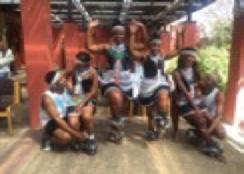
ADopt A reSIDeNCe progrAMMe
approximately eighty to one hundred students attended the sessions held at the residences. Training workshops to five targeted residences took place that included:
• Cattsville
• St Peters
• MGR1
• MGR2
• New Residence
This was an initiative by the dean of students, and was intended to campaign for the creation of a conducive environment that is aimed at minimising or addressing adversity that students are facing on a daily basis in their space, through awareness and constructive use of their energy.
INterVArSIty toUrNAMeNt






Teaching and Learning report 2019
between the two institutions is more about cultural and sporting exchange programmes. a total of about eight participants attended an international cultural event hosted by nUsT on the other hand, cPUT football and netball teams comprising about forty students hosted the nUsT sporting delegation at the Bellville campus.
Both programmes empowered students to develop and maintain their individual identities and learn to contribute towards community building. it is through this constructive engagement that participating students learnt to observe protocol, statutes and individual rights, as well as rights of other people. This platform again promoted networking between students and staff from the two countries, leading to a long-lasting relationship and partnership. The programme cultivated the university ethos in our students to embrace their african identity and to play a role in shaping our institution.


cPUT hosted the intervarsity tournament on 20 – 21 september 2019 on the Bellville campus where all Western cape universities participated. There was a total of approximately 180 cPUT students partaking in this provincial annual event. The event was used as a vehicle to promote social cohesion amongst students from various institutions and to rebrand the image of cPUT. it also forged unity by advancing the course of social interaction amongst cPUT students from diverse socio-economic backgrounds. This platform was utilised as a feeder for the growth, development and excellence of our competitive sports.
namibia University of science and Technology / cPUT sport & cultural department exchange Programme on the 5 – 8 august 2019
cPUT has bilateral relations with the namibian University of science and Technology (nUsT) that was initiated four years ago. The collaboration
2019 FeeDBACk report UpDAteD: sTUdenT deVeLoPMenT d6 caMPUs
teAM BUILDINg For FIrSt yeArS (February 2019)
a link to this event can be seen at ing-to-welcome-new-students/ The dean of student affairs welcomed the students on the Bellville sports fields. she invited them to form part of all dsa developmental programmes.
AMAZINg rACe (Feb 4-15)

d6 offered a variety of amazing races on campus. dsa designed the programme in such a way that students had to visit various support services
including: student counselling, the clinic, disability Unit, and student centre. here they had to find out more about all our developmental programmes and sports. about 120 students were involved.
reSeArCH MoNtH (March 2019)
The dsa did a month of research to find out how students are spending their money and if they know how to budget. dsa is concerned about nsFas payments and discussed possible interventions at three separate meetings with three separate banks. We hosted five financial literacy workshops.
4 - 6 March, d6 campus. 7 and 9 May, Bellville campus.
MeetINg WItH tHe DeAN (13 March)
an extensive meeting with the dean took place regarding programmes she wants us to focus on cooking lessons, Breaking barriers and entrepreneurship she wants us to roll this project out to our entire student population. Two dsa staff attended. alumni were to be invited to speak to students on breaking barriers.
BUILDINg A kIoSk
a kiosk is to be built in the student centre, to be completed in june.
SA INNoVAtIoN SUMMIt: eNtrepreNeUrSHIp
at the above summit we will offer:
exposure to investors, showcase innovations, meet with business partners.
The following were also undertaken:
• Road trip to Universities in July
• Innovation summit in September
• Focus on entrepreneurship
• Exposure to investors
• Showcasing of innovations
• Personal meetings with businesspeople
• Multiple competitions.
2019 FeeDBACk report UpDAteD: sTUdenT deVeLoPMenT BeLLViLLe caMPUs
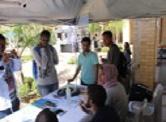
orIeNtAtIoN (29 – 31 January)
• 1st year Welcome Events
• 29 January – District Six campus
• 31 January – Bellville Campus
student affairs and student services had stalls on these days showcasing the services available to students within the institution. student structures also had the opportunity to have stalls to showcase to the first year students how they can get involved with student structure activities. This year’s Welcome event was a success, as most of the the years and their families who attended the welcoming ceremonies were able to engage and interact with the various stalls present.
orIeNtAtIoN (February)
1st year orientation Sessions
Brief presentations at faculty orientation sessions were conducted at the Faculty of engineering, department for Medical imaging, Faculty of applied sciences and Medical Laboratory students.
LeADerSHIp AND teAM BUILDINg trAININg (22-24 February)
enactus executive Strategic planning and team Building workshop enactus is an entrepreneurial student structure that is affiliated as a developmental structure under the Bellville student development office (sdo). Their annual strategic planning session took place the weekend of 22 – 24 February at Manyano centre in Paarl. This training session was extremely fruitful as the structure could come up with new and innovative entrepreneurial concepts that are needed in society, as well as their plan of action to implement.
StUDeNt eNtrepreNeUrSHIp DeVeLopMeNt (25 Feb)
student Market day (Varsity Moola): enacTUs Bellville successfully organised and implemented their first Market day on 25 February 2019. The Market day provided a platform for student entrepreneurs to sell and showcase their services and products. The first market day was a major success and we received numerous request for stalls for the upcoming market days.
eNVIroNMeNtAL AWAreNeSS (2 March)
Beach Clean Up
student development and student housing on saturday 2 March gci joined up with the clean c organisation to support them in their monthly beach clean-up at Millerton beach. The group spent a few hours with the organisation and also learned more about recycling.
eNVIroNMeNtAL AWAreNeSS (8 March)
Water Conservation Awareness Workshop facilitated by City of Cape town training (Water and Sanitation)
student development and student housing student development has a longstanding relationship with the city of cape Town’s Water & sanitation department. We requested them to do a 2 hour training session with some of our gci members on Friday 8t March from 14:00 – 16:00. The training was extremely informative.
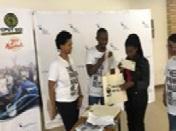
eNtrepreNeUrSHIp
DeVeLopMeNt – INNoVAtIoN, INteLLeCtUAL property AND eNtrepreNeUrSHIp (6 April)
entrepreneurship Workshop
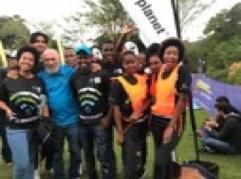
an entrepreneurship workshop was held focussing on innovation, intellectual Property and entrepreneurship from 8h30-15h30 in the auditorium at Bellville campus. Partners included nYda & innovation Barn.
eNVIroNMeNtAL AWAreNeSS (3 May)
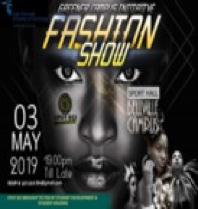
gCI Fashion Show
student development and student housing
The gci Fashion show took place on 3 May at Bellville campus in the Multipurpose sports hall. The purpose of the event was to provide university students with a unique and memorable experience which combined entertainment, fashion and environmental awareness. student participated in the fashion show by entering as designers, models, Mcs and providing entertainment. There was great talent showcased as well as grooming of skills. The event attracted about 500 cPUT students on the night.
eNVIroNMeNtAL AWAreNeSS (19 – 25 June)
eNVIroNMeNtAL AWAreNeSS (30 March)
WWF earth Hour – student volunteers student development and student housing WWF initiative – gci joined WWF at their annual earth hour event on 30 March 2019. gci students were volunteers at the event at Kirstenbosch Botanical gardens and assisted with the logistical arrangements of the earth hour event.
gCI Food gardens
student development and student housing establishing Food gardens at sacco res and Wellington residences. cleaning up Mgr2 res food garden. Placing of fridges at sacco residence to start gardens. start making pallets box gardens.

CoMMUNIty oUtreACH (26 June)
gCI Community outreach
student development and student housing
The gci team annual community outreach project started when students were leaving residence (20-25 june) for the recess period. The gci teams collected any old clothing students did not want and washed and sorted the clothing. The community outreach initiative took place on the 26th of june when they distributed the clothes, soup and bread in Bellville to the homeless.
teAM BUILDINg (28 June)
gCI team Building
student development and student housing
The gci team met for team building before the national gci conference. The team building included games and watching movies so that the teams from the various cPUT campuses would be unified before going to the national conference.
StrAtegIC pLANNINg (27 June)
gCI Second semester planning
student development and student housing
The gci team met to prepare for the national conference as well as plan for the second semester activities. Presentations preparations and rehearsals. conference preparations
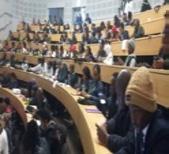
eNVIroNMeNtAL AWAreNeSS AND LeADerSHIp DeVeLopMeNt (30 June – 4 July)
gCI National Conference a green campus initiative (gci), coordinated by student development and student housing selected 30 gci ambassadors to attend the gci national conference, which took place at UWc.
The conference theme this year was around the 4th industrial revolution. The conference had many prominent guest speakers sharing thoughts around higher education, environmental awareness as well as the 4th industrial revolution. it also allowed students to share best practice, and learn from students from other heis around south africa.
AWArDS WoN
CpUt gCI was awarded the Newcomer Award our cPUT gci chairperson (BLV) Mr Xolani ntshinga was awarded the gci ambassador (Male student) of the Year award. our gci ambassadors had the opportunity to engage around key issues as well as present their work achieved through cPUT gci at the conference.
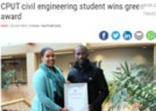

eNACtUS NAtIoNAL CoNFereNCe (8-9 July)
20 enactus cPUT team members attended the enactus national competition in sandton, johannesburg from 8-9 july 2019. enactus cPUT currently has three main projects that it has been working on: grow a seed Urban Farming, the Look out hill Project and the UniMoola Project. enactus cPUT was shortlisted as a finalist for a variety of special competitions: the harmony Local economic development challenge, Ford c3 Partnership challenge, the MTn icT challenge as well as the enactus national championship.
LeADerSHIp AND eNtrepreNeUrSHIp DeVeLopMeNt (20 July)
Master Class Workshop
The enactus cPUT leadership attended the business seminar which was mainly sponsored by capitec Bank and My growth Fund. The masterclass is an affair that is aimed at empowering and inspiring the next generation

of entrepreneurs and business leaders. They are given a safe platform whereby they can share their experiences as entrepreneurs. The host answered a series of questions that not only interested but also assisted each one present. The affair was attended by over seven hundred delegates from in and around cape Town. Technical questions from scaling a business to the value chain and clawback model were probed and deliberated on.
eNtrepreNeUrSHIp AWAreNeSS – D6 (1 August) enactus Marketing Campaign ab enactus Marketing campaign stall was set up to create awareness around entrepreneurship and how to join the student structure.
staff. The water-saving messages were also put on the cPUT Lcd TV screens therefore increasing the awareness and reach of the campaign.
eNtrepreNeUrSHIp AWAreNeSS (2 August)
enactus Marketing Campaign
enactus Marketing campaign stall – creating awareness around entrepreneurship and how to join the student structure at d6 and Wellington campuses.
eNtrepreNeUrSHIp DeVeLopMeNt (12 August)
entrepreneurship event
student development, TTo and partners Tia and BeBold

eNVIroNMeNtAL AWAreNeSS (2 August) think Water Awareness Campaign student development and student housing gci in collaboration with cocT hosted a Think Blue Water awareness campaign at the student centre Quad from 12h00-14h00. Water awareness messages were printed and laminated and put up around campus in strategic places, to create general awareness of the precious resource and encourage students and staff to conserve water. We had a pledge banner where we asked staff and students to paint their hands blue and pledge to make their difference by conserving water. Various cocT Water and sanitation department water awareness brochures were distributed to students and
The event provided students with the opportunity to pitch their innovative ideas/businesses to Tia for funding and business development support. The aim of the event was to promote student entrepreneurship development and create access to platforms for funding, thus creating an entrepreneurial culture at cPUT. The cPUT dsa has partnered with Tia and BeBold to bring these opportunities to cPUT students.The top three pitches will go through to a national workshop with other universities and compete for the main prize. a number of cPUT students and student groups presented innovative pitches, and the event was a success. We look forward to supporting the top three teams in further developing their business and innovative ideas.
HeALtH & WeLLNeSS (20 August)
Women’s Student Wellness event

student development, student counselling, campus health clinic, hiV Unit, sports, arts & culture
sToP human Trafficking, a Women’s Month Wellness event took place in the atrium, Bellville campus on 20 august 2019. Partners were invited to set
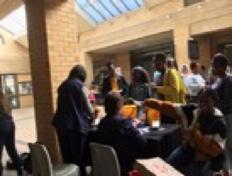
up stalls and engage with students around various health screenings and health and safety awareness information. alls included student counselling, campus health inic, hiV Unit, sports. arts & culture and sToP human Trafficking ngo. The focus was on gBV, human trafficking and general health screenings. a number of students were reached through this wellness day, and it created an opportunity for support services to engage with students. campus clinic set up a wellness stall and took various health screenings. student counselling created awareness around various Love Languages. sports, arts & culture had a step session during lunch time to encourage students to be physically active. sToP created awareness around human trafficking. student development office coordinated the entire event.
DeBAte CoMpetItIoN (22-23 August)
green Campus Initiative (gCI) Debate Competition
student development and housing
debater eddie Madikezela and Lwazi Zondo who assisted with the pretraining of the debaters and were Mcs of the debate. a total of 20 teams representing the various residences participated in the 1st annual gci debate competition from 22-23 august 2019.
WoMeN IN teCHNoLogy (30 August)

Women in tech event a Women at the Forefront of the Tech Transformation event hosted by Pinkcodrs, Kaiser cheifs, Liquid Telecom and cPUT student affairs was held on 30 august 2019. This event saw top women in the technology field as well as various companies coming to share experiences, knowledge and opportunities with 150 female cPUT students. This event also launched the cPUT Women student society, which attendees joined to to find solutions, support and share knowledge with each other at cPUT.
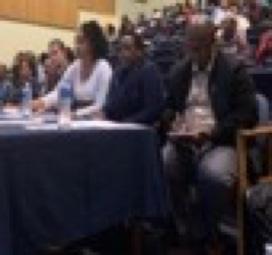
The debate started with elimination rounds on 22 august with the top teams debating in front of guest adjudicators on 23 august. The topics of debate were all centred on current environmental issues to raise awareness amongst the participants and audience members. over 400
students from the various sidences came out to support their debating teams, and the event was a huge success with Park central residence winning 1st place.
o r adjudicators included staff from ty of cape Town Water and sanitation department, stellenbosch residence department, Prof Bongani ncubi and cPUT debating society members. We also had assistance from seasoned

exAM prAyer (21 october)
Spiritual Support
student development, arts & culture & religious structures Bellville
The combined exam prayer event was held in the auditorium Bellville campus, on 21 october 2019. religious student structures were invited to collaborate and contribute towards bringing students together and wishing them well prior to the final assessments. The exam prayer was coordinated through student development and the arts and culture offices. a number of religious structures participated in the interfaith exam prayer where each structure fulfilled a role in the event. There were over 450 students in attendance at
Teaching and Learning report
the exam prayer, and they were motivated by Mr Lungisani nkomo, the hr manager at artscape who provided a motivational speech to our students.

StreSS BUSter eVeNt (26
october)
PlanetUni (a religious student structure) and the student development office collaborated on a stress Buster event on 26 october 2019. The aim of the event was to allow students the opportunity to relieve stress and anxiety build-up in the time of final exams. This assisted with developing different coping mechanisms for students and to allow them to reach for support should they need any.
students were encouraged to participate in the various stress relieving activities, which included a jumping castle, dancing, 30 seconds and other activities at the Bellville Pool clubhouse. The activities lasted for 2 hours, which was just enough time for students to take a break and then go back to studying. students were provided a light meal when they left. students enjoyed these activities and participated well with each other.
HIV/AIDS UNIt ACtIVItIeS For 2019
INtroDUCtIoN
The hiV/aids Unit is part of the student affairs division (sda) and its important goal is to build sustainable capacity and leadership in cPUT students for the long-term reduction of the impact of hiV/aids and other social justice issues in south africa. collaborative work with dheT higher health and other cPUT departments played an important role in the implementation of activities to improve the holistic health, wellness and development of students across cPUT campuses and residences.
highlights of our work in 2019 focused strongly on breaking the silence and
addressing gender-based violence (gBV) across campuses and residences. in the backdrop of the Position statement on the institutional response to gBV, Men’s Forum pledge and amajita’s Men’s Program launched in 2018, this campaign took various shapes, from silent protest to the gBV dialogue of students in leadership.
Peer-to-peer learning remains an essential part of raising awareness on hiVrelated topics for students through the peer education programme at cPUT.
Through social mobilization of students, awareness of amajitas and Young Women empowerment Programs, peer educators planned and conducted preventative and awareness activities reaching students in campuses and residences. This acted as a springboard for building holistic personal and leadership development of students, including presentation and facilitation skills development among peer educators. our continuous partnerships with external partners assisted us in offering free health screening services to our students and staff across campuses and residences. some of our work has been shared through research during the 9th south african aids conference in durban. a film shoot was conducted by special assignment on services offered by cPUT campus health and hiV, and aids Unit.
it can be concluded that the year 2019 posed itself with a very strong focus on gBV awareness across our campuses. The majority of the activities were successfully conducted and raised awareness on gBV through the collaborative approach.
HIV/AIDS UNIt ACHIeVeMeNtS
purple ribbon gender-Based Violence (gBV) Campaign
For the first time in history, all cPUT campuses participated in a Purple ribbon campaign where over 400 trees were wrapped with purple ribbons, symbolic to the fight against gBV. The project raised awareness

of the plight of gBV in our country and on our campuses. students and staff got to know the symbolic meaning of purple. Purple-coloured posters were seen across all our campuses encouraging students and staff to report all forms of gBV The campaign encouraged students and staff to speak out against behavioural issues that perpetuates gBV.
Silent protest against gBV
The silent Protest against gBV took place across all campuses and was used as a platform to build-up towards the student Leadership dialogue on gBV. a total of 34,400 student and staff participated. The silent Protests happened at exactly the same time and same day across the four main campuses. smaller campuses also participated. The silent Protest showed proactiveness of cPUT against gBV. The silent Protest encouraged survivors of gBV to speak out and report incidents.
gender-based Violence Dialogue
one hundred and six student leaders from the src, peer educators, peer helpers, class representatives, house committee members, rsas and those from political and religious structures from our own and neighbouring institutions (UWc and Boland college) participated in a dialogue. academics and student support staff from cPUT, Boland college, UWc and a gBV survivor from the saartjie Baartman centre also participated in the dialogue. The dialogue created a platform where student leadership can dialogue on the social constructs of gender based violence on campus and residences. The launch of a roadmap on how student leaders can contribute towards the reduction of gender based violence on campus and in residences took place during the dialogue. Through the dialogue, student leaders made recommendations on the role of student leadership in preventing gBV.
Key recommendations:
• CPUT central SRC should create a gender portfolio. Address GBV in the src elections through T-shirts and hashtags messaging.
• More female representation in student leadership structures in leading roles.
• Training on GBV
• Support survivors and discourage cases from being dropped due to harassment and pressure
• Tweet and retweet GBV-related conversations, pushing the hashtag #WesaynoTogBV
Social Mobilisation through peer education programme
Through social mobilization of students, awareness of amajitas and Young Women empowerment Programmes and small discussion groups, peer educators planned and conducted hiV related preventative and awareness activities reaching 73360 students on campuses and residences. Through Media, 39 489 were reached with information promoting healthy behaviours including awareness messages and advertising of services.Peer-peer learning was initiated among students across campuses and residences. Topics focused on hiV/aids, gender diversity, gender-based violence, mental health and risk reduction strategies. students were able to approach the hiV/aids Unit for confidential discussion about their personal health-related concerns. awareness about hiV/aids Unit services including others within sda were raised. awareness including prevention measures on hiV and other healthrelated issues were raised among students across campus and residences. Personal and leadership development of students were enhanced through peer-peer learning. Presentation and facilitation skills were developed among peer educators.

young Women empowerment
a two day conference was hosted by cPUT and reached young women from cPUT, UWc and Boland college. awareness around sexual and reproductive
Teaching and Learning report
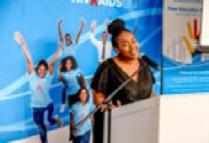
health education was raised. education on entrepreneurship was provided. Leadership and personal development of young women were enhanced. Young women were empowered with entrepreneurship knowledge and skills.
Health Screening through partnerships with external partners
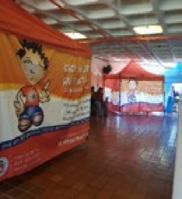
accepted and were presented by Melanie Marais and naythan Kayser.
poster: hiV curriculum integration in office Management Technology and information Technology Management.
poster: innovative Methods of addressing hiV infection amongst Young Women in higher education in the Western cape.
oral presentation: gender-based Violence conference Findings from the Perspective of Young Women in higher education within the Western cape.
oral and poster presentations highlighted the work conducted within the hiV and Unit during the national conference. Work conducted and led by students through our programmes was showcased beyond cPUT premises.

our continuous partnerships with external partners assisted us in offering free health screening services to our students and staff across campuses and residences. a total of 5 804 students voluntarily tested for hiV. We worked together with external partners, namely, TB hiV care, Partners in sexual health, Kethimpilo; anoVa, Marie stopes reproductive healthcare services, sonke gender justice, norsa and health4Men to offer services e.g. hiV counselling and Testing (hcT), sexual and reproductive health workshops took place during the day on campuses and in the evenings in residences. student and staff across campuses and residences benefited from free screening services including hcT.

Sharing of HIV/AIDS Unit work through research
me of our work was shared through research (2 posters, 1 oral presentations) during the 9th south rican aids conference in durban. stracts were submitted and
Sharing of HIV/AIDS Unit work through media platform
a film shoot was conducted by special assignment on services offered by cPUT. The shoot was on the challenges of Pre-exposure prophylaxis (PreP) at higher education institutions. PreP is an antiretroviral drug taken daily as a prevention option for hiV negative people to reduce their risk of becoming infected with hiV. When used consistently and as prescribed, it has been shown to reduce the risk of hiV infection by more than 90% among those at high risk for hiV infection. awareness of the services offered by campus health and the hiV/aids unit was raised. student and staff were educated about the use of PreP as a preventative measure for hiV/aids.
2019 peer educators Award Ceremony

a Peer educators award ceremony was hosted to reward peer educators for their outstanding voluntary work during 2019. The award ceremony also served as a platform of promoting healthy competition between the different

campuses. alumni peer educators shared their personal successes post-graduation and the impact this program had on their careers to motivate 2019 peer educators. The experience of 2019 peer educators was evaluated through an experiential survey. Five peer educators were awarded with a monetary prize. There was increased interest in the peer education program (doubled compared to the previous year). recommendations from the survey of the peer educators were integrated to improve the services.
Conclusion of Highlights
Key activities were conducted successfully and raised awareness on gBV through a collaborative approach. Major highlights for year 2019 were the following:
• Collaborative work of Student Leaders during GBV dialogue
• Gender-based violence silent protest across all campuses
• Young Women Empowerment Conference
• Discussion groups conducted by peer educators among students across campuses and residences
Short indication of the way forward
our future plans are to ensure that responses to hiV/aids, gBV and other related issues form part of a more encompassing holistic health and wellness strategy and approach that serves the entire university community including development of students. The upcoming planned key activities include the following:
• Training a new cohort of peer educators to serve in 2020
• Continuation of peer-peer learning through peer education program on holistic health promotion and other social justice issues
• Continuation of GBV dialogues rotationally across all campuses on a monthly basis
• Strengthening the Amajitas Programme to develop responsible men who will play an active role in preventing gBV
• Continuation of health screening of students and staff with assistance from external partners
StUDeNt LIFe & reSIDeNtIAL SerVICeS
2019 FeedBacK rePor T
tUtorINg
AND MeNtorINg
Various residences had tutoring and mentoring sessions at their respective residences. anglo is one residence that can be highlighted, as one of their tutors won an international prize.
elizabeth nteka, an Meng: Mechanical student, attended an international conference where she scooped the Best research Paper and Best Presentation accolades at the international conference on new energy and Future energy systems (neFes 2019). nambua nteka was awarded a free entry to next year’s ne conference in Xi’an, china, as a guest speaker.

a good example of student-centeredness is that elizabeth is sharing her knowledge with her peers at anglo residence where she resides, and assists any other students who need assistance at other residences as well.
WoMeN eMpoWerMeNt
Looking at the current pandemic with gender-based violence against women and children, de Beers residence saw the need to have a talk which empowers female students in the residence and the greater cPUT community. This was a spiritual, mind- and body-nourishing event that included financial literacy. gBV was discussed in a safe space where female students felt free to talk and share their thoughts on this very prominent issue. it was a very informative and good information sharing event. This event was presented by a former student of de Beers, Ms ovayo Mgobo.
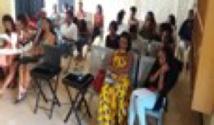
oUtreACH eVeNt
alumni can be used in various ways to give back to the cPUT community. alumni, especially residence students, are usually more than willing to assist wherever they can, as they always feel part of the residence family.
Teaching and Learning report 2019
a regular basis against each other. The enthusiasm of the off-campus debating teams gave birth to on-campus debating teams. This is a great way of keeping great minds active.
expLorINg CApe toWN
Most of our student population are from other provinces and it is important that they are familiarized with their surroundings. This event was a combined event to save costs, and at the same time take as many students as possible to explore cape Town. The main reason was to explore and show students their “new city” and for them to meet each other and build meaningful friendships, hoping that from these friendships formed, study groups and tutoring may be strengthened across residences. Physical activities usually add meaningful value in reducing stress, anxiety and boredom. students need to be developed holistically and physical wellness leads to academic excellence.

DgH and Heroes House combined their outreach programmes in order to make a greater impact residence coordinators combined their outreach programmes in order to make a greater impact on the needy. apart from giving, the students and staff played games with the young adults at the home to make them feel that they were part of one great family. The reason for combining these events was that student of different residences could interact, as students on and off campus hardly socialize. campus residences launched debating team at each off-campus residence. The debating programme developed critical thinking and public speaking, as different residences competed on
FItNeSS DrIVe

Anglo residence started a fitness drive programme. Physical wellness and mental health go hand in hand. Being fit and physically healthy has a huge impact on human development. The anglo residence coordinator, being a health fanatic herself, succeeded in getting her students to be active. student-centeredness is key, as she accompanied the students in all physical activities.

MeNtAL HeALtH progrAMMe
residence Life and residential Services invited Cape Mental health to talk about anxiety and stress, as students are dealing with stress and anxiety issues. cape Mental health was invited by the central office addressed the students on issues of mental health and how to deal with it. The programme was very informative and students felt free to ask questions relating to anxiety and stress. The event was well attended and students engaged the presenters all the time. students confirmed that this was a much needed event and that they benefited greatly by attending the event.
INter reSIDeNCe SoCCer toUrNAMeNt
The inter residence tournament is a yearly event that takes place over the easter holiday. This event is aimed to keep students busy during the short holiday at the end of the first quarter. it also gives students the platform to interact with students from other residences across campuses. The event assisted with team building and comeradery. The winner of the tournament for 2019 was Mgr


rSA progrAMMe
rsas are resident student assistants who assist residence coordinators at residences. These students play a leadership role in the residences and undergo training in order to execute their work with the necessary leadership skills at residences. rsa’s play a vital role at residences and leadership and management skills are instilled in them.
FIrSt yeAr experIeNCe AND opeN MIC
it is of utmost importance that first years are introduced to residence life:
• Getting to know resdence staff and RSAs.
• Being informed about the residence rules and house rules
• Being told what services are available, e.g. counselling, tutoring, etc.
• A question and answer session
• Ending gatherings with an open mic session

• Giving students the opportunity to showcase their talent and get to know each other.
• Ensuring that first years feel part of the residence family.
SoCIAL INVoLVeMeNt
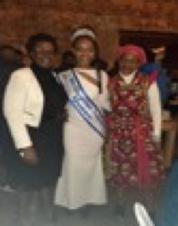
Two cPUT residence students were crowned Mr and Ms cape Town respectively. Third-year students, asavela Tshaka (Food science and Technology) and apiwe Zokufa (Mathematical sciences) clinched the Ms and Mr city of cape Town titles respectively during a pageant held at the civic centre. students entered beauty pageants and held the name of cPUT high. students should be well-rounded, and by engaging in social activities such as beauty pageants, it adds to their being well-rounded individuals. Both of them are third-year students which is evidence of students who are progressing academically. entering these competitions is evidence that our students are not just concentrating on their academic life, but are participating in social events as well. We encourage holistic development. at the end of the year function for residence students, Ms city of cape Town made a speech encouraging other students to do well academically, while being socially responsible.
DepArtMeNt oF StUDeNt CoUNSeLLINg
ProjecTs and PrograMMes
For 2019
The department of student counselling through its core services and programmes focussed strongly on wellness and mental health advocacy. in addition to individual psychotherapy and support, career counselling and assessments, various psychosocial activities were facilitated. These where aimed at holistic student wellness and development, including a strong focus on mental health empowerment, gender-based violence awareness, and safety and security awareness of students through multiple presentations, workshops, dialogues and exhibitions. in addition to this, the department’s training and development engagements, and peer mentor, peer educator, and src training, along with the rollout of the graduate exit Programme, proved to be a highlight for the department in 2019.
Core eNgAgeMeNtS 2019
Individual Counselling and therapy
• Facilitating holistic wellness and student success through ongoing counselling support and therapy.
• Counselling and crisis support provided to students, to facilitate healthy adjustment, development and mental health wellness within higher education.
• Psychotherapy and treatment of clinical and psychiatric cases, including referral for medication and multi-disciplinary team treatment.
• Two support groups were promoted during 2019, a Men’s Group and First Year adjustment group.
Teaching and Learning report 2019

student development and healthy adjustment were facilitated to enhance academic success and psycho-social functioning.
Student Welfare Support
healthy living strategies and manage relational challenges.
counselling and support to assist students with accommodation, financial constraints, food security and general health and wellness challenges.
social workers assess and assist needy students.
• Food parcels (left over stock from 2018) were distributed from the end of February to april, but were not enough to satisfy the demand. distribution was monitored by sc social workers.
• Ten needy students per campus were assisted for the first term.

• No external funding was received for 2019 to sustain this service. Only as from august could we assist needy students with food vouchers supplied by the deans’ office.
student welfare and healthy adjustment was facilitated to enhance academic success and psychosocial functioning.
Career Counselling and Career Development
• Providing career counselling and psychometric assessments to facilitate healthy career development in prospective students and students.
• Career Development and assessments
• Career counselling and assessments are provided to registered students (free or charge) and to prospective students (at a fee).
Multiple career information sessions are facilitated during the application and admission periods to assist prospective students with entry into higher education.
Career talks
• Career talks were facilitated with learners from Vredendal High school and college of cape Town, at open day events.
• Career and course choice sessions after Career Open Day were provided for prospective students from grade 12 and 11.
• Prospective students and students were supported with their career identification and course choices, to aid healthy integration into higher education.
Work preparedness graduate exit program (gep) in order to prepare graduate cPUT students to enter the world of work, an online work preparedness programme was developed and piloted in 2019.
The graduate exit Programme igeP) pilot was launched on 1 november 2019. The programme was available to final year students for six weeks, 1 nov 2019 – 13 dec 2019.
• During the six weeks, 466 students completed the programme and were issued with an official letter of completion from student counselling (sc).
• The GEP focusses on the development of leadership, communication, professionalism and workplace ethics, critical thinking and decision making, emotional intelligence, conflict management and navigating relationships.
• Due to the success of the pilot we anticipate having a significantly higher number of students who will complete the geP in 2020.
• Graduates are empowered and equipped with professional and psycho-social skills to integrate into the workplace successfully.
see link for overview: https://youtu.be/YnqxhW5onmi
Work preparedness: Work

Integrated Learning Workshops (WIL)
WiL workshops were facilitated for 2nd and 3rd year students preparing to enter experiential learning placements. Facultybased WiL Work Preparedness modules were facilitated between March and june, before entry to the workplace.
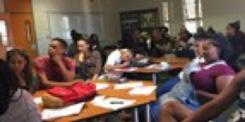
• Approximately 40 workshops were requested.
• Themes covered include preparing for the interview process, navigating interviews, building positive workplace relationships, leadership skills, time management and managing workplace conflict, amongst others.
students were prepared for the interview process and could increase their chances of successful job placement.
training and Development: Leadership and Skills Facilitation
Workshops were presented for students with the aim of developing leadership and relational skills. Workshops were also faclitated for student leader groups (src) to develop leadership skills. Peer group leadership training was facilitated with multiple group – FYe Mentors (3 workshops over first term), res. assistants (jan 2019), hiV Peer educators (jan-april), Peer Mentors (February to august. Personal development and growth of students was facilitated, enhancing personal leadership style. students were better equipped to deal with relational challenges.
Learner Support: Academic enhancement Questionnaire and At-risk Support
Learner support was provided for students to enhance academic success and personal adjustment to higher education. at-risk students were identified through the academic enhancement Questionnaire (aeQ), with the aim of identifying potential risk factors to the academic, non-academic
development and adjustment of students.
• Students were referred to relevant campus departments to develop any identified barriers to their academic success.
• After administration and compiling of data bases, reports were sent to academic hods for implementation of group interventions where required.
Wellness programme
holistic wellness and development of students was enhanced through presentations, exhibitions, talks, self-help materials. Multiple wellness activities on district six and Bellville campus focusing on the various elements of wellness took place, aimed at promoting clear and consistent messages that explain and reinforce holistic wellness behaviours and habits amongst students. These activities include:
• Wellness blog was maintained and ideas presented
• Student Counselling Facebook page – Health and Wellness Information and newsfeeds
• Workshops facilitated on mindfulness, self-defence, and mental health awareness.
• Presentations on substance use and abuse, GBV, and human trafficking.
• Exhibitions on GBV and Substance abuse, women and wellness, love languages and relationships, relationships and financial management
Teaching and Learning report 2019
women and wellness, stress management and academic wellness, exam writing tips and how to manage your stress, mental health awareness, bipolare depression, gBV, substance abuse, and human traffic
• Promoting wellness and healthy living through continued advocacy and sharing of information.
Fye orientation and exhibitions
First-year orientation talks were hosted annually to welcome students and prepare them for their first-year of study.
Upon invitation from faculties, student counselling had successful orientation presentations with over 30 first year classes from all 6 faculties on 5 campuses (jan-March 2019)
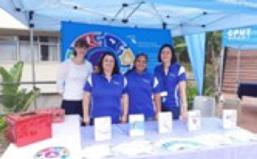
• SC had interactive exhibition stalls as part of the Welcoming of First Years ceremonies on 3 campuses.
• Self-help brochures relevant to first year adjustment were distributed at the stalls.
• Several of SC’s marketing and promotion materials were distributed at our stalls.

• Monthly wellness events hosted: Women’s movie week celebrating

Special projects: Adopt-a-residence as part of the dean of students’ special Projects, student counselling presented several workshops to residence students in the evenings. residence dialogues included: gBV and substance abuse, depression, anxiety, and suicide awareness.
• The project aimed to create mental health awareness, and to combat mental health stigma.
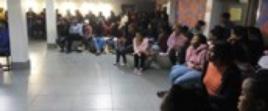
• Students were encouraged to assume responsibility for their well-being and to take steps towards self-management.
Bipolar Awareness Week
a mental health awareness project took place on the Wellington campus in collaboration with the department of sport Management.
The play “crazy golden oldies With a touch of Bipolar” with actors Marié du Toit en Bram Potgieter from global recordings raised awareness through humour and drama.
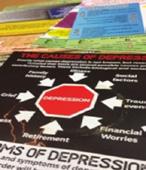
student counselling had a radio talk slot on rsg to discuss the challenges faced by students regarding mental health stigma and bipolar awareness. efforts were made to combat mental health stigma and bring awareness to the challenges faced by students living with depression.
CoNCLUSIoN AND WAy ForWArD
The student counselling activities and core engagements off 2019 focused on both individual and group interventions with the aim of facilitating students’ personal and mental health growth, development and academic success. counselling and support, training and skills development, and wellness empowerment and advocacy were at the forefront of these activities.
The holistic development and wellbeing of cPUT students will continue to be the primary focus of student counselling in 2020. it is envisioned that further development of the online graduate exit Programme and the development of the Blackboard student counselling portal will take priority in 2020, to work towards increasing the reach and impact of student counselling, along with preparing for an aligned cPUT 3.0 mission and vision.

i M P r o V i ng T e aching a nd
L e arning – T h e U c d P
3.1 F irst Year e x perience (FY e )
3 .2 Work i n tegrated Laboratory Learning (W i L L)
3.3 T he 7th a n nual r e search and i n novation into Teaching and Learning ( r i Ta L ) c o nference
3.4 g r aduate a t tributes and d e colonising the curriculum


The First Year Experience (FYE) is a student-centred initiative that responds to the university’s mission, vision and priority programmes. FYE aims not only to increase student success and reduce attrition, but to maximize student achievement.
FYE assists students to achieve a smooth transition from high school to university. This is done by helping students cultivate the abilities necessary for effective learning. FYE aims to inspire students to become fully inducted into their academic disciplines and programmes, providing them with psycho-social and academic support that will inspire them to achieve academic excellence
These include students from 2nd and 3rd years as specific to lecturers’ requests.
The topics covered in these sessions include: goal setting; Time Management; embracing diversity; Personal Budgeting; reading skills; note Taking skills; information Literacy; exams Preparation; Question interpretation; and Plagiarism. other topics such as Peer Pressure, understanding your campus, Using Blackboard, amongst others were facilitated during orientation as per faculty requests an interesting request came from Biomedical sciences students who together with their lecturers requested a debate on diversity. The FYe facilitated this debate over 2 days and saw the active participation of all the students in the class. Feedback from this indicates that such events can contribute to building social cohesion amongst students.
the Mentoring programme
Mentors are trained to provide psycho-social support to first year students. There has been a slight increase in the number of mentors trained in 2019 (see figure 2 below). There is a dire need to appoint more mentors to assist first year students since there is increase substance abuse, mental health, gender-based violence, suicide and rape cases in our institution. Mentors were instrumental in uncovering the following issues: mental health (1), gender-based violence (5), suicide (2) and rape (5). The cases were reported to the institutional legal department for investigation. Those who required psychological support were referred to student counselling and outside facilities.
the role of retention officers
The retention officers (ros) together with First Year coordinators are responsible for monitoring students’ disengagement and identifying students at risk as early as possible by checking the following; students who miss a class, do not submit an assignment and fail an assessment are called in by the ros. The ros and mentors uncovered many issues under mentoring. The ros and mentors submit monthly reports citing students’ issues they had to deal with. These reports are then analysed by the Teaching assistant and submitted to faculties to deal with the issues identified. The reports were very helpful in creating awareness in Faculties about first-year students’ issues.
Figure
Figure 2 shows retention officers trained 2017 – 2019
CpUt101
cPUT101 multiple choice questions are available on Blackboard. The pilot of cPUT101 was rolled out in the following Faculties:
Faculty
Informatics & Design
Business & Management
Sciences
Department
graphic design
industrial design
surface design
interior design
Town & regional Planning
Business and information administration
Marketing
Management and Project Management
Engineering clothing Management (only 2 sessions were facilitated)
Health & Wellness
Applied Sciences
Education
Biomedical sciences
environmental Management
grade r
The FYe team has started collating feedback from staff and students with regards to cPUT101 and FYe work. To this effect, we have designed the cPUT101 feedback survey which we started sharing in the 3rd term of 2019. The results of the feedback confirm that students are generally interested to access material that would contribute towards their success in exams. The interaction with this lecturer highlights the need for active collaboration. it also demonstrates why faculty academics should make FYe their business too, because it shows the needs to which they can contribute in building a strong FYe programme.
Fye StUDeNt SyMpoSIUM
FYe hosted a student symposium attended by 115 people (staff and students) on 17 october 2019 where ros from the different faculties made presentations about:
• Issues affecting first-year students.
• Challenges faced b entors nd ROs i upporting first tudents
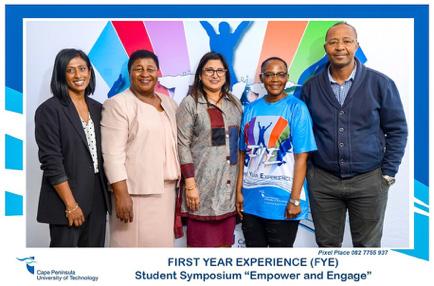
Keynote speakers (Dr Annsillar Nyar: Director South African National Resource Centre, Dr Soraya Motsabi: University of Johannesburg, Dr Subethra Pather: University of the Western Cape) presented different perspectives on FYE.3.1
Many of our students in technical fields will be employed in occupations that include laboratory work – the idea behind this project is to maximise the potential of learning in the laboratory to include a focus on professional work in laboratories beyond undergraduate studies. The WILL report describes the research activities and findings of the WILL project with regard to:
• The sub-projects;
• The work done;
• Dissemination of the findings; and
• The way forward

to progress in workplaces and to build careers. The focus of this project is the role that work-integrated laboratory learning (WiLL), both virtual and actual, can play in building the necessary knowledge, technical competencies and personal attributes for employability in the health and wellness and engineering sectors. The project has three phases: 1) in the first phase best practices for work-integrated laboratory learning were established through a systematic review of the literature, and assessment criteria for evaluating current laboratory practice were developed; 2) in phase 2 the current laboratory-based learning practices at cPUT were studied and analysed – and their potential and implications for workintegrated laboratory learning was assessed using the assessment grid developed in phase 1; and 3) Prof Christine Winberg
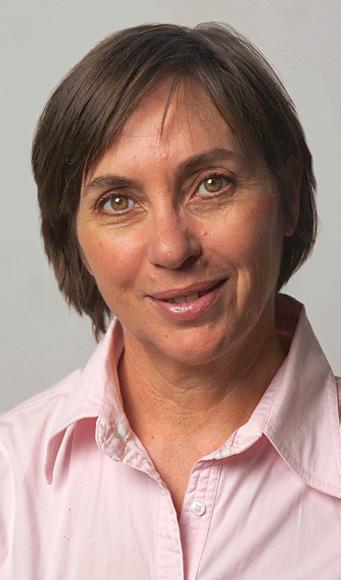
in the current phase (i.e., phase 3) the training workshops continued, drawing on the findings of the study for staff development, as well as more widely disseminated in peer-reviewed publications.
pHASe
1: A SySteMAtIC LIterAtUre reVIeW oN LeArNINg IN tHe LABorAtory
a research team was established comprising members from radiography, chemical, Mechanical and industrial engineering, as well as chris Winberg, south african research chair in WiL and director of the Professional education research institute (Peri) and dr Lidion sibanda, a postdoctoral scholar located in Peri. The team received training from the library on databases and search engines and conducted a systematic review of the literature on learning in the laboratory. a key findings from the literature review was the link between laboratory-based learning and emerging professional identities. Learning in the laboratory not only provides students with the skills and competencies needed for their future careers, but also builds a strong sense of professional identity. during the first phase, ethics clearances to video-record and photograph in laboratories and to interview academic and technical laboratory staff was granted by the Fundani research ethics committee.
pHASe 2: StUDyINg LeArNINg
IN
tHe LABorAtory
The sub-projects were finalised during the second phase and the teams received training in data collection and analysis methods. Project activities, each having a specific focus, were implemented. in chemical engineering the focus was on teamwork as an interpersonal skill developing from laboratorybased learning; in Mechanical engineering the focus was on the role of peer mentors, while in industrial engineering the focus was the ways in which project-based and simulated learning could contribute to student employability. in radiography the focus was on the Virtual environment for radiotherapy
Training (VerT) as a preparation for professional clinical practice. The two Peri researchers focused on the role of laboratory technicians in laboratorybased learning and on safety in laboratory-based learning. Team members presented their initial research findings at a number of local and international conferences. Team members also undertook local and international study visits to see laboratory-based training towards employability in different contexts.
pHASe 3: DISSeMINAtIoN oF FINDINgS
The dissemination activities included virtual workshops that shared the initial project findings with the cPUT community, with a focus on enhancing work-integrated laboratory learning in the health and Wellness sciences and engineering. a three day virtual writing retreat for the project team was facilitated by chris Winberg (20 – 22 april 2020). a number of journal articles arising from the project are currently in progress or in press. a project evaluation will be conducted in the final phase.
tHe
WAy ForWArD
although the project officially ends at the end of 2020, there are number of ways in which aspects of the project will be taken forward. in particular, the dual-education project that has been funded by a national collaborative Ucdg that will include several of the WiLL team members who will be able to take their work forward and collaborate with industry partners.
3.3 research and innovation into Teaching and Learning (riFTaL)
academic staff presented their research findings at the annual research in Teaching and Learning conference (ri TaL). riTaL was held on 5 december, attracting 14 presentations and 4 poster presentations.
The riTaL 2019 conference brought together academics from across the disciplines at cPUT who were interested in addressing issues of decolonising the curriculum, academic staff development, student engagement, multilingualism and language and the curriculum. The conference also invited academics within the support structures, programmes and units of the university. For the first time, the riTaL conference sent out a call for papers in afrikaans and isiXhosa. academics were invited to present their research findings in the language of their choice. Translators were available to translate the keynote presentation in afrikaans and isiXhosa and conference presentations.
The theme for the conference was ‘educational transformation: reimagining teaching and learning practices in the context of decolonising higher education’. The keynote speaker of the conference was Dr Matete Madiba her career in higher education focused on academic and educational development in its broadest sense, including curriculum development, the use of technology in higher education, student development and student success.
dr Madiba holds a Phd degree with University of the Western cape, south africa. she is currently the director: student affairs at the University of Pretoria and the chair of the institutional Transformation committee and a member of the UP institutional task team for curriculum Transformation. Prior to this appointment, she was deputy director in the department for education innovation in the same university. she also served as acting director: curriculum and development support at the Tshwane University of Technology (TUT) before she joined the University of Pretoria’s department for education innovation.
she served as a lecturer at MasTec (Mathematics, science and Technology college of education). dr Madiba also participated in the Tuning africa Project (african higher

Dr Matete Madiba
education harm onization and Tuning Project) as subject specialist and coordinator of the Teacher education subject area group. she is also part of the management team of the Tuning africa Project. The title of her keynote was, ‘decolonisation in proximity to teaching and learning: a gaze into the distance’. she raised questions about what it mean to decolonise the university or the curriculum. is decolonisation an antidote for all problems within the university, the curriculum and the education system? one particular question of interest she alerted us to was how far the sense-making and associated activities will result in the desired change in teaching and learning, in both theory and in practice. she suggested that the emerging literature that challenges the decolonisation debate is not only about making sense of the concept and getting to grips with what it means but also about how the debate is translating into classroom practice. her keynote explored both emerging literature and emerging case studies and addressed pointers in terms of what prospects of change the decolonisation project holds for the classroom.
Feedback from the evaluation of the conference indicated that most participants were of the opinion that the conference was informative. The conference participants praised the keynote and felt that the speaker was good and thought-provoking. The participants suggested that future conference address topics such as the implementation of decolonizing the curriculum, multilingualism in the classroom, more blended learning themes, work-integrated learning (WiL), and the scholarship of teaching and learning (soTL).

This report is an extract from a much broader report on the graduate attribute project in the Department of Applied Legal Studies. Definitional issues are not unpacked here and detailed information can be retrieved from the complete report and the instruments referenced. This extract focuses on making meaning of the Graduate Attribute Position Paper (2015) and the Graduate Attribute Charter (2017), the perspectives that emerged from that examination, and the departmental GA implementation plan that resulted from the examination.
“[Development is] the enhancement of freedoms that allow people to lead lives that they have reason to live”. Amartya Sen (2000)
INtroDUCtIoN
The identification of graduate attributes at cPUT has gone through a number of developments since 2013. The cPUT Vision 2020, which is captured by the phrase, ‘To be at the heart of technology education and innovation in africa’, generated a number of graduate attributes. The university endeavours to develop graduates who are:
• Technologically adept both in the ability to use technology and in their capacity to apply knowledge to real life issues
• Eminently employable because they have a solid disciplinary knowledge base and the capabilities to apply this knowledge
• Socially responsive in the sense that they should be aware of the important social issues in south africa and be able to apply their
knowledge and skills to address social needs
• Innovative in their thinking and actions
• Environmentally conscious
a position paper (hereafter called the ga Position Paper) was drafted by a task team consisting of the academic Planning Unit of the department of institutional Planning and the curriculum development Unit of the Fundani centre for higher education development and approved by the senate in june 2015. The purpose of the position paper was to
• Clarify the key concepts and terms associated with graduate attributes in literature
• Address some of the misconceptions about embedding graduate attributes in the curriculum.Provide broad guidelines on how graduate attributes can be successfully implemented at an institutional and programme level
The cPUT ga Position Paper was followed by a graduate attribute charter (hereafter called the ga charter), drafted by a task team assembled by the Fundani centre for higher education development and was approved by the senate in september 2017.
The charter converted the graduate attributes contained in the position paper into the following set of capabilities:
• Technological capability and foresight
• Relational capability
• Ethical capability
• Resilience and problem-solving capability
as the decade drew to a close, the need arose to review cPUT Vision 2020
and the university management crafted cPUT Vision 2030, embodied in the phrase, ‘one smart cPUT’. a revised vision for the institution was crafted that positioned cPUT as ‘africa’s leading smart University of Technology, globally renowned for cutting edge innovation with graduates that shape a better world for humanity’ with the mission to ‘transform its students, through world class researchers who inspire knowledge production and innovation that are cutting edge’. how the capabilities align to Vision 2030 still has to be unpacked at institutional level. The vision and mission of a university and its strategic plan provide the context for the three key focus areas of institutional development namely, teaching and learning, research and community engagement. (Position Paper (2015)) academic departments are created and exist to carry out this vision and mission. The department therefore endeavoured to make meaning of the two guiding instruments (cPUT ga Position Paper_2015 and the cPUT ga charter_2017), being mindful that the alignment with Vision 2030 still has to be clarified.
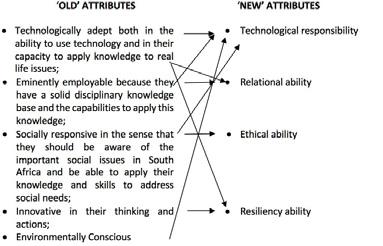
Figure 1: old and New graduate Attributes [CpUt graduate Attribute Charter (2017)]
1.1. the relationship between the gA position paper and the gA Charter
The drafters of the ga charter premised the set of capabilities that they have identified upon the graduate attributes that were contained in Vision 2020 and clarified in the ga Position Paper. This appears to be in alignment with the capability approach to human development popularised by the nobel Laureate amartya sen. Figure 1 is an illustration of the relationship drawn in the ga charter between what is considered to be the ‘old’ attributes in the ga Position Paper and the ‘new’ attributes in the ga charter.
The attribute eminently employable is linked to Technological responsibility and relational ability. it further considers being socially responsive as related to ethical capability whereas being innovative is linked to resiliency ability. The ga charter also associated environmental consciousness with Technological responsibility. The departmental perspective departs from this view as indicated below.
2.2
Departmental perspective
Figure 2 below illustrates the departmental perspective of the relationship between the graduate attributes in the ga Position Paper and the set of capabilities in the ga charter.
The ga charter firstly advances the perspective that being Technologically adept relates to Technical responsibility, relationalability and resiliency ability.
MAkINg MeANINg oF tHe CpUt gA poSItIoN pAper AND gA CHArter
The attribute eminently employable is linked to Technological responsibility and relational ability. it further considers being socially responsive as related to ethical capability whereas being innovative is linked to resiliency ability. The ga charter also associated environmental consciousness with Technological responsibility. The departmental perspective departs from this view as indicated below.
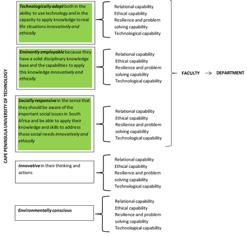
The ga Position Paper therefore has relevance, whether in its current form or with proposed adaptations. The view advanced in this report is that the entire set of capabilities in the ga charter applies to each of the attributes in the ga Position paper and therefore a slight adaptation to the orienting framework and the set of capabilities is proposed for consideration.
2.2.1 The orienting Framework
The first three attributes (Technological adeptness, eminent employability and social responsiveness), seem to be able to stand on their own as pillars of the institutional graduate attribute orienting framework. however, the last two (innovative in their thinking and actions and environmental consciousness) are considered to be a twin set consisting of an enabler and a qualifier for the first three attributes. Bearing in mind the heterogeneous communities that graduates encounter in society and the resilience and problem-solving capability that they have to display in their daily lives, being innovative would be an essential enabling component for their technological adeptness, employability and social responsiveness. environmental consciousness speaks to the broader qualifier of being ethical and would therefore, like its twin enabler, be an essential qualifying component of the first three. The phrase ‘innovatively and ethically’, representing the twin set, has therefore been inserted rather ineloquently in the first three attribute statements in the diagram to illustrate the point.
2.2.2 The set of capabilities
The set of capabilities in the ga charter have been identified following a process of consultation that is documented in the annexure to the ga charter. These are the capabilities that the university community deemed essential, noting its orienting framework. however, being acutely mindful of the fact that graduate attributes are interrelated, progressive and contextual, the department is of the view that the existing capabilities, individually and collectively, do not allow sufficiently for the expression of disciplinary expertise as a graduate attribute.
Figure 2: relationship between gA orienting Framework and gA Capabilities
relational capability developed through resilience and problem-solving, supported by technological capability and guided by ethical capability rely on the acquisition, application, analysis and synthesis of a body of knowledge that is codified in the academy as informed by the practice. however, the capability set in the ga charter does not contain such capability or the capability to create disciplinary knowledge. The capability to engage critically with the disciplinary knowledge forms an essential building block of the relational capability (knowing, doing and being) that characterises the practice.
Universities give expression to this capability in their respective attributes by referring to it as scholarship [critical attitude towards knowledge] (University of the Western cape), ‘depth of disciplinary expertise’ (University of sydney), being ‘skilled’ (central University of Technology) and being ‘subject specialists’ (University of glasgow). The department therefore inserted an additional capability into the generic capability set, labelled loosely as ‘academic capability’, which would represent the disciplinary expertise at departmental level. Figure 3 illustrates the departmental understanding of how these capabilities reflect at institutional level.

The department considers the beneficiaries to be the stakeholders who would participate in the conceptualisation of the graduate attributes, whether through their direct involvement in its initial crafting or by re-conceptualising/refining them through a consultative process. The legitimacy and value of these attributes for stakeholders depend upon this consensus seeking process. This ga
development process makes provision for feedback following implementation and for the reconceputalisation of graduate attributes upon evaluation by stakeholders. a faculty and academic department should therefore examine each component in this process, make meaning of it and give expression to it within their own context. relational capability, framed at the apex of the capability set, is described in the ga charter as ‘stand[ing] in the shoes of others.’ This encompasses more than relating to others. it involves the capacity of the graduate to relate the capabilities that he/she has developed in a manner that contributes positively to the diversity that he/she will encounter in society, whether local, regional or global (Barnett, 2004).
The above qualified understanding of the relationship between the ga Position Paper and the ga charter, as well as the graduate attribute development process, enabled the department to make meaning of the graduate attributes within the context of its newly implemented programme. however, this could not be done without insight into the faculty context. Brief reference is therefore made to the draft graduate attributes Position Paper and Plan for 2020/2021(hereafter called the draft FBMs Position Paper).
This draft position paper is in its embryonic form. however, the department relied on two critical aspects in this draft that enabled it to proceed with its implementation plan. The first is the adoption of the definition of graduate attributes as the qualities, skills and understandings a university community agrees its students should develop during their time with the institution. These attributes include but go beyond the disciplinary expertise or technical knowledge that has traditionally formed the core of most university courses. They are qualities that also prepare graduates as agents of social good in an unknown future (Bowden et al, 2000).
each of the italicised parts links up with the understanding of graduate attributes that underpins the process of its development as reflected in Figure 3. The definition also confirms that disciplinary expertise is an essential attribute but
Figure 3: generic gA development cycle
do so with the qualification that attributes are not confined to such expertise. This serves to confirm the inclusion of what this report loosely refers to as ‘academic capability’ as an integral part of the capability set of the institution.
The draft FBMs Position Paper also includes a graduate attribute development plan consisting of the following:
• Conceptualisation: Clarifying perceptions and understandings in the faculty
• Stakeholders: Identifying stakeholders involved with GAs, both internal and external to cPUT and the faculty
• Implementation: Converting the GAs into outcomes and mapping these into subject content, teaching, learning and assessment
• Staff Development: Providing opportunities for staff to discuss and develop gas in pedagogy and practice
• Curriculum: Determining how the GAs will be incorporated into curriculum and how the gas will be scaffolded across the levels of learning
• Assessment: Determining the most appropriate and effective methods of assessment for each qualification and subject(s)
• Quality Assurance: Evaluating the efficacy of the various factors related to implementation.
although this document is still in its embryonic stage, the department nevertheless drew upon this graduate attribute development plan as it is aligned to the ga charter and the ga Position Paper.
DepArtMeNtAL gA proJeCt pLAN
The department embarked on the drafting and implementation of a project plan for the development of graduate attributes that is aligned to the draft FBMs Position Paper, the ga charter and the ga Position Paper. Figure 4 illustrates the departmental project plan.
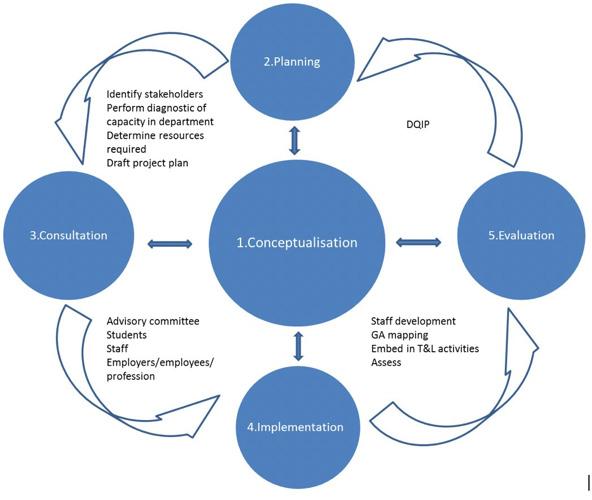
This project plan involves a 5 stage process, commencing with the conceptualisation of the graduate attributes and ‘ending’ with the evaluation of the process. none of these stages stands in isolation as each one impacts on the other with reciprocal effect. The conceptualisation phase in the department involved an extensive research process that spanned an institutional, national, regional and global regulatory framework, the philosophical and theoretical perspectives that frame the practice, an examination of the ‘occupational
Figure 4: DALS gA development plan
identity’ of the practitioner, as well as an examination of a range of reports and other publications related to the practice.
The planning phase comprised populating the ensuing stages drawing on the principles of project management, identifying stakeholders, performing a diagnostic of the capacity in the department, determining the resources required and drafting a project plan. The department implemented the project plan by embarking on a consensus seeking process involving consultation with the stakeholders who have been identified in the planning phase. The implementation phase refers to the incorporation of graduate attributes in the planned teaching and learning activities and the assessment thereof. This was preceded by staff development, followed by the mapping of graduate attributes across the curriculum. The evaluation phase forms an integral part of the departmental quality improvement plan under the guidance of the directorate of Quality Management.
CoNCLUSIoN
amartya sen’s concerns about the contemporary approaches to the evaluation of well-being resonate well in the diverse south african educational context.
The disparities that remain prevalent in our society result in stark differences in the way in which individuals are able to convert the same resources into ‘beings’ and ‘doings’. The academic project is by its nature assessmentdriven and there is no doubt that ‘capability’ carries multiple and contested meanings (Burke et al, 2016). The department, therefore, understands that it must be mindful of this when it embarks on the incorporation of graduate attributes into the curriculum and the evaluation thereof, lest it compromises the agency of the prospective graduate and thwarts the development of his/ her capabilities.
reFereNCeS
amartya, sen 2000, development as Freedom, First anchor Books edition, anchor Books, new York.
Barnett, r 2004, ‘Learning for an unknown future’, higher education research and development, vol.23, no. 3, pp. 247-260.
Bester, M, scholtz, d & sabata, s 2015, ‘a position paper on the development of graduate attributes at the cape Peninsula University of Technology’, cPUT.
Bowden, j, hart, g, King, B, Trigwell, K & Watts, o 2000, ‘generic capabilities of aTn university graduates’, Final report to deTYa, Melbourne, australian Teaching and Learning committee, australian Technology network viewed 24 august 2020, <http://www.clt.uts.edu.au/aTn. grad.cap.project.index.html>. Burke, P j, Bennet, a, Burgess, c, gray, K & southgate, e 2016, ‘capability, Belonging and equity in higher education: developing inclusive approaches’, centre of excellence for equity in higher education. The University of newcastle australia garraway, j, sabata, s & ralarala M 2017 ‘cPUT graduate attributes charter: attributes and underpinning abilities’, FUndani ched. cPUT Faculty of Business and Management sciences, ‘draft graduate attributes Position Paper and Plan for 2020/2021’. cPUT
dr noleen Leach head of department (acting) department of applied Legal studies in consultation with dr desiree scholtz assistant dean Teaching and Learning (acting)
Mr siyabulela sabata head of department (acting) curriculum development dr soraya Beukes researcher
Fa c U LTY-B a sed
T e aching a nd L e arning

4.1 Business and Management s c iences
4.2 e d ucation
4.3 i n formatics and d e sign
4.4 a p plied s c ience
4.5 h e alth and Wellness s c ience
4.6 e n gineering and the Built e n vironment
4.1 FACULTY OF BUSINESS AND MANAGEMENT SCIENCES
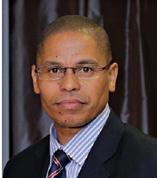
The dean, prof paul green, was previously in the employ of the durban University of Technology and occupied various positions. he holds a Phd from the University of KwaZulu-natal with specialisation in systems Thinking and is also registered with the south african institute of Professional accountants. his research focuses on developing applicable frameworks for UoT’s on the evaluation of service quality using a systems approach; service system interactions at tertiary institutions; and application of analytic hierarchy Process for the evaluation of service.
Desireé Scholtz is the Teaching and Learning co-ordinator in the Faculty of Business and Management sciences. her background in academic literacy, standardised testing and curriculum development provides the impetus for her work in the faculty. her involvement with the development and item
his current research involves the systemic analysis of service provisioning of govern institutions using complexity theory. his scientific research outputs are published in department of higher education & Training (dheT) accredited journals; accredited international and national conference proceedings; and book chapters. he has supervised numerous postgraduate students at Masters, doctoral and Post-doctoral degree level. To date he has examined more than 30 postgraduate qualifications for various national and international universities.
reviews of the national Benchmark Test in academic Literacy (nBT/aL) contributed to the nBT (aL) being the focus of her Phd studies at UcT. her research interests include teaching and learning in higher education, curriculum development and academic development.

Teaching and Learning report
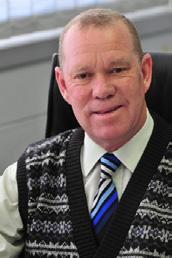
Mr Ivan Charles van der Heever, associate dean: Teaching and Learning in the Faculty of Business and Management sciences (FBMs), retired on 31 december 2019 after 31 years of service at the cape Peninsula University of Technology (cPUT).
Mr van der heever was appointed as a Lecturer at the Peninsula Technikon in 1989 and gradually worked his way up the faculty structure until he was appointed as associate dean in 2004, a post he held for 15 years. he developed his portfolio in the FBMs to include the following:
- Teaching and Learning,
- Work-integrated Learning,
- community engagement,
- internationalisation.
a relevant and efficient committee-system was always a focal point of his approach and he established and chaired various committees in the FBMs, amongst others:
- Teaching and Learning committee,
- Work-integrated Learning committee,
- recognition and exemption committee,
- Qualifications evaluation committee,
- subject review committee.
at institutional level, Mr van der heever was a life-long member of the senate Teaching and Learning committee and occasionally also chaired the committee. he also served as a member of the
following institutional task teams:
- subject review Mechanism,
- ad hominem Promotions,
- Teaching excellence awards.
Further highlights in his career included the following:
- initiated and management of the international Programme in the FBMs.
- Life-long member of heLTasa (previously saaad). he also served as a national executive member and regional coordinator for the Western cape.
- chairperson of the Financial aid committee at Peninsula Technikon and executive member of the Bursary council of south africa.
Mr van der heever had a long and distinguished career at cPUT and we wish him well in his retirement.
The focus of the faculty in 2019 was on:
• Using group work to bring the workplace into the classroom in Applied Legal studies.
• Involving first year studies in Events Planning through multifaceted teaching and learning.
• “Active kids” programme in Sport Management taking physical education to schools.
Work integrated Learning report 2019
Facilitating
the
learning of civil procedure in a simulated environment
adriaan haupt

i was assigned with teaching a semester course, civil Procedure, to 49 second year B Paralegal students. The syllabus comprises mainly civil litigation in the Magistrates court and the small claims court. Lecturing consisted of two 90 minute sessions per week. The challenge was to create an environment where formal teaching is limited, where students become active learners who feel free and confident to communicate, interact and participate, and take responsibility for their own learning.
The solution was to create a group-based, student-centred classroom that incorporated facets of problem-based learning methodology and which simulated real life legal litigation practice. Formal teaching was limited and used only to introduce students to the concept and practice of problem-
based learning, to provide an overview of the different processes and to review the tutorials and March assessment. class notes were provided only after a specific milestone was reached.
the formation and functioning of “legal firms” in Civil proceedings
students were invited to form groups consisting of five members each. groups were to function as legal firms, representing their respective clients in typical cases found in legal practice such as breach of contract, delictual claims and ownership disputes. The chairperson organised the group, led and stimulated group discussions, and allocated drafting responsibility and monitored progress against the project delivery date. group members analysed the scenarios, discussed the issues it raised, agreed on ways to address the problem, divided the research to be done, generated possible solutions, presented their findings to the group and decided on the most appropriate solution.
the role of the lecturer

during contact sessions the lecturer visited each group, asked questions for the purpose of encouraging critical and ndependent thinking, perused drafted documents and processes and provided feedback and guidance but not corrections or solutions. Where a group erred, the group was merely advised to reconsider the particular process, form or content. in this way project execution, individual participation and class learning were indirectly monitored.
the scenarios
each legal firm received two different scenarios, one suitable for the action procedure and one suitable for the application procedure. in line with the methodology employed in problem-based learning, the scenarios were vaguely
Teaching and Learning report
defined and lacked sufficient facts to enable a group to identify, research and address the problem, or to proceed with the case on behalf of their client.
a firm had to consult with and consider the ‘incomplet’” problem of its client. The group had to design a client file, categorise the problem as to the field of law it belongs to, and prepare questions for the client that would put the firm in a position to decide on the steps to address the problem. The group had to conduct legal research into the substantive law applicable to the scenario to determine whether the client had a right, whether the client’s right might have been infringed and what an appropriate remedy might be. The group then prepared the necessary documents to institute a claim against the alleged wrongdoer. each group dealt with undefended procedures and defended action procedures, application procedures and appeal. during the course of the court procedures, the legal firms also negotiated settlements on behalf of their clients.
group portfolios
The portfolios consisted of the client files representing the different cases, mind maps illustrating the processes, a glossary of legal terms, the ethical considerations during litigation and a reflection on each completed stage. a marking grid was used for marking of the portfolio. in general terms as to the requirements for the portfolio. however, care was taken not to reveal the specific documents and processes to be produced by the groups and the sequence of the processes.
evaluation

students in general enjoyed the course and class attendance was exceptionally high. a student who did not pull his or her weight was put under pressure by the other members of the group to attend or perform. Most students participated enthusiastically, showed considerable
commitment and did more than what was required of them. By keeping to court timelines, a well-performing group exerted pressure on a nonperforming group to improve their performance. students appreciated the trust placed in them and concluded that they learned more “by doing” than they would have learnt in a traditional lecture setting.
some students struggled to cope with the demands of problem-based learning, namely the lack of formal instruction and correction, the lack of detail in the scenarios and the responsibility of independent learning.
The process was not always perfect and certain challenges were identified by students and the lecturer alike. The way forward is to redesign the project on the basis of the recommendations received and to pursue a journey of continuous improvement.
orientation in Tourism and events Management: capturing the interests of First Year students

The first few months of transition to university are challenging for any first year student. institutions of higher learning understand this dilemma, hence the inclusion of various forms of orientation in the first few weeks, to welcome students and to make them feel at ease with their new surroundings and university many instances orientation is used as a tool to introduce students to university/faculty or department work-culture, operations and a previous student myself, having been introduced to a highly interactive orientation programme in my university days, i have
a deep understanding of how impactful such an experience can have on students entering university.
The Tourism and events department introduced an integrated activity/ assessment linked to course content. For example, the diploma in Tourism Management assessment was linked to the subject Travel and Tourism Practice 1 that promotes the use of learnt content and creativity to develop a tourist itinerary for the visited tourist attractions. The diploma in event Management assessment was linked to the subject event planning & Practice by turning the tour into a site inspection with the aim of developing an event map].
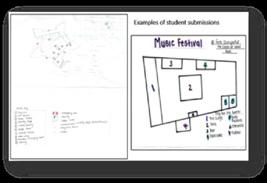
owing to the high volume of late registrations experienced since 2016, the department plans its orientation programme for late in the first term. one of the 2019 orientation events was a visit to the castle of good hope. Before the visit, both programmes introduced students to the fundamental industry-related practices within their specialised subjects, as well as skills related to the outcomes of related activities to be completed on orientation day. The aim of the orientation project, added to the fun factor for students, is multifaceted:
• Students are introduced to their “production site” early on, to create a certain awareness of a service provider view point to attractions and venues from their first year. it is important that students who study Tourism and events Management can view sites and spaces not only from a leisure, end-user perspective, but from a business potential viewpoint.
• The project aims to promote students’ self-awareness. In many instances of learning students do not know how to integrate their own knowledge to taught content. creativity and personal instincts in the services industries are sought-after attributes that students should learn to embed in their learning.
• Creating a team spirit and the notion of group work is not always fun, but networking skills must be encouraged within group work.
orientation programmes as a tool to enhance student experiences at university must not be ignored. These programmes can also not be boxed into a formal presentation format, as this is mostly viewed by students as information overload. Fun educational activities for students must not be left to pop-up activities from external companies that visit our campuses on the odd occasion. The challenge to integrate an orientation like this one is funding. a dedication to such a process requires funding and properly coordinated planning and support from faculty and university at large.
sport Management: active Kids service-Learning Project
sharhidd Taliep

The department of sport Management has been involved in a service-learning initiative called ‘active Kids’ which has been enormously successful in consolidating student knowledge and developing graduate attributes. dr sharhidd Taliep spearheaded the project for the past three years. exit level national diploma students were required to undertake a 6-week servicelearning project, where they promoted physical education and physical activity to learners at underprivileged primary schools where there were no designated physical education teachers. The rationale behind the project from a community perspective was that physical education was removed from the curriculum and there was a need to promote physical activity among the youth, especially since the rate of obesity and physical inactivity is on the rise.

Furthermore, the overall burden of non-communicable diseases related to physical inactivity accounts for more than 35% of all deaths. From a student learning perspective, it was found that despite the numerous lectures, practical sessions and case studies, students were still not equipped with the attributes to confidently and competently engage in workplace settings. There was a need to consolidate their knowledge with practical experience in a real-world environment. The students were required to promote physical activity by incorporating all the components of fitness in their training of the learners (aged 7-13 years) in fun activities. The students were also required to explain to the pupils the relevance of each exercise for their general fitness, health and wellness. The pupils then produced a portfolio where they reflected on their learning experiences. The theoretical framework utilised in this project is Legitimation code Theory (LcT). This project aims to evaluate the theory of LcT concepts of semantic gravity and semantic density and how students construct semantic waves during their learning process. The preliminary findings reveal that in general the students construct semantic waves by unpacking and repacking complicated theoretical aspects of fitness and physiology. This strengthening and weakening of semantic gravity and semantic density builds cumulative knowledge. gaps in teaching have also been identified when these semantic waves were difficult to construct. This project promotes most of the graduate attributes that the department aims to develop. These include deep disciplinary knowledge, critical thinking and problem solving, career and leadership readiness, intellectual and ethical competency, self-awareness and emotional intelligence. Many students have also commented on the soft skills like time management, communication, creativity, work ethics, adaptability and interpersonal skills that have been developed during
Teaching and Learning report
this project. one cPUT student commented: ‘i can now say that this has equipped me with the necessary confidence and knowledge to further my career in my chosen field. My passion for kids and sport has been re-ignited by these girls and made me more determined to accomplish my goals’. Furthermore, the students were overwhelmed with appreciation from the pupils at the school.
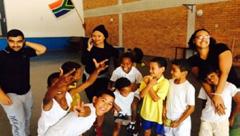
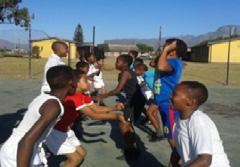
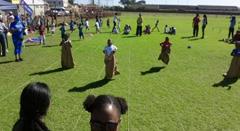
Letters of appreciation from the pupils
CPUT student organising a sports day above
4.2 FACULTY OF EDUCATION
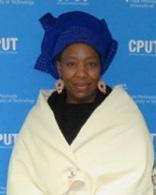
dean of the Faculty of education
i am very proud of the teaching and learning initiatives led by staff and students. since the core business of the Faculty is educator development, we take this responsibility very seriously. We pride ourselves that through our programmes and offerings, we impact learners from grade r to grade 12, pre-service and in-service educators, education management and leadership, and university students and academic staff
across the country. our academics, as evidenced in this report, are being recognised and honoured well beyond cPUT and the Province. Thanks to the Teaching and Learning committee led by dr Thornhill, dr Meda, the Teaching and Learning coordinator who recently left us, the curriculum coordinators, the tutors and peer leaders for the success of the Faculty in this portfolio.
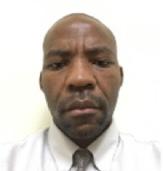
Dr Lawrence Meda is a senior Lecturer and Teaching and Learning coordinator in the Faculty of education at cPUT. he holds a Phd in curriculum studies from the University of Kwa-Zulu natal and he is very enthusiastic about teaching using technology. he is leading the task team on teaching with technology in the Faculty of education.


MOWBRAY CAMPUS – Highbury Road, Mowbray
MOWBRAY CAMPUS – Highbury Road, Mowbray

Teaching and Learning report
This report focuses on:
• Innovative teaching and learning strategies, the use of technology in teaching and learning activities and assessment,
• Over and under teaching in the faculty and high risk modules.
• Teaching and learning spaces in the faculty and how these contribute or hamper good teaching and learning.
• Student development and involvement in outreach and community engagement programmes will also be highlighted. The report will conclude with a brief indication of the way forward.
innovative Teaching and Learning strategies and the Use of Technology in Teaching and Learning and assessment
in 2018 the dean initiated the Teaching with Technology work group. This group, under the leadership of the T&L and iT coordinators, was tasked with oversight of all projects. a staff survey was conducted in 2018. The purpose of the survey was to determine readiness and current practices, and to inform staff development planning. The project plan was refined and implementation started in january 2019. The following workshops were offered to all academic staff during the course of the first semester: Marks administration through Blackboard and Blackboard collaborate, and wikis. There has been a significant increase in the use of Blackboard Learn as well online tools such as google classroom, edpuzzle, Plickers, etc. This has been largely due to the implementation of a Blended Learning strategy. cieT has helped with staff development, as well as administrative support. They work closely with the iT coordinator to advance the use of technology for teaching, learning, and assessment. This includes ensuring that staff have access to the LMs, running workshops to inform and upskill, as well as assisting with resolving technical issues.
There has been an increase in the use of Blackboard Learn to enhance and
support learning. a number of lecturers have made use of tools such as discussion forums and wiki pages and groups to encourage collaborative learning. There has been an increase in the use of online tests and assignments. More lecturers also booked computer labs for tests to be completed under typical exam conditions. a number of lessons have been learned during the course of the year which have informed practice for 2020.
dr Zaid Waghid, recipient of the 2018 Faculty Teaching excellence award and a 2019 heLTasa Teaching award, used Plickers, a form of gamification, as an active and critical learning tool. The rationale behind the use of Plickers as a pedagogical tool in his teaching and learning is justified by the tool’s dynamic and functional capability in creating an interactive and engaging environment in which his students’ cognitive and social competencies are possibly developed. in other words, the Plickers tool holds the possibility of assisting his students with the means to organise information efficiently while relying on them to create and share their newly acquired knowledge with their peers and him. The Plickers tool is further supported by the social networking site (sns) Facebook, which allows his students and he to engage actively with the content assessed in class. due to the asynchronous nature of Facebook, his students are afforded the means to use their mobile phones to engage with their peers and the lecturer inside and outside of the confines of the classroom through the online group that he constructed. Facebook is a viable platform for teacher-student and studentstudent centred communication and assessment, as it provides the lecturer with the means to upload their students’ assessment reports from the Plickers tool. it is envisaged that this pedagogical approach will further assist his students with the capacity to measure the progress of their learners’ mastery of literacy competencies, while concomitantly encouraging their learners to research, read and engage more efficaciously on the particular LMs used at the schools where they might teach one day.


in 2019, he started using Flipgrid as part of an international collaborative project with partner institution han University of applied sciences in the netherlands. Flipgrid is a social networking platform that allows university teachers to create ‘grids’ as a means of facilitating online video discussions regarding particular topics. each grid functions as an innovative discussion board where university teachers post questions, while students are expected to respond to these questions by posting online video responses. The social networking platform has thus afforded his students the opportunity to engage with the students from han University of applied sciences regarding issues around globalisation which have proven to be an immense success in bridging the geographical divide between students from south africa and the netherlands an in sharing their experiences, thoughts and points of view.
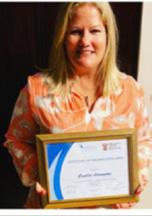
dr candice Livingston, recipient of the 2019 Faculty Teaching excellence award has attempted to decolonise her english curriculum by introducing translanguaging into her curriculum. she has done this in the two following ways: Translanguaging shakespeare into Kaaps, where students are given the opportunity to rewrite scenes from shakespeare in their home language, which is done in order to engage in metacognitive reflection on the creation of meaning in language. Furthermore, students are also encouraged to translanguage fairy tales in their studies of children’s literature. This leads to local contextualisation of knowledge that is autobiographical in nature and relevant to the students’ own learning. dr Livingston has also written articles on the practice of translanguaging fairy tales.
a firm believer in integrating technology in her teaching and learning, dr Livingston uses social media in her assessments. some examples of this are using Facebook to develop students’ knowledge of characterisation, and using instagram to show the development of plot in literature studies. Furthermore, in order to engage students with 21st century skills, assessments like digital breakouts and Quizizz are regularly used in her assessments. she is also actively involved in an ongoing project in the art department at the Faculty of education where digitalstory telling is used to facilitate meaning making in art.
over and under-teaching in the faculty
Faculty academics have been accused of over-teaching, that is, over-relying on face to face teaching. The iT coordinator, Mr chris dumas, and the other members of the Blended learning task team are advocating Blackboard use to academics. academics are also encouraged to attend Blackboard training sessions at cPUT. Work allocation has been centrally planned, and reworked to achieve uniformity on time allocated for tuition in each subject. Through central work allocation, the plan is to consolidate posts, and in the place of part-time lecturers in different departments, to motivate for a full-time post shared by more than one department, where applicable.
high risk Modules
There were no modules identified as high risk modules. What has been noticed, however, is that the pass rates remain high but the average percentages per subject are going lower, for example, the class may obtain a 100% pass, but the average (mean) percent of marks be just 50%.
The departments monitor performance in all modules to see which are highrisk modules. The indicators would be the high number of students who fail the subject, from term tests to the final assessment, or who need to be given extra or alternative assessments.
Dr Candice Livingston, recipient of the 2019 Faculty Teaching Excellence Award
Students from HAN University in the Netherlands communicating on Flipgrid
The general observation from the academic staff about under-performing students in any subject is that this is a result of poor attendance of classes. This poor attendance of classes results in students under or non-performing in the subject, and also missing assessments. To address the poor attendance of classes, it has been proposed that we need to introduce an attendancebased credit and de-credit system. The dean was also requested to address the Pgce students whose classes are in the evening, on attendance of classes, early arrival for classes and the importance of staying until the class is over. The credit and de-credit system has not been introduced as this still needs to go to the Faculty Board and to senate.
The peer tutor system is assisting in improving academic performance across the board. The former Teaching and Learning coordinator dr Meda, and the assistant dean responsible for Teaching and Learning dr Thornhill, monitored and managed this area well. We are now in the process of recruiting a Teaching and Learning coordinator to fill the vacancy.
First Year experience (FYe)
The FYe coordinators, dr hanlie dippenaar on Wellington campus and dr sibongile shinga on Mowbray, and their teams comprising four lecturers and two ros, were all dedicated to the programme and result-oriented. Mentors and retention officers were greatly empowered and inspired to make the FYe a more positive experience to all first year students
dr sharon Mcauliffe and dr Khaya Mashiyi assisted our ros with lists of students at risk. as the FYe department on the Mowbray campus they were able to make plans and provisions to provide guidance in the absence of tutors.
The intermediate Phase Mentor, Malia daniels, worked closely with dr Mcauliffe to obtain the list of all first years who were at risk in Mathematics so that they could be assigned specific mentors who would monitor their progress. dr Mashiyi worked with the ros and mentors in assisting students at risk in languages. after the tutors were provided the intermediate Phase
Teaching and Learning report
mentors gathered all their names and contact details and divided them between the mentees so that they could monitor their progress. Many first year students were found to be coping with their academic demands through the assistance of our ros and mentors. First year students were also assisted with challenges such as finding accommodation, coping with being bullied and stalked and family crises. old Mutual was invited to conduct a Financial education seminar with all First Years to guide them especially with regard to nsFas funding they were to receive later in the year.
Faculty day
on 30 august the Faculty of education celebrated teaching and learning in the faculty during our Faculty day. This day was initiated by the dean, Prof Thobeka Mda. The aim of the day was to showcase lecturers’ achievements in the classroom and students’ work. The guest speaker was dr Marlene le roux, recipient of an honorary doctoral degree from cPUT. The Vice chancellor, Prof nhlapo, opened the day. Unfortunately many students did not take up the opportunity to participate. The faculty will have to find innovative ways to involve more students in these celebrations.
Teaching and Learning spaces
in order for optimal teaching and learning to take place, the environment must be conducive to teaching and learning. The faculty experience constant challenges with providing these spaces on both campuses. The general upkeep and maintenance of the buildings, lecture venues, student recreational facilities and grounds remain an ongoing challenge. The new computer lecture rooms experience intermittent breaks in network connection. This interrupts lectures and lecturing under these circumstances is very frustrating to lecturers and students alike. during the past year a number of online assessments were interrupted and some even had to be postponed due to no network connection. The implication of a postponed
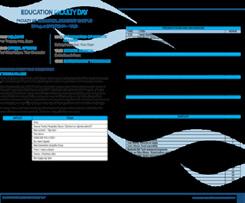
assessment is that the lecturer has to set a new one, and another time for the assessment must be found. cTs has been contacted on each occasion when the interruption occurred and sometimes it took a day or two to address the problem. The cTs representatives on campus were not always in a position to assist with resolving the problem. in venues where the screens are not working or are damaged, the quality of the teaching is impacted negatively as the lecturer has to revert to using the talk and chalk approach and prepared presentations/notes, and images cannot be displayed during lectures. When data projectors are stolen from lecture rooms an additional burden is placed on the faculty capex budget. The procurement process sometimes takes longer than expected and lecturers have to make do without a data projector. Portable projectors are not always the solution, as the security in the buildings is not sufficient. The faculty only has a limited number of portable data projectors.
When a lecturer finds that there are not enough desks and chairs in a teaching venue, teaching time is reduced. students first have to go and search for furniture before the lecture can commence.
dr george joubert, human Movement lecturer on the Mowbray campus, believes the spaces we use and function in has an indefinite influence on the way we perceive ourselves This perception of the self-identity further influences the way we contribute to the learning process. due to the practical nature of the human Movement courses at cPUT, it is paramount that his students contribute effectively in these practical environments. These contributions are not only beneficial for personal student development but also for the entire group that functions under the banner of a positive self-identity framework. The change to an interactive inspiring gYM environment had an enormous effect on student attendance and also on participation in his classes. he believes that
the positive self-identity changes in his students will not only benefit his subject, but the holistic development of the young student teachers at cPUT.
student development and community engagement Programmes
Ms Valencia Theys and six of our senior student leaders from the Wellington campus (corne conradie, Michelle niemand, johan Pienaar, danielle Beugger, jc-haimer small and dunita van der Walt, sacrificed their time during the april holiday to attend the Wced Future Focus conference (25-26 March 2019) at the cTicc in cape Town (conference information below), where they represented cPUT. These opportunities are so important for future collaboration with the Wced and benefit our lecturers, students and cPUT.
The Wced education conversations for the Future conference focused on gathering stakeholders and role players from various educational spheres in the province, to discuss educational challenges in relation to the rapidly changing technological environment.
The dialogue which occurred over the two days was minuted and will be used to develop a set of recommendations to consider for future planning and implementation with the aim of ensuring that each child within the Wced has access to quality education.
The students were grateful that they had the opportunity to attend the conference. all of them found the conference extremely beneficial and felt that it contributed to their professional development.
The students noted that the conference provided them with a greater sense of awareness in relation


Faculty Day Programme
Spontaneous movement pathways in the GYM
to various contextual challenges faced by both urban and rural schools. They appreciated the fact that the conference allowed various schools and stakeholders to share their best practice and collaboratively develop plausible solutions to address these challenges. The students felt that the conference was strategically organized to create an environment where everyone’s voice mattered, which gave them the feeling that they too played an active role in shaping positive change in education.
additionally, the students mentioned that they had fun networking and connecting with other organizations. They had the opportunity to meet various people of influence, including the 2018 global teacher award winner. she gave the students various tips to improve their practice which left them extremely inspired.

dr Pieter Boer and his fourth year human Movement science students were involved in an outreach at sunfield homes in Wellington. sunfield homes is a place for intellectually challenged adults. The students assisted with testing adults with down syndrome where the adults did six weeks of water aerobics training. The tests were performed three times a week for 45 minutes. This programme formed part of the academic module PeP471s within exercise Physiology and exercise Prescription.
a community engagement day was organised by a team of staff, students and src members from the Wellington campus and attended by 50 learners and three teachers from groenberg, groenheuwel in Paarl, Van Wyksvlei and haM children’s home. The day started with a warm-up session by Virgin
active and arranged by irene damons. her wellness team with janine van sittersMentoor and students, all dressed up in fairy wings in front of the cP van der Merwe hall, definitely attracted the attention of the whole of Wellington. she also arranged bikes where everyone could ‘spin for a smoothie’, which was very well received by everyone!
Teaching and Learning report
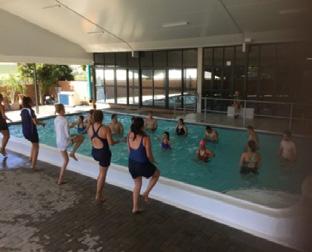
The learners were divided into five groups of ten which rotated from station to station. Pieter Boer had a team of energetic students (Lutchiano Petersen, Brad ephraim, huybre samuels, elsje van eeden, Martlie smith, jesua scholtz, Lisa-Marie Pfister, Leanka Kleynhans,) who arranged obstacle courses, table tennis and ropes that kept everyone active for hours. Megan carstens and Monita Koen taught the learners about safety and first aid. joanne arendse and her team (Kelly-ann Karolus, Michca-Lee Fortuin, randall isaacs) arranged reading activities in our beautiful children’s book section in the library. The learners participated in writing activities, planning and writing their own poems, and listening to poems, with Valencia cloete (Theys) and her writing team (johan Pienaar, Mecayllin Fortuin, johanni dreyer, jc-haimer small, jade Loubser). They learned more about health and wellness from irene damons and janine van sittert-Mentoor and their team (Manise steyn, ncumisa sinandile).
Kobie Meiring and her team (danielle Beugger, ashwil Meyer, coleen Lewies, cecila Pienaar) helped each learner to paint his or her own feathers, which became the beautiful theme poster of the day, “spread your wings”. candice and Kristen Livingston had the group picture printed for every participant, and will work with dunita van der Walt, our photographer of the day to create a digital story. etienne joubert and his students (danwill Fortuin, Kgomotso
CPUT students attending the WCED Education Conversations for the Future Conference
Human Movement Science Students Facilitating Aerobics Training
Malete, Faith Tsiriwa, Lorentia conradie, Zama gwebela, gugu Myeni, hayley hofmeester), organised stations, and made sure all the learners knew where to go and which groups they were in.
our src under leadership of corne conradie and supported by Kurt hartfleur arranged all the events and made sure the day progressed as planned. jacqui scheepers and Theresa Burns arranged the bus for learners and the catering, provided by Boland caterers. Kobus Mitchell stepped in and helped with transporting learners from groenberg & groenheuwel and back home in the afternoon, making sure every learner got home safely. each group had allocated students who took them from station to station. The learners and students completed an evaluation form on their experiences, which we will follow up with focus group interviews. We hope to publish an article coauthored by all the lecturers involved, to share our project and findings. etienne joubert and students from the Business Faculty participated in the logistics and organisation of the day.
conclusion
in 2019 the Faculty of education embarked on developing staff capacity in using innovative strategies and technology in their teaching and learning. With the assistance from Fundani, cieT, the iT and T&L coordinators, all staff are actively using Blackboard in their daily teaching and some lecturers also use Plickers, Kahoot and other apps to enhance their students’ learning. Translanguaging is used to assist speakers of other languages than english or afrikaans to be able to understand what they are being taught and become active participants in the learning process. The FYe programme is gaining momentum in assisting first year students to successfully transition from high school to university.
The physical teaching and learning spaces remain a challenge, but some lectures have taken the initiative to bring about positive change. The faculty depends on the assistance from support departments such as cieT, cTs and idFM and being a satellite campus does not make it easier.
harmonising the delivery of the curriculum on the two campuses still remains a challenge and this should be one of the focus areas for the curriculum officers in 2020. The faculty is awaiting the revised Minimum requirements for Teacher education Qualifications (MrTeQ). once we have received the approved document, we will embark on amending our curricula and admission requirements accordingly. We have to keep up with implementing technologies of the 4ir in both our teaching and curricula if we want to prepare our student teachers for the future classroom. The use and teaching of coding and augmented reality may be the next step.
4.3 FACULTY OF EngInEErIng AnD ThE BUILT EnVIrOnMEnT


acting dean of the faculty: Assoc prof Mellet Mol acting assistant dean: Teaching and Learning: Ms toni Stringer
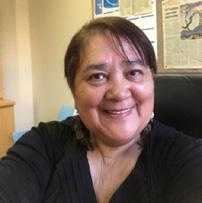
Coordination of Faculty t&L
toni Stringer is the assistant dean: academic (acting) in the Faculty of engineering and the Built environment at cPUT. her background is in civil engineering and more recently, in curriculum development for new heQsF aligned qualifications. she holds a Master’s degree in civil engineering and a Postgraduate diploma in he studies from the University of cape Town. Ms stringer is enthusiastic about Work integrated Learning, community engagement, and service Learning. she has been a lecturer in the department of construction Management and Quantity surveying for more than 10 years; her substantive post is head of the same department. Together with the T&L coordinator and the T&L committee, she champions T&L in the faculty.
Dr. Joseph who has been the T&L coordinator since 2014, leads Teaching and Learning in this faculty across all 8 departments, with the support of a committed and enthusiastic team of departmental Teaching and Learning representatives, the Language development coordinator, the ecP coordinator, the student engagement coordinator, as well as representatives from Fundani centre for higher education and development, and the library. The University of the Western cape is her first alma mater where she completed a B.a in languages (english and german), a secondary Teaching diploma, and a postgraduate B.ed degree. she holds an M.ed degree from harvard graduate school of education, and a Phd in gender Mainstreaming from stellenbosch University. her work experience spans secondary and tertiary teaching for more than 10 years, as well as extensive management experience in national and provincial government departments for more than 12 years. among other things, her portfolios included gender and transformation in both government and higher education.
The Faculty report focusses on:
• highlights in the Faculty dealing with at risk subjects and understanding student violence.
• Departmental highlights including women at sea, collaboration using geographic Information systems (GIS) for mapping with students in the USA, the flipped classroom and the making of videos to enhance teaching and learning

for a job well done.
Understanding student violence during student protests and developing alternatives to violence: FeBe t&L research project
We held a highly successful workshop at granger Bay survival centre on 30 october 2019. The workshop topic was: an introduction to the structure of invisible/Visible Violence. The facilitator was dr. sarah Malotane-henkeman. The objective was for the T&L committee members to begin to develop an understanding of violence used during student protests at our university in
order to work towards a possible solution through peace education and 2020, more workshops on this topic will be conducted partnering with Fundani, to start shaping the research, which we hope to conclude at the end of 2020 with papers for conferences, articles for peer reviewed journals, and hopefully an internal protocol to follow during future
first for the Department of Maritime Studies (DMS):
Ms Theresa Williams, initiated a national Women’s Month fference, in 2019, by inviting cPUT women staff on a pe Yacht club on saturday highlight of the programme was a motivational speech by cling across the himalayas on a Tandem Bicycle. For many women, it was the first time being out on a yacht, and it
ismail, WiL secretary, taking a selfie on the right. our two young female skippers are relaxing at the back. it was so inspiring to see young women steering a yacht! The teaching and learning for the day was that women are taking their rightful places next to men in the historically male-dominated maritime world.

Teaching and Learning report
Innovative collaboration across the oceans by the Department of Civil engineering and Surveying
‘You write our world, we map yours,’ dr siddique Motala tells the story: ‘i collaborated with dr Kristian stewart, an academic from the University of Michigan’s (UM) department of education in an exciting project that exposed our undergraduate classes to each other. My geographic information systems (gis) class and Kristian’s introductory writing class were placed into Whatsapp chat groups that collaborated over a semester. The groups were given an assignment in their respective classes that required them to collaborate with their international partners to be able to adequately answer. The cPUT gis students were given an assignment that required them to produce maps of their american partners’ houses. The UM students had to research south african history and produce an online story Map of south africa, and their experiences of their interactions with south african students. We wished to create spaces for conversation, where our students would come to view themselves as part of a larger global community capable of understanding the values, ideas, and arguments of other people and places. in this way, the global and local became intertwined as students worked together to complete the assignment that tasked them to write and map each other’s worlds. Learning, then, was not contained in a sedentary classroom location, but it was constantly in flux against the backdrop of

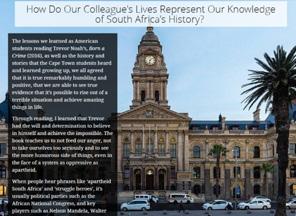
different time zones and social media interactions. The students’ online and physical worlds became a site for learning. The reports and story Maps that were created by both cPUT and UM students showed that many students’ initial reservations about communication across distance were replaced by deep engagement across difference. Ultimately, we wished to engage our students in a measure of exposure as we feel this is a way to both decolonise and to reimagine higher education spaces. We were successful in this regard, and the collaboration has produced several research outputs, namely a conference paper and a book chapter.’
the Surveying HoD flips the classroom:
Surveying students producing videos used by Civil engineering Students on Bellville Campus
in semester 2, second year geomatics students were tasked with a flipped learning environment wherein they were to produce two videos on and off Bellville campus on their civil engineering subject content.
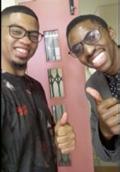
The first video was produced on Bellville campus. it aimed to identify five specific structural elements and students were to explain the purpose of their specific structure. emphasis was placed upon yjr videos as the method of assessment. The geomatics students applied themselves to the task with vigour, not only finding unique structural members amongst the buildings on Bellville campus, but explaining the purpose of these members theoretically and within the specific context of the structure. They acquitted themselves with competence by taking great effort to source freeware in producing the video and each team member participated equally in the exercise. Further there was no duplication in student content. students reported difficulty keeping the video length to two minutes and also uploading the video to the Learner Management system; however they found creative ways around the challenge.
Example of UM student’s house, mapped by CPUT student
Excerpt of a UM student’s Story Map
The better videos have been disseminated for use amongst 1st year civil students. The student narrative and simple, stylised content is proving to be very populate amongst 1st year civil students.
ACADeMIC StAFF DeVeLopMeNt
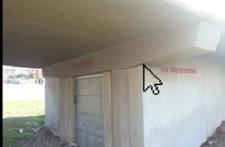
The second video was filmed off campus and required students to source a bridge and talk about the type of structure, citing among other things it constituent materials, geometric design and its uses by everyday pedestrians or vehicles or both. although a simpler task, the students had a lot of fun creating these videos as there is quite a bit of footage showing students trying to be serious but laughing through their lines. These videos are even more relatable to first year students in the civil programme. The greatest value of videos made by students for students is the student contribution to knowledge acquisition and dissemination to other students given the more relatable context. student creators also showed that their future careers can also be fun while they were learning.
Department of Clothing and textile technology: Success despite losing an HoD
The sudden passing of the previous hod in december 2018, dr elspa hovgaard, was a great shock to staff. despite that, under the leadership of the acting hod dr. asis Patnaik, the staff succeeded to manage departmental business as usual throughout 2019, by everyone pitching in with great commitment and enthusiasm. The departmental laboratory facilities have undergone a complete makeover worth r5 million, which was supported by the industry-funded ThriP research project. a new fabric manufacturing facility has been added for research and teaching activities, along with a 3d printer and a shoe scanner.
academic staff development remains one of our major imperatives, and this is accomplished through various developmental initiatives in teaching and learning, for example:
• Two of the staff members have successfully completed their TDP course via Fundani.
• Two of the staff members have successfully attended and completed an heQsF short course pertaining to their new qualification.
• Staff members this year have presented at various institutional seminars like ecP seminar, naTrc colloquium, and cPUT Technology in education day.
• Staff members have presented papers at international conferences.
• Most of our departmental staff have attended the Fundani Student Feedback on Teaching and courses (sFTc) training workshop which has given them an online platform to gather student feedback. This has encouraged our staff to present papers at international conferences as well as submitting papers for various international journals.
• One lecturer participated in the Fundani SOTL (Scholarship of Teaching and Learning) programme which is part of cPUT academic staff development.
• Dr Sweta Patnaik, a lecturer at Clotex, appears below with the Acting dean Prof Mellet Moll, and the acting assistant dean, Ms Toni stringer. dr. Patnaik is one of the winners of the departmental Teaching excellence award for 2019 in the Faculty.
Bronwyn Swartz (Industrial and Systems engineering) describes her teaching philosophy that underpins her excellence in t&L
‘The best teachers are those who tell you where to look but don’t tell you what to see.’ This quote by alexander Trenfor essentially captures my teaching practice. Thus, in all of my classes, i endeavour to create an environment that
Teaching and Learning report
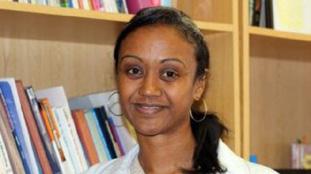
cares for students and honours what they bring to the learning space. While i undertake to be sensitive to my students’ needs and also respect the realities of contemporary south africa, i have found that deliberately placing them in a position where they experience some discomfort is an essential part of the process for authentic student-centered learning to take place. it forces students to engage in meaningful participation in the classroom and leads them to reflect on not only what they know, but also how they know it. Furthermore, it highlights the value of each student’s unique contribution to our course curriculum. Ultimately, learning is a social activity and to this end, knowing our students is key.
i believe that the best learning takes place when students have greater control over learning processes. Thus, i am mindful of the importance of my pivotal role to make this happen by crafting appropriate learning spaces (both in the classroom and online) to achieve this goal. it is my belief that i need to foster my students’ leadership abilities. This means that even though they might be uncomfortable with innovation, it leads to empowering active learning spaces that promote and encourage growth, a culture of critical metacognitive reflection, the appreciation for success and a principle of lifelong learning. one example of a project that i designed to accomplish the aforementioned was getting the students to create multilingual (isiXhosa and afrikaans) screencast videos on topics that i covered in class and then using these videos to teach other students. The results of subsequent research conducted by myself and cheryl Belford (dept of civil engineering and surveying) found that a serendipitous by-product of the exercise was that students developed cPUT graduate attributes. in this project the assistance of technology enabled me to design rich multimodal learning experiences for my students which i would have never been able to do in a completely face-
to-face environment. i am undoubtedly an advocate of the use of technology for teaching. although i am aware that technology has tremendous potential to transform teaching practices for the better, i also know that technology can never replace pedagogy – technology can only ever enhance pedagogy.
Chemical engineering First year Students “Light years ahead”
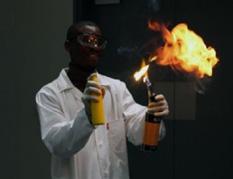
The ushering of first-year chemical engineering students into university learning has evolved significantly and culminated in major developments in student academic performance when four for top teams
The students worked in teams with lecturers mentoring them and reported back regularly in a collaborative seminar. They were given feedback during the seminars but re encouraged to work independently. “This is to inculcate a culture of independent learning, problem solving, team work and engineering design.”
tHe WAy ForWArD
in 2020, the FeBe T&L committee would like to increase the number of lecturing staff who use educational technologies in their classrooms; the team wants to successfully conclude the research project on student violence during student protests by developing an empowering faculty protocol to follow if and when violent student protests erupt on our campuses; we want to reduce the number of subjects and students at risk in order to increase our pass and throughput rates.
Dr Bronwyn Swartz, at the 2019 CPUT Teaching Excellence Award Ceremony, with her award in her hand.
Fire on all cylinders: First year Chemical Engineering Design Competition runner up successfully converted used cooking oil to biodiesel and of the department’s design competition.
4.4 FACULTY OF HEALTH AND WELLNESS SCIENCES
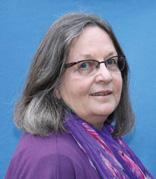
penelope engel-Hills is associate Professor: interdisciplinary health sciences and acting dean in the Faculty of health and Wellness sciences. she holds qualifications in diagnostic and Therapy radiography and higher qualifications: advanced diploma in higher education, Msc Medical Physics, dTech: radiography, and Pgdip in
Anthea pinto-prins is the Teaching and Learning coordinator for the Faculty of health and Wellness sciences at the cape Peninsula University of Technology. her research interests lie in curriculum development as well as investigating the underlying knowledge practices in south african ophthalmic science curriculum in higher education, wherein

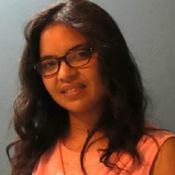
The Faculty of Health and Wellness focused in 2019 on:
• The Teaching Excellence Awards and the Teaching and Learning approach in the faculty, in alignment with clinical professions
• The role of retentions Officers in the FYE supporting the first years.
• Curriculum development and the development of new qualifications.
• The Faculty Teaching Excellent award and the development of graduate attributes.
evelopment Plan (UcdP) is to Project 2: activity 6, Teaching ds, 2018). The aim is to promote teaching at universities and also to recognize those teachers who are making every effort to improve the learning experience of the students in their classrooms. The Teaching excellence n 2019 the Faculty of health and ciences took a more inclusive approach to the Teaching excellence ds and repurposed the event to highlight all areas which improve teaching as well as the learning experience of students in their classrooms. s, workplace learning engagement, language initiatives and service learning projects were recognized. This was based on various criteria
penelope engel-Hills
Anthea pinto-prins
FACULTY OF HEALTH AND WELLNESS SCIENCES
Teaching and Learning report
including student feedback on these projects. since health and Wellness science qualifications are not only theoretical but also very practical in nature, exposing students to the workplace environment as early as possible is vital to their development and learning as future professionals. Lecturers who work tirelessly at achieving the highest form of learning in simulated and authentic workplace environments were thanked, honoured and recognized. Furthermore, research and development initiatives were recognized in the Faculty where teachers who carry teaching loads are still able to supervise and mentor postgraduate students and even make huge strides in their own niche areas of research in the health sciences. The Faculty also honoured teachers who strive towards improving their lessons with technology and effective use of the LMs, Blackboard. The highlight of the event each year remains the teaching excellence awards where lecturing staff may apply for either one of two categories namely, departmental and Faculty awards. all applications were made against set criteria of the cPUT Tea guideline (2016). in addition, the Faculty Teaching and Learning coordinator had requested that hods also nominate eligible candidates within their departments who they feel are most deserving of the award. This was implemented as a dual process and by no means excluded candidates from nominating themselves and applying directly. This dual process had seen an increase in applications which doubled in 2019 compared to 2018 and has thus proven to be an effective model.
according to the Tea guideline, cPUT aligns itself to the goals of the department of higher education and Training (dheT) initiatives by recognising, promoting and rewarding teaching excellence; enhancing the professionalism of university teachers; sharing excellent practice with the Faculty and institution; providing opportunities for further professional development and improving student engagement and success (cPUT Tea guideline, 2016). With these objectives in mind, the Faculty of health and Wellness sciences (FhWs) has aligned itself to the institutional vision of promoting teaching excellence. The Faculty has made Teaching excellence
awards annually since 2015, and in 2019 the Faculty decided to expand on this vision by recognizing other achievements in research projects, work integrated learning, language, teaching with technology and community engagement projects which all contribute to improving teaching and learning.
The Teaching and Learning day was held on 21 november 2019 at the cape Town hotel school, cPUT. Videos, peer education and online platforms are just some of the innovative tools the excellent teachers recently honoured by the Faculty of health and Wellness sciences use in their classrooms. a number of outstanding teachers were honoured during the Faculty’s annual Teaching excellence awards. Five departmental winners were recognised while r yan Matthews from the department of emergency Medical sciences (eMs) scooped the overall Faculty Teaching excellence award.
retention officers assist in Teaching and Learning –a UcdP student development initiative
retention officers fulfil a valuable function as mediators between students and teaching staff which aids student feedback on teaching and also provides the Teaching and Learning office directly with challenges which our students face. The role of ros is not only to serve mainstream students but also to assist ecP (extended curriculum Programme) students with the help they require in order to cope with the high demands of first year (see comment from one of the ecP coordinators below).
“access to counsellors, academic literacy, more space in residences, nsFas card for food, etc. access to mentors and tutors … tracking of students post ecP 1 and 2 is difficult as even within cPUT there is no personal history available when you track ex-students that moved to other courses. ros are an immense help after we identified the at risk-students” (First Year coordinator: department of dental sciences). retention officers are responsible for retaining or keeping current first year students at the FACULTY OF HEALTH AND WELLNESS SCIENCES
university. Their role is to prevent first years from dropping out of university or in the worst case scenario, harm themselves because of challenges they may encounter during their experience at university. ros assist by keeping track of class attendance and also monitor and report on assessment results, offering students social and academic support and providing them with advice to boost progress and success. ros work closely with various support structures of cPUT such as counsellors, lecturers, resident management, finance department, student welfare, health centre, etc., in order to create effective student interventions where necessary. in effect, ros act as a go-to resource for first year students. This way they are able to identify students at risk of failing specific modules which most students struggle with and intervene where necessary and try to find possible solutions for the challenges.

Ms dephney Motshwari and Mr Lwando Mampunye were appointed in the Faculty of health and Wellness sciences from February to november 2019.
For the first time ever, the Faculty TL office and ros arranged a First Year experience symposium held on 27 september 2019. The symposium was the Faculty’s response to a call from our first year students who are grappling with pressing issues which were covered and was a success. The Faculty intends to host this symposium annually to continue the drive towards social justice, student mental health and well-being and action against gender-based violence.
Faculty of health and Wellness sciences attributes much of its success in curriculum development in 2019 to the Qualification evaluations committee
in February 2019, a sub-committee of the senate academic Planning committee was formed, called the Qualifications evaluation committee. a shortcoming was realized in that when it came to the heQsF alignment and qualifications, and it was noted that a more inclusive and clear process needed to be in place. at a discussion forum held between teaching and learning coordinators, curriculum officers, members of Fundani curriculum development Unit, head of academic Planning and the dVc: Teaching and Learning, pertinent questions were raised such as how we process qualifications at cPUT and who processes it before it comes to the aPc. after some lines of questioning it has also become evident that a clear vetting and tracking system was necessary.
Ideology of the QeC:
• Think h olistically t o t ry t o d evelop a s ystem i n p lace t hat w orks w ell. F or all qualifications at cPUT, all faculties are represented on the committee. People must know what the trajectory is and where the document can be tracked so that we plan in time for the che submission dates.
• Evaluators w ill n ot e valuate t heir o wn p rogrammes a nd i n t hat w ay w ill build a community of practice amongst colleagues at cPUT.
• More t raining o f e valuators t o m ake s ure t hat a ll e valuators a re o n t he same page as to how qualifications should be processed, thus putting systems in place for continuity
• Ensure robustness t he w ay w e g o a bout p rogramme/ q ualification evaluation to ensure concrete curriculum submissions to the che.
The Faculty of health and Wellness sciences is well represented at the Qec with its assistant dean, Teaching and Learning coordinator and one of the curriculum officers who serve as evaluators of qualifications. Much of the success in curriculum development can be attributed to the curriculum
From Left: Dephney Motshwari (RO), Mziyanda ndede (grant officer, Fundani) and Lwando Mampunye (RO)
development Unit (cdU) at Fundani, the centre for innovation and Technology (cieT) and also the newly formed Qualifications evaluations committee (Qec). This committee has proven to be a strict vetting tool for strengthening and enhancing the quality of qualifications which are submitted to the che, thus mitigating the risk of declined submissions.
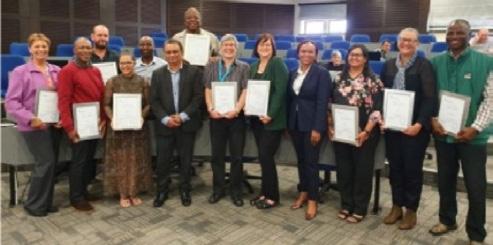
The Qualifications ommittee’s reviewers were awarded certificates in recognition of their important contribution to the quality review of new higher education Qualifications subFramework-aligned qualifications.
deputy Vice-chancellor: Teaching & Learning, Prof rishidaw Balkaran, awarded the certificates at the last Qualifications evaluation committee (Qec) meeting which was held recently. Balkaran commended them for the excellent work they did in 2019.
a total number of 26 new qualifications were processed for offering in 2021. The Qec is a working committee to assure the quality of new programmes that will be submitted to the council for higher education for accreditation or applications sent to the dheT for the approval of extended curriculum programmes. it will also ensure that the policy implementation is consistent with the university’s quality standards and requirements for the curriculum.
Teaching and Learning report
Meet the Faculty Teaching excellence awardee for 2019: Teaching in real World contexts
The department of emergency Medical sciences is dedicated to the education of medical professionals who will provide prehospital emergency medical care in emergency situations. The aim of the program is to produce graduates who are not only able to perform the daily tasks necessary for rendering emergency Medical care (eMc) but who possess the attributes of innovation, independence, integrity, leadership, and autonomy.

Mr ryan Matthews, Faculty awardee of the Teaching excellence award, aims to produce confident and capable graduates who enter the profession to provide for the healthcare needs of some of the most vulnerable patient pop-plays a big role in my teaching context, and i make an effort to make the hidden visible, says Matthews.
Placing emphasis on graduate attributes in teaching context
The working environment and vulnerable patient population directly influences who emergency care practitioners need to be. additional emphasis is placed on the attributes of the graduate as well as on the responsibilities of the educators. in a defined and regulated profession like emergency Medical services it is easy to concentrate and focus on factual knowledge, skills and procedures, with outcomes, teaching and assessment emphasizing the cognitive and psychomotor domains. The affective domain is frequently neglected and it is this which often presents the greatest challenge. The need to address who graduates are, along with what they know and can do (knowing, doing and being) underpins my teaching philosophy and methods. The ‘hidden curriculum’ with very limited or non-existent patient information. This calls for graduates who are consistently able to operate in an environment
hOnOUr: Deputy Vice-Chancellor: Teaching & Learning, Prof rishidaw Balkaran (fourth from the eft), awards certificates to reviewers of the university’s Qualifications Evaluation Committee for their contribution to the quality review of new qualifications.
Ryan Matthews during rescue lesson
full of unknowns. Problem-solving abilities, as opposed to answer-finding techniques, are required.
Learning how to solve real world problems in real world contexts
reflecting on his own time in the workplace, coupled with some very honest appraisal of his own teaching practices, r yan moved away from a contentbased style to one of problem-solving. ‘This after all what i ended up doing as a practitioner, and it is eventually what i saw successful learners doing during class. excellence in teaching in my field means developing learners’ ability to “work things out”, to manage situations rather than provide answers’. The prehospital field has unique challenges. emergency Medical care practitioners frequently work at the limits of their knowledge. Uncontrolled, chaotic and dangerous working environments are a feature with very limited or non-existent patient information. This acll for graduates who are consistenatly able to operate in an environment fll of unknowns. Problem-solving abilities, as opposed to answer-finding techniques, are required.
graduates need to learn to solve a problem, rather than find an answer
Upon realizing that his real job was to create opportunities for learning, build an enabling environment, and provide guidance, things began to ‘click’. The specific incident which brought him to this realization occurred in 2015, while they were busy with the study unit on advanced obstetrics (child-birth). They had simulated a scenario in the back of an ambulance where the delivery of a newborn was obstructed in the birth canal. ‘i wanted it done in a certain way. one of my mature learners, who had some ambulance experience turned to me and said that by positioning the patient differently on the stretcher the delivery would be better managed in that context. i allowed her to continue, working things out as she went along until the exercise was complete. This was a simple maneuver, not found in any textbook, which improved a specific situation.’ This is when
problem-based learning began to make sense to me and i began to explore the work of david Kolb and experiential Learning Theory. Treating learning interactions as ‘experiences’ rather than lessons, and designing learning such that learners with differing learning styles, cultures and varied prior knowledge are exposed to different opportuntites to gain the experience (lesson) and have more than one method available to them in order to turn that experienvce into knowledge.
Matthews makes use of Blackboard as a method in his teaching and learning. To enhance the explicit and standardized outcomes, he has created a series of reading guides for each study unit. These are uploaded to Blackboard in advance of each study unit. These contain links to prescribed readings, links to videos and podcasts and key definitions which are all mapped to outcomes. Where readings and references are not freely available he will then upload these to Blackboard. it acts as a very detailed subject guide and collects all the content and resources in one place, allowing learners not only to map their progress, but either to catch up if they fall behind or read ahead if they are faster learners.
Using the experiential Learning Model, and being dependent on reflection on past performance and mistakes, it may be easy for learners to become embarrassed or feel silly when either doing the practicals, discussing the case in groups or uploading comments to the discussion board. For this reason, the learners decide on ground rules for the class at the beginning of the year. These ground rules determine the tone and manner in which the class will be conducted. additionally, at the beginning of each case, it is emphasized that everybody is learning, and the point is to make mistakes. This creates an en vironment in which learners realize that fallibilities are being exposed for the purposes of reflection. That their classmates are as vulnerable as they are and that the point is to dare to make mistakes. as a result, a safe and respectful environment ensues in which learners are feel comfortable in front of classmates, whether this be at the desk, in the laboratory or online.

Environment showing students working in context
Simulated Classroom
Teaching and Learning report
4.5
FACULTY OF INFORMATICS AND DESIGN
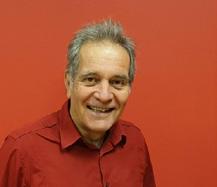
Johannes Cronje is a professor of digital Teaching and Learning and has been the dean of informatics and design since july 2007. he holds a Masters and a doctorate in Literature and a Masters’ cum Laude in education. he teaches academic Literacy at first year level, as well as research Methodology to postgraduate students. Prof cronje has supervised or cosupervised more than 150 post-graduate students and has published more than 64 academic papers in peer-reviewed journals. he holds a c1 rating from the national research Foundation.
Bennett Alexander is an associate professor and the assistant dean of informatics and design. he holds a doctorate in information Technology and a Masters in Technology and human resources development. he also holds a degree in electrical engineering and is a registered professional engineer. he has spent his career of 35 years at cPUT holding various teaching and research positions and has a passion for education and community development projects.


Mr pieter rossouw, informatics and design Teaching and Learning coordinator
My academic career started as a lecturer at the cape Technikon in 1995. i taught various subjects until 2010 when i became the Teaching & Learning coordinator in the Faculty of informatics & design. This year represents my 26th year at the cape Technikon/cPUT. My qualifications include a Bachelor honours in counselling Psychology (stellenbosch University) and an MTech in education (cape Technikon). i am currently
working on my Phd in education at stellenbosch University. The title of my thesis is ‘game-based diagnostic assessment of persistence and problem-solving of first time entering university of technology students’. My teaching philosophy: ‘education is about enabling learners to develop their potential, unlocking their innovation and creativity to build an improved, sustainable and equitable world’.
FACULTY OF INFORMATICS AND DESIGN
The Faculty report focuses on:
• Introduction of the hEQSF-aligned qualifications and an ‘extreme subject makeover’
• Co-teaching in some departments
• Staff development and student centeredness
• Development of new academic attire using problem based learning
• Departmental highlights including jewellery award-winning student, to media students at the Cape Town International Jazz Festival, IT students raising funds, and town planning students in informal settlements.

teACHINg AND LeArNINg DeVeLopMeNt
The Faculty has placed a strong focus on the development of both teaching and learning strategies over the past year. With the higher academic environment that constantly poses a challenge, much of the focus was placed on development of a blended learning approach. The LMs system Blackboard has been the major resource for interaction with the students. The blended teaching approach was combined with a focus on learning styles of the students in the Faculty of informatics and design.
nother successful T&L development initiatives that has been implements o-teaching has long been recognised as a teaching method that benefits students in the learning and engagement in class. This has proven to be very successful, particularly for students in the more practical classes. This form of teaching will be further
o accomplish the teaching and learning outputs that were set as goals, the staff in the faculty engaged in various staff development initiatives. one of the more popular development programmes was assistance in developing blended learning as a teaching style. This includes understanding and application of the cademic staff were supported by the ducational Technology (cieT).
taff development is ongoing. This is in the pursuit of developing and adapting uring the academic year of 2019 the last of the old curriculums were phased out. it was also the last year for the enrolment of the BTech offering with only a few students remaining in the pipeline for 2020.
although most of the three year diploma courses are now in their third year of offering, most were recurriculated during the beginning of the implementation of the new nQsF framework. The departments are now in the process of reevaluating these progammes in preparation for making improvements. This was mostly driven by the call for decolonised education and the fast-changing world of technology.
departments were also developing the syllabus for the implementation of the advanced diploma across the faculty in 2020.
StUDeNt CeNtereDNeSS
More to the point of teaching and learning was the practical implementation of the various projects that were directed towards developing the graduate attributes cPUT strives towards. What follows is a snapshot of various of these initiative in the different departments.
DeSIgN DepArtMeNt
The focus of Teaching and Learning in the design department is on innovation, practice and sustainability. students engage with industry, complete PBL projects and are exposed to co-teaching for improved learning needs.
The second year fashion design students of 2018 were commissioned to design new academic attire for the university. This project came to completion in their third year, 2019. The class was divided into small think tanks. each of these small groups researched and developed designs. The images on the right represent the four key inspirations that came from this project and form part of the final design: ndebele patterns, the south african r20 note, Zulu beading, the king protea. The individual components that sprung from these inspirations were designed by the students and brought together by lecturers to form a coherent and collective design that is flanked on both sides by the waves in the cPUT logo. This pattern represents cPUT as an institution that embraces diversity.
New academic attire at the launch in December 2019
Student group: Fashion third years 2019
The Product design programme created jaM weeks. jaM weeks were developed in response to specific student needs. staff felt that these needs would best be addressed in a concentrated week long workshop format. This was piloted in 2018.
Teaching and Learning report 2019
in 2019 each term now has a jaM week for each level of the undergraduate programme. examples include creativity and detail focus, software skills training (e.g. indesign/ Photoshop/ solid works/ illustrator), video editing, arduino. another example of student centred learning is the elective term for Product design 2nd and 3rd year students. The students are able to choose from several elective options, according to their area of interest. examples include label design competition, PPc concrete competition, slip casting bird homes, accessories for nissan go (industry driven).


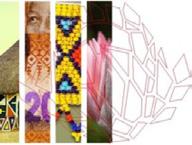
here are a few class pictures during these projects: FACULTY OF INFORMATICS AND DESIGN
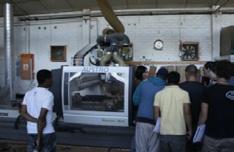
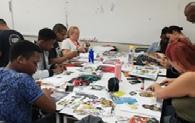
Co-teaching for improved student learning needs:


The design department also included special events such as:
• Arranging events with leaders in the design field
• Factory and industry visits across all disciplines
• Guest speakers and industry specialist to address learners
• Entering industry and other competitions
• And more


Fashion students attending the Fashion revolution hosted by the Fashion programme with Twigg and the sa Fashion revolution team. This is to commemorate the collapse of rana Plaza, a clothing factory in Bangladesh where over 2000 workers died. students took part in making a video about what it meant to them and the future of fashion. This project promoted social engagement, and ecological and sustainability awareness.
CpUt Media Cape town International Jazz Festival
• Collaboration with the Cape Town international jazz Festival (cTijF)
• Joint venture in the form of a Skills Transfer and Work integrated Learning (WiL) programme
• Affords students an opportunity to gain real life practical skills
• The experiences include marketing activation and promotions, social engagements and social media
• writing stories and biographies, doing interviews, designing and print marketing material, taking photographs, creating videos, and garnering publicity
CpUt Media – Wp rugby
• Students worked with Western Province rugby on a collaborative project
• Community outreach
• Students worked with a range of stakeholders to produce a curated collateral
the collaborative collateral included:
• Digital content creation
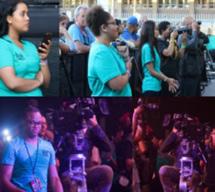

The focus of Teaching and Learning in the department is on innovation and practice. students are given every opportunity to put into practice what they learn at diploma level. some of the projects in the department are listed below.
• Social media
• Video production
• Vox-pox and Doccie footage
• Publications
• Media Management
FACULTY OF INFORMATICS AND DESIGN
Jewelry student Mfundo Nondyola Winner of plat Africa Competition in 2019
MeDIA
CpUt Media Carel Du toit
• Community Outreach
• Students manage activities from start to finish advanced diploma)
• Students raised a total of R64 074 for the ngo
• Checkers Canal Walk allowed students to raise awareness of the ngo and have a collection trolley for groceries and consumable donations at the entrance of their store
• Students filled 22 boxes of goods
• Created awareness of the NGO and the food drive through radio (goodhope FM prime time; eTV news, smile FM and Bush radio) and published in various print and online publications.
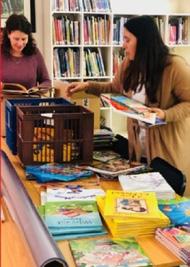
INForMAtIoN teCHNoLogy

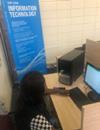
The focus of Teaching and Learning in the department is on practice, collaboration and innovation.
in 2019, iT students were tasked to create relevant videos as part of the Multimedia and creative technology sector.
• Animation based videos depicting various aspects of health related ailments
• Included illnesses such as cancer and diabetes
• Created for the Motsepe Foundation and were related to a project titled: Precious little black book
This collaboration with the Motsepe Foundation will continue in 2020.
FACULTY OF INFORMATICS AND DESIGN
Teaching and Learning report
ALterNAtIVe teACHINg MetHoDS (FIrSt yeAr)
• Students lead discussions of particular themes
• Lecturer being a ‘moderator’ instead of the expert
• Students feel listened to, empowered and confidence
• levels improve
CoMMUNIty
SerVICe-LeArNINg INItIAtIVeS
• Improved layout of the Informal settlement
• Assist communities within informal settlements to achieve communityowned and driven development processes
• Evaluated sites and develop timetables for the mapping and improvement of the settlement
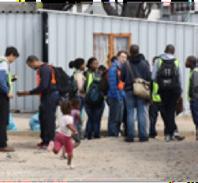

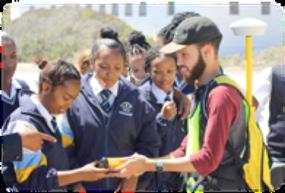
ArCHIteCtUre AND INterIor
The focus of Teaching and Learning in the department is on practice, collaboration and innovation.

4.6 FACULTY OF APPLIED SCIENCE

prof Joseph kioko is the acting dean of the Faculty of applied sciences and holds the substantive post of assistant dean. he has been teaching in higher education for about 25 years, during which he has worked at all levels, from that of Tutor to the rank of dean; and has been involved in activities ranging from teaching to accreditation of Programmes for both south africa’s and namibia’s councils on higher education. he holds a Bsc hons in Forestry, a Bsc hons (cum laude) in cell Biology and Phd in Biological sciences. his research focuses on biodiversity conservation: an area in which he has successfully supervised postgraduate students and published peer-articles, garnering a h-index of 13 (google scholar), with 587 citations.
INtroDUCtIoN
The Faculty of applied sciences strives towards its vision to be the faculty of choice for science and technology education in africa. The mission reflects this, with the aim to use excellence as a touchstone in its teaching and learning, its research and its technology transfer application to produce graduates who are knowledgeable, employable and responsive to ever-changing societal needs.
as the university attracts a broader cohort of students, the faculty has had to quickly adapt to changing student requirements in terms of learning styles and engagement. in this regard, the faculty has placed further emphasis on student-centredness. Teaching and learning activities are designed with the student in mind, and cater for a broad range of learning needs, all contributing to a holistic science education, with social responsibility, good citizenship, deep knowledge and employability as pillars. Learning is approached as multi-modal, with all teaching and learning activities taking cognisance of student needs.
an overview of student-centredness source: https://bindersandbeakers.wordpress.com/teaching-philosophy/
tholang Maqutu is the Faculty of applied sciences curriculum and academic development coordinator. Tholang is a seasoned higher education science curriculum studies practitioner and scholar. his research interests include school and higher education curriculum studies with a particular bias towards relevances of curricula to the needs students coming from marginalised sectors of the population.


FACULTY OF APPLED SCIENCE
over the course of 2019, this vision and mission was embodied in the excellent practice of teaching and learning that were on display. Many academics in the faculty have shown innovation in the face of changing student, societal and institutional needs, and have been duly recognised. a few highlights from the year:
• Certificates of Excellence were awarded to two staff members, in recognition of outstanding practice in teaching and learning.
• A number of knowledge exchange platforms were created between applied sciences at cPUT and international institutions, the fruits of which have been mutually beneficial, with aim of continuing for the foreseeable future;
• Excellent and innovative curricula are core projects in the faculty. In this regard, reflections on a new and one-of-a kind advanced diploma in Landscape architecture are described, as well as a much-needed short course in Turfgrass Management.
• The faculty has been involved in a number of pertinent service learning projects, practiced by all departments. one such project was aimed at empowering fisherwomen in a local fishing community. This activity, tied to social awareness in student learning, is a standout feature in the engagement between the institution and wider society.
• Rising above challenges in the teaching and learning environment, and implementing innovation in response, represents the dynamic nature of academic practice necessary in the faculty. one example is presented here, in which the concept ‘linguistic difficulties’ in the faculty was reimagined as ‘linguistic resources’, and a pedagogy implemented to recognise diverse repertoires, honour cultural legacies, and draw upon indigenous knowledge in the creation of biotechnological concepts that are central to the curriculum.
• The faculty is diligent in supporting student learning through the application of institutional and national Language Policies. in this regard, an example of content-language integration is presented, where the content lecturer and subject expert works closely with the faculty’s Language coordinator to strengthen understanding and develop language interventions to support academic literacy.
Teaching and Learning report
reCogNISINg teACHINg AND LeArNINg exCeLLeNCe
in keeping with excellent teaching practice, the Faculty of applied sciences values initiative, and rewards academics for implementing novel and best practice to deal with changing student needs. on 5 december 2019, two academics were duly recognised for their contribution to teaching and learning. Ms raché hanekom from the department of Biotechnology and consumer science and Mr andrew rand from the department of environmental and occupational studies were honoured with departmental and faculty Teaching excellence awards, respectively. These accolades are competitive and coveted in the faculty, and encourage fellow academics to strive for excellence in their academic practice.
Ms hanekom’s teaching philosophy embodies dynamism, as she reflects: ‘For me, there is no “constant” in teaching; whilst the curriculum (in its core) may remain the same, the student cohort and therefore the teaching and learning environment will change from one academic year to the next. each academic year is a blank canvas with potential to find innovative teaching methods to cater for the different class sizes and students with different learning styles, intellectual capacities and personalities.’ she is a champion of the blended learning approach, noting that ‘if we as educators expect students to be creative and innovative thinkers, students should expect the same from their lecturers. We are moving towards an era of blended learning. We, as educators, cannot stay on the same path if our students are ahead of us in terms of technology. i believe that blended learning requires the presence of both lecturer and student, but i do realise that how academic aims and objectives are reached may be directed by our future student cohorts. i am excited about this new platform and will boldly embark on this virtual journey with my students.’
Mr andrew rand’s approach is to focus on student professional development. he achieves this by teaching a critical subject that seeks to ready students for the work-integrated learning experience. his aim is to get students to deepen empathetic reflective practices within the context of the environmental Management discipline, thereby achieving the core graduate attributes of social responsibility and good citizenship. he describes his practice: ‘i have
an evolving understanding of teaching excellence that consists of my actions and teaching activities that are centred on the nexus of student reflection (in written and verbal format) on the subject and discipline specific attributes that result in the student being empowered to express ethical professional practice in the workplace (and study environment).’
The Faculty of applied sciences is proud of such achievers, and wishes our colleagues well in their practices. We hope to draw from their expertise and best practice in motivating others to adapt and enhance pedagogies.
FoSterINg kNoWLeDge pArtNerSHIpS For CULtUrAL AWAreNeSS AND teACHINg ADVANCeMeNt
a number of collaborative initiatives were active in the faculty, an example being one between the department of horticultural sciences at cPUT and associated departments in germany and italy, to foster knowledge exchange and to expose students to best practices in europe. student exchange partnerships have been ongoing with the University of applied sciences, hochschule, germany, where selected students of Landscape architecture from both institutions spend time at each institution. Both institutions have realised the value of this partnership to the teaching and learning project, and are committed to continuing this association in the years to come.
Three staff members from the department of horticultural sciences participated as scientific committee members in the evaluation of the Urban Landscape Project which was hosted by the University of Bologna, italy.
a collaboration visit by University of applied sciences, osnabruck, germany, to cPUT took place from 18-30 october 2019 with two professors and 9 students from undergraduate, honours and masters levels visiting. The collaboration was coordinated by the centre for international Mobility at the University of applied sciences, germany. Workshop interactions were held with two groups of students from both universities. These included site visits, project design and implementation of a south african cultural landscape integration project. The
visitors were also treated to a cultural evening hosted by the department of horticultural sciences. students and staff from both universities participated in the Futurescape africa conference held at the cTicc on 25 october 2019.
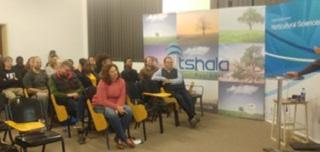
and
CPUT
MeetINg SoCIetAL NeeDS tHroUgH SHort CoUrSeS: tUrFgrASS MANAgeMeNt
The department of horticultural sciences held a 3-week Turfgrass Management short course in july, august and september 2019. The course was attended by 21 students from Zambia, namibia, gauteng and the cape Town region. Lecturers comprised mainly industry specialists who shared their valuable time, passion, industry knowledge, expertise and practical contributions with the students, as well as opening up their places of work for students to visit.
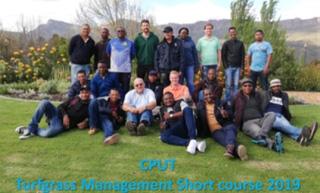
Participants at the completion of the Turfgrass Management Short Course, hosted by the Department of Horticultural Sciences
Feedback from the three module short course consisting of both practical and theoretical components was found to be very informative and students left having indicated that they had gained newfound knowledge, techniques and methods. They also shared that the active participation, advice and guidance of lecturers and fellow participants were very valuable and provided a supportive network to aid them in their place of work.
specific mention with regard to the last module held in september must be made
OF APPLED SCIENCE
Staff
students of
engage with collaborators from University of Applied Sciences, Hochschule, Germany.
FACULTY
with having to make alternative arrangements and changes at the last minute due to the protests against gender-based violence. The teamwork, support and understanding of various suppliers, industry lecturers, departmental staff and students to accommodate the sudden changes was overwhelming and everything worked out in the end.
The short course has provided a platform to engage with students of different ages, levels of management and work experience and has contributed to their educational and social skills within the industry environment, supporting the idea that one is a student for life. The short course has clearly demonstrated the giving back and sharing of expertise with students which makes student and industry collaboration, networking and building so vitally important.
INNoVAtIVe CUrrICULA to Meet tHe CHANgINg NeeDS oF INDUStry
The department of horticultural sciences is glad to have completed the first offering of the diploma in Landscape architecture in 2019. Landscape architecture has been identified as a scarce skill within the built environment of south africa listed in the government gazette. The landscape architecture profession has been mandated to transform itself to incorporate formalising qualifications and professional registration with statutory bodies. This is the only diploma offered in south africa in this field and linked to the south african council for the Landscape architectural Profession (sacLaP) which is mandated to accredit all tertiary academic qualifications in the Landscape architecture. sacLaP identified an imbalance in the ratio between professional landscape architects and professional landscape technologists. There is a significant demand in private practice for registered professional landscape technologists. going forward, the advanced diploma in Landscape architecture will be offered from 2021 to advance the level on the learning field, and to provide further opportunities for articulation into higher qualifications.
Teaching and Learning report
oFFerINg VALUABLe SkILLS For eMpLoyABILIty
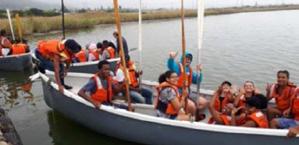
The department of conservation and Marine sciences believes that field trips are crucial in enhancing students’ learning, and in providing the experience and skills that make its students employable. a boating practical class sets out to provide students with basic seamanship and small boat handling skills, making use of dinghies provided by the south african sea cadets at Zandvlei. students learn how to launch, row, handle and retrieve small boats, what knots to use in different circumstances, and correct boating terminologies. This sets them in good stead for the world of marine conservation.
eMpoWerINg FISHerWoMeN tHroUgH FooD SCIeNCe AND teCHNoLogy
The Food science and Technology department was approached by abalobi, a registered non-profit organisation (nPo 191-303), to train fisherwomen in the development of goods manufacturing, hygiene, food handling and safety practices. The nPo seeks to empower small-scale fishing operations in south africa, through highlighting issues around social justice, poverty alleviation, transformation, knowledge production and ecological responsibility.
Under the guidance of dr suné henning, the Food science and Technology ecP students prepared to conduct a service learning project that was aimed at empowering primarily fisherwomen to improve their fishery products and ensure quality in order to meet market standards outside of their local communities. The project, which is ongoing, involves ecP students who
Students on a boating practical, to learn the basics of seamanship
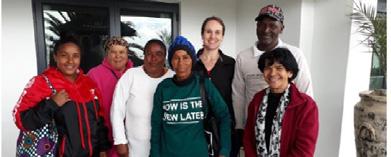
were trained in a variety of modes to effectively work in and communicate, by overcoming language and social barriers, with local fishing communities, particularly fisherwomen. The community feedback of this initiative has been very encouraging, with relevance to the everyday work of the community being a highlight. This is proving to be an exemplary service learning initiative, and the collaboration is due to continue in the coming years. dr henning is congratulated on her sterling work in raising student awareness of social responsibility, whilst drawing on content knowledge from the curriculum. such a holistic approach to teaching and learning is the standard to which all academics should strive.
HArNeSSINg LINgUIStIC DIVerSIty IN A BIoteCHNoLogy CLASSrooM
The Biotechnology department has implemented a number of novel and innovative pedagogies to enhance student engagement with the discipline. recognising the linguistic diversity in the classroom, associate Professor Muhammad nakhooda has been implementing a unique approach to multilingual learning in a science field. it is a pedagogy that harnesses the collective linguistic repertoire of the students and uses that to get students, in a peer-led manner, to create understanding of core concepts in whichever language is dominant in their minds. Using this conceptual understanding, academic and discipline literacies are subsequently built. This approach has arisen out of a need to include multiple home languages and varying degrees of english proficiency in the Biotechnology classroom. Prof nakhooda, a TaU (Teaching advancement at University) Fellow has been, through invitation and submission, presenting his work at a number of academic gatherings, such as the U6+ consortium
of african Universities conference in calabar, nigeria in september, stellenbosch University’s scholarship of Teaching and Learning conference in november, and the south african higher education Learning and Teaching association of south africa (heLTasa) conference in december. he was also invited as the Keynote speaker at the cPUT Teaching development Program annual certification event, where staff new to cPUT are inducted into the scholarship of good teaching and learning practice.


The faculty’s Language Unit, headed by the Language coordinator dr ignatius Ticha, has been dedicated in promoting a culture of reading among students. an annual reading quiz was organised with 15 teams participating from all academic programmes in the faculty. student feedback on the quiz has been exceptionally positive and the quiz generates an overwhelming sense of excitement about reading. This initiative undoubtedly enthuses students to make reading (both academic and non-academic) a life-long mission. The quiz was won by students from the department of environmental Management.
reADINg QUIZ 2019
Dr Suné henning (third from right) with the fishing community of Weskusmandjtie at St. Helena Bay, Western Cape.
Prof Muhammad Nakhooda (left) with former South African Public Protector, Advocate Thuli Madonsela, at the Stellenbosch University Scholarship of Teaching and Learning Conference, 2019.
Students from Environmental Management take part in the Annual Faculty reading Quiz
DeCoLoNISINg tHe CUrrICULUM tHroUgH CoNteNtLANgUAge INtegrAtIoN IN CoLLABorAtIoN WItH BIoteCHNoLogy
Through collaborative teaching of the communication skills/academic literacy module and the scientific content in the subject immunology in the Biotechnology programme, meaningful connections were made between the science and the literacies that surround it. applying elements of integrative teaching and learning approaches ensured the effective acquisition of a range of academic literacy skills, and placed the course at the centre of the academic endeavour in the Biotechnology programme. The themes and topics covered were familiar experiences to a majority of students, but also relevant to the discipline of immunology. Using examples of the use of traditional medicines to treat diseases, students were encouraged to write about personal experiences, and debate topics around its prominence, effectiveness and value in the south african and broader continental context.
students were introduced to the practice of writing a reflective narrative, encouraging creative writing, and distinguishing the style from that of the discipline literacy. creative writing gave students agency to explore different writing styles, and to reflect on their voices, which is a novel approach to literacies in a scientific context.
Furthermore, the language interventions designed by dr Ticha and the content lecturer in immunology, Prof Muhammad nakhooda, aimed at raising awareness of the multitude of cultures and languages that are represented by the staff and students at cPUT. as an exercise in scientific communication for the wider audience, students developed digital stories around a given topic in Biotechnology, creating complicated and rich narratives in their home languages, with english subtitles for the wider global audience. in this way, students appreciated the value and position of the home language in science communication. active multilingual registers were a corollary, a project that will continue in the years to come.
Teaching and Learning report
students from the department of Maths and Physics carried out a great service learning project for high school and matric pupils, preparing them for exams. The students offer an online maths tuition service on Facebook, fielding queries at all hours, since the service is always available. The feedback has been very encouraging, and the service is proving to be of great value to high school learners.

students from the consumer sciences Program, in the department of Biotechnology and consumer sciences are given the opportunity of learning culinary skills online, through tutorial videos. staff members in the department have created an online portal to enhance learning by making practical lessons available that are visually engaging. The initiative has proven very successful, and plans are underway to have this expanded.

CoNCLUSIoN
These are just some of the many excellent teaching and learning practices that are ongoing in the Faculty of applied sciences. academics are constantly encouraged to be responsive to student needs, empower themselves through skills development training offered by cPUT and other service providers, and implement best practice in all tasks. The faculty looks forward to not only continue on this trajectory, but to improve on current practices in order to meet the objective of being the faculty of choice for science and technology in africa.
NotABLe oNLINe LeArNINg prACtICeS AND SerVICeS
Maths tuition using Facebook
F U n dani c e n T r e F o r
h i gher e d U c aT i on d e V e L o P M e n T

5.1 e x tended c u rriculum Programme ( e c P )
5.2 c u rriculum d e velopment Unit ( c d U )
5.3 a c ademic s t aff d e velopment ( a sd )
5 .4 r e cognition of Prior Learning ( r P L)
5.5 s t udent Learning Unit ( s L U)
5.6 L anguage Unit
5.7 he LTa sa
Teaching and Learning report
5.1 extended curriculum Programme Unit (ecP)

Dr Mashiyi has extensive teaching experience in initial Teacher education (iTe) and teaching and learning in higher education. her current research interests are in student academic support, language education and teaching and learning in higher education.
INter-INStItUtIoNAL HIgHLIgHtS
a partnership was first initiated in 2018 between UWc, sU, UcT and cPUT but was firmly established in 2019. The primary aim of the regional partnership was to strengthen and showcase ecP practice in the Western cape and the partnership has since proven hugely successful in promoting the scholarship of teaching and learning amongst ecP practitioners. The following are significant highlights related to the partnership, namely:
Inter-institutional regional lunchtime seminars
seminars were hosted once per term to showcase ecP best practice: UWc’s seminar on transitions in mathematics in the Physics department; stellenbosch University’s seminar on valued-added initiatives in ecP; and the cPUT seminar on dialogical engagements in clothing Technology.
Inter-institutional regional eCp symposium
Previously each institution in the region hosted separate symposia; presentations focused on the following broad themes: technology-enhanced teaching, student engagement, and curriculum reform. Prof ogude who is dean of ecP at UP (Mamelodi campus) presented the UP ecP model and shared UP ecP successes and challenges.
Inter-institutional Writing retreat at Mont Fleur
ecP lecturers from the three institutions were invited to submit abstracts and participate in the Writers’ retreat hosted in october at Mont Fleur. These were mainly lecturers who had presented at the regional ecP symposium. Their participation was aimed at encouraging them to publish scholarly papers on their research and strengthen their research skills. Their participation was aimed at encouraging them to publish scholarly papers on their research and strengthen their research skills. Most of the participants at the retreat wre from cPUT. Facilitators at the retreat where chosen from partner institutions in the Western cape.
INStItUtIoNAL HIgHLIgHtS
Co-facilitating digital storytelling (DSt) workshops
dsT workshops were hosted in collaboration with the centre for innovative educational technology (cieT) and ecP Unit to ecP academic staff in the Faculties of applied sciences, engineering and the Built environment, and health and Wellness; some attendees from stellenbosch University were also present. dsT was used as an approach to reduce and mitigate learning bottlenecks and teach threshold concepts in content subjects.
Coordinating information sessions
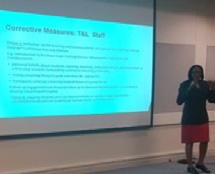
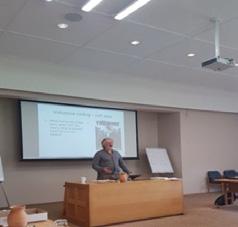
The ecP Unit was instrumental in coordinating sessions focused on understanding the student profile at cPUT, which included interrogating the nsc vs nBT results.
One of the presenters at the Writing Retreat - Prof Garraway
presenting at the institutional academic staff induction Coordinators.
The engagement is closely aligned to the Unit’s key-accountability of advocacy by promoting ecP principles and ethos across institutional structures. engagement was intended to start a broad conversation related to critical ecP matters.
Application submission of new/modified qualifications to DHet for eCp enrolment
The ecP unit assisted the departments of accounting, sport, Marine and nautical engineering to submit applications to dheT for permission to enrol ecP students onto the existing regular/mainstream qualifications.
submissions were made by the ecP Unit in september 2019 and the preliminary dheT feedback received in december 2019 indicates that the funding has been approved pending changes.
academic staff induction sessions are hosted twice a year by the academic staff development Unit to induct newly appointed academic staff into the institution. The ecP Unit features on the programme and the session is an integral opportunity to introduce ecP Unit and the ecP offerings at cPUT.

Departmental site visits
Working closely with the faculty and programme ecP coordinators the ecP Unit is able to engage meaningfully with ecP departmental staff to discuss pertinent ecP related matters. issues discussed included staffing, student behaviour,
Challenges
• Ongoing departmental staffing issues related to the renewal of short term contracts and slow conversion of contract posts to permanent appointments.
• Issues with reporting on departmental activities and actual tranche spend in departments.
• ECP Unit capacity was under severe strain between January and June 2019 as there was only one staff member attending to institutional ecP matters.
• ECP Unit is yet to appoint a dedicated financial INter-INStItUtIoNAL tDp CHeC CoUrSe For
The partner institutions have collaboratively formulated a TdP course targeting new ecP academic staff. The course is entitled Teaching for Transitions: curriculum and Pedagogies for extended curriculum Programmes. it will be administered by chec and will feature seasoned facilitators from each of the institutions. The proposed course will run in 2020.
Faculty site visits
To date the hod has met with three of the six faculties, namely: health and Wellness, Business and Management sciences, and informatics and design. Those in attendance were key drivers and decision-makers of ecP policy and practice at faculty level i.e. deanery, heads of department, Faculty/Programme ecP coordinators and faculty T&L co-controller and
Participants enjoying a walk after a hard day’s work at the Writing retreat
administrator. The absence of dedicated personnel in these appointments have hampered reporting on ecP matters.
• In courses such as communications/academic literacy some staff teaching these courses are part-time (particularly in the Faculty of health and Wellness).
FACULty HIgHLIgHtS AND CHALLeNgeS
Dental Sciences
• Dedicated Dental Technician: A full time Dental Technician was employed in 2017 on a one-year contract exclusively for ecP. she can also speak most of the students’ mother tongues. she assists 1st and 2nd year ecP students with their practical work. after years of trying to get permanent posts for ecP, we managed to secure two threeyear contract posts.
• Teaching Development Program (TDP): Two lecturers, Ms Thando Jita received a prize for the best portfolio in this course, and dr Marinda Truter the prize for the best lecturing video.
• Prizes: During the year-end function, prizes were given to the top students in each year group: the Year 1 Practical Prize went to an ecP 102 student, the Year 2 Prize for jurisprudence, was shared by two ecP students and a Year 3 Prize also went to an ecP student for Practical dental Technology. Three students went to australia to do research on clinical dental Technology and 2 of these were ecP students.
• Academic successes of ECP students: ECP students in BTech all passed. The top score in 3 subjects was held by an ecP student.
• 3rd year: The Dental Materials top score was achieved by an ECP student. one of the ecP students was accepted into dentistry, because she completed this course well.
• 2nd year: the ECP top scorer was only 5-8 % below the mainstream
top student. There was an 85% pass rate,
• 102: All students passed
• 101: There was a 91 % pass rate. The dropout rate was lower than previous years. The pass rate of students who attended classes is almost 100%.
• Tutors, mentors and ROs: Dental Sciences has tutors for the 2nd year. We can see a big difference since we have started working with the ro This is the first time we have had mentors and some worked well.
• Staff development: Ms Jita, Ms Martin and Dr Truter attended a few development courses, including TdP, assessment, Language, advanced Blackboard Training, etc.
• Intake group: The 2019 intake is a group with a lot of potential and enthusiasm.
• Students work as a team and mix well with the mainstream students.
• Off-campus visits to a top class dental laboratory, the Medical and dental Museum and the cape Town aquarium to broaden the view of the students were huge successes. The visits to a high class dental laboratory in town and to the south african Museum were popular. These outings bond the students and lecturers and inspire them.
• Class attendance improved in Term 1 and 2 over previous years. Term 3 attendance dropped.
• Numbers: The department started with 41 in 2019. There was no intake for 2020 as there is no registered programme for 2020. hopefully the Bhsc or diploma will be in place in time for registering 1st years for 2021.
• We have a core group of 60 % who attend most of the lectures and extra help classes/workshops, etc. These students passed all their subjects (see challenges).
• Housing: A bigger percentage of ECP students found space in the onsite residence after talks with the house mother.
• Laboratory upgrade: After 3 years of planning, working through Planning department ensured that a dedicated laboratory big enough forthe ecP was completed. a plaster room is needed, and space is a problem.
Challenges
• The pass rate has improved dramatically, but the dropout rate is still too high: From the ecP 101, one student failed to return after july due to financial problems. 3rd year: 2 ecP students failed practical exams. 2nd year: 1 ecP student failed dental Materials. Year 101: 28 enrolled, 5 dropped out by july and only 1 failed.
• Student numbers: 41 ECP students enrolled in 2019
• Communication and Computer studies staff were appointed on a parttime basis. it has been difficult to change a one year contract into a two year contract or a permanent position, which leads to difficulty in retaining good staff.
• The early warning system does not work: students receive marks on an ad hoc basis. students cannot access the sos to see marks loaded. due to practical assessment marks that must be added, progress reports are slow to be delivered to students. at-risk assessments must be done manually by the coordinator. hard copy Mas sheets are the only way to ensure that students get feedback.
• A communications lecturer was appointed to replace the retired one
• Transport issues: there is a lack of transport from off-campus residences travelling between Tygerberg and Bellville. student absenteeism remains a challenge for students staying off-campus. some residences are offcampus and students spend a lot of time travelling and are mostly late for classes. all residences will be off-campus from 2020.
• Residence placement: students from cape Town have to travel far as they are not allowed to stay in the residences. students live far away, finances and absence of support from families continue to be problems.
• Class attendance and student performance: This was good up to june, but then personal problems caught up with students and about 26% do not come to class regularly. Finances are still a problem, even with nsFas.
• Students who leave after April cannot deregister.
• Students drop out without deregistering and cannot be contacted via the contact detail they have provide,d and then remain on registration lists as active students.
• A high percentage of selected students do not report at the beginning of the year. The professional body (south african dental Technicians’ council) prescribes a limit of students entering dental Technology.
• ECP students in second and third years still require some support with practical work. assistance is provided where possible and where time allows. ecP students continue to consult with lecturers for support when they experience problems.
• IT Support: There is lack of continuity in iT support after workshops, and students do not always have access to internet services at home. There is only ad hoc iT support at Tygerberg. The coordinator has to phone repeatedly before a problem is sorted out. a dedicated tutor (3rd year ecP) is available after hours. it is not certain that there will be an iT tutor in 2020.
• Finances: no payment was received by nsFas up to the beginning of june. Transport and food are big problems for the students. Materials are not sponsored by nsFas and students find that a burden.
• Students with problems: due to counsellors being on Bellville campus, students are reluctant to make appointments. These students are often absent and it is difficult to get hold of them.
• Tutors: Tutors still struggle to get at-risk students to attend intervention sessions. in 2020 the coordinator will have time to supervise the attendance and plans to take disciplinary steps when tutees do not attend scheduled sessions.
Bio-Medical Sciences highlights
• FYE: ecP1 students were included in FYe with mainstream students.
• Home language educational videos: a successful pilot study was conducted in which ecP2 students made videos in their home languages.
• Tutors were appointed with ECP funding to assist students in Biostatistics and immunology challenges:
• Lecturers: no communications lecturer was appointed for 2020
• There are plans to ask a service department (Applied Sciences) to teach computer skills, health Physics, and Biostatistics
• The part-time lecturer for Health Chemistry for 2019 is willing to teach again in 2020 but it is unclear how the department will proceed thereafter.
• Mathematics skills: it is clear that our students are lacking basic mathematics skills and this issue will be addressed this in collaboration with the student Learning Unit (mathematics support).
• Students struggle academically when entering the 2nd year with mainstream students. our department discussed continued support for ecP students when they enter the mainstream.
Additional support
• Part time lecturers were appointed in Chemistry and Communications.
• Tutors were appointed in 2019, and may need to be appoint again in 2020 depending on the departmental budget.
• Travel expenses to hire a bus to D6 for collaboration with film students.
• Necessary support for ECP students entering the 2nd year
• Travel expenses for educational outings.

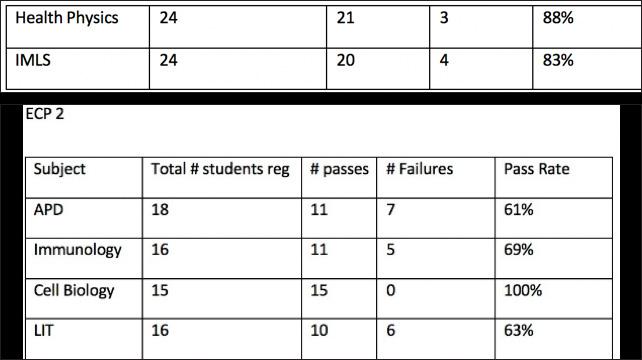
propoSeD 2020 proJeCtS AND INItIAtIVeS
Fundani partnerships and collaboration
Partnerships between the ecP Unit and units in Fundani should be fostered to strengthen ecP practices and visibility i.e. academic staff development, and cieT to deliver needs-based academic support. The FYe couild elevate visibility of ecP amongst students, and the Language Unit could assist with
multilingual projects and translation. The student Learning Unit’s new izimvo survey tool will prove to be useful in gathering feedback required for dheT visits and reports.
Mainstream staff collaborations: relationships with mainstream staff members should be fostered to develop and integrate interventions for student success (like the throughput study by Bruce McKenzie or the nBTbased diagnostic test). This could be taken on as a wider scale project that integrates the ecP into other existing structures using information already available to us (but it will take much effort, so capacity again becomes the main issue).
eCp Unit advocacy: ecP Unit intends to coordinate an ecP exclusive orientation day for students as well as feature at the institutional open day to promote ethos of ecP to prospective students.
eCp Unit research project: the ecP Unit has submitted a riFTaL proposal to enhance and strengthen assessment practices in ecP; the research intends to zoom in on lecturer/departmental ecP assessment practices and to determine to what degree technology could also be leveraged to enhance student success.
eCp Student Data analytics
greater emphasis will be placed on the capturing and analysis of ecP student data namely attendance, throughput, pass rates, and the like. The Unit intends to work closely with programme and faculty coordinators to identify and mitigate high impact modules, programmes and assessments as well as to interrogate the appropriateness of current ecP models and ultimately determine the contribution and impact of ecP across the institution.
eCp placement policy
The ecP unit will be instrumental in formulating institutional ecP placement policy in collaboration with faculty and programme ecP coordinators.
The policy will be undertaken in response to the revised dheT ecP Policy framework.
Quarterly ecP faculty and Programme coordinator meetings and reports ecP
Quarterly meetings dates have been circulated to coordinators; coordinators will submit reports one week prior to meeting so that pertinent issues can be discussed and addressed and to ensure that departments and Faculties regularly reflect and report on ecP practices.
eCp Unit Brochure
ecP Unit has produced a brochure which will be launched in 2020 to promote ecP offerings at cPUT.
eCp Blog and Website
The ecP Blog and website will be updated accordingly to ensure that current information is available to those who access the said information.
2020 eCp National colloquium
sTias in stellenbosch will host the 2020 national ecP colloquium which will be coordinated by the four partner institutions in the Western cape. The themes centre on promoting scholarship in ecP and the information is already available on the ecP Unit blog. The organizing committee will also be investigating options to secure a publication willing to publish a special edition; this would raise research profile of emerging ecP lecturers.
5.2 curriculum development Unit (cdU)
Dr Mashiyi has extensive teaching experience in initial Teacher education (iTe) and teaching and learning in higher education. her current research interests are in student academic support, language education and teaching and learning in higher education.

Teaching and Learning report
This report outlines the major activities of the Curriculum Development Unit in 2019 in reconceptualising our qualifications as a university of technology in relation to the Higher Education Qualifications Sub-Framework (hEQSF). It describes our activities in building a community of practice among Curriculum Officers in academic departments, and their colleagues, for sharing and exploring innovations for enhancing teaching and learning and for enhancing capacity in designing new hEQSF qualifications and curricula. The report concludes with a brief overview of research activities and our role in the Qualifications Evaluation Committee, an internal structure for approving new and priority qualifications before they are sent to the Academic Planning Committee and Senate for final approval.

2019 and to take over the work of the cdU until a new hod of the Unit was appointed.
FoCUS oF CDU IN 2019
The prime focus for the work of the cdU in 2019 has been on building the capacity of academic staff in curriculum design and improving their teaching practices through developing a community of professional higher education
particular, this is being directed at supporting academic staff in designing learning programmes for new heQsF qualifications for 2018 our support focused largely vanced diplomas, and in 2019 on the plomas and Bachelor hons qualifications. These qualifications are vital not only for students to progress from cPUT’s undergraduate diplomas towards possible Masters’ degrees, but also as professional development qualifications in different fields and in this respect
ficers’ (co) Forum in 2019, holding one meeting per term, on the following topics: to student profiles and ractices t CPUT
These topics were selected to explore the principles of good teaching and learning and showcase examples of where these were being expressed in innovative practices by cPUT teaching and academic development staff at cPUT. The purpose was to make these principles real and inspire teaching staff to improve their practice in innovative ways, while building a community of good teaching and learning practice among cos. The format of these four meetings was well received and cos reported that they found it very helpful to see and discuss what their colleagues were doing and discuss their work. The long-term objective is for cos to share what they have learned in these fora with colleagues in their academic departments and in this way continue expanding these communities of practice.
SHort ACADeMIC DeVeLopMeNt CoUrSeS For DeVeLopINg NeW HeQSF QUALIFICAtIoNS
From our experiences in 2018, we realised that a more intensive and systematic approach to programme and curriculum development was needed to assist academic staff, in particular cos, to conceptualise and design new heQsF learning programmes that both meet che and saQa accreditation criteria, but that also are learning-focused rather than following traditional teacher-focused design. it was decided, therefore, to collaborate with staff of the centre for

innovative education Technology (cieT) in piloting a blended learning curriculum planning short course in the first semester of 2019, aimed at academic staff involved in developing new Postgraduate diplomas. This was offered as a series of nine blended learning workshops, of three and a half hours each, with online facilitator-supported activities in between the face-to-face sessions as well as online resources and materials for flexible learning.
The workshops were well attended and emphasised collaborative engagement in design teams, both in the workshops and with academic colleagues, to illustrate that designing learning programmes and curricula should never be a solo but a collective activity.
although the pilot curriculum planning short course had some successes, it also had some challenges, chief amongst these being the time commitment required from the few cdU and cieT staff available to run these workshops. The workshop format also excluded certain academic staff with high teaching loads and those who were based on other campuses. as a consequence, it was decided to experiment with offering the course fully online in the second semester, to allow academics more flexible engagement with the topics and materials and to lighten the teaching commitment for cdU and cieT staff. a two-day, hands-on programme and curriculum design workshop was held at the end of the online course as these highly creative, collaborative activities cannot be achieved as effectively in the online space.
The online course was an exploration into new territory for both the cieT and cdU staff, as well as for most of the participants who signed up. While we all learned a number of lessons from this pilot, it was clear that building a community of learning is much more difficult in an online environment and this needs to be carefully and consistently managed.

Participants in the pilot first semester curriculum planning short course
Participants in the final workshop of the online course in curriculum development
eVALUAtIoN oF Co ForUM AND ACADeMIC DeVeLopMeNt SHort CoUrSeS
an external evaluator was appointed at the end of 2018 to evaluate the impact of the co Forum activities and the academic development short courses on building the capacity of cos in curriculum design, especially in developing new heQsF qualifications, as part of an action research project. The evaluator collected data on the various activities as these progressed and provided regular interim reports on her findings, to facilitate the actionreflection-improvement cycle of the research project. This has been of considerable value in informing and shaping the direction of the interventions and of the way forward for the cdU in 2020. The final evaluation report will be completed towards the end of 2020.
rIFtAL proJeCt
The cdU collaborated with the cieT on a riFTaL project that promoted the use of flexible pedagogic approaches and innovative educational technologies as a thoughtful fusion of programme/curriculum design and programme delivery. This has enabled conversations around innovative teaching, learning and assessment in all the programme and curriculum development workshops and has assisted participants in conceptualising curriculum as a learning-focused project. Prof daniela gachago is the leader of this project in collaboration with staff of the cieT and cdU

CoNFereNCe preSeNtAtIoN
Barbara Jones presented a paper at the heLTasa conference in Makhanda in november, entitled curriculum development as a collective sense-making and relational practice: the use of a heuristic device in curriculum planning’. This was based on the pilot first
semester curriculum planning short course in collaboration with Marianne Bester. The presentation was well received and there were several requests for the paper, which is being finalised.
QUALIFICAtIoNS
The cdU participated in the launch of the Qualifications evaluation committee (Qec), a sub-committee of the senate academic Planning committee (saPc), in March 2019, to give feedback on new programme applications and approve them for submission to the saPc. on request of the dVc academic, the cdU staff draw up an evaluation form to be used by Qec members as well as guidelines for evaluators on how to evaluate new programme applications at the institution. This has been shown to be most useful in guiding not only the evaluators but also the academic departments in compiling their submissions. The cdU continues to give feedback to the Qec on all submissions that come before the committee and to assist academic departments in compiling their new programme applications, on request. in addition, the cdU had individual meetings with staff from academic departments across the institution as well as ran a multitude of short workshops for academic departments in support of developing new heQsF qualifications. it is expected that the cdU will continue in this work, but in collaboration with other units in Fundani, in 2020.
DeVeLopMeNt, ApproVAL AND ACCreDItAtIoN oF NeW HeQSF
Academic staff development is addressed here in terms of support through a formal programme and non-formal programmes:
• The formal programme is aimed at professionalising university teaching and providing an entry into the field of education.
• The goal of providing ad hoc, non-formal training for academic staff, in the area of teaching and research, is to expedite the continuous professional development of academics so that they are at the cutting edge of teaching and research in higher education

Peninsula University of Technology, stellenbosch University, and the University of the Western cape. The goal of the programme is to professionalise teaching in higher education and to build capacity among university teachers, in the field of education.
The Pgdip (he) (T&L) comprises three core modules: 1) Teaching and Learning in higher education (TaLhe); 2) assessment in higher education (ahe) and 3) research for enhancing Teaching and Learning. candidates
must also choose an elective module from a list of the following: 1) icTs cial inclusion and difference; ademic Leadership and Management; 4) Postgraduate supervision; gagement; 6) Work and Learning; 7)
The programme is offered in phases over two years. in 2019, the second year of the 2018-2019 phase, was implemented with the research in higher ucation module, and two elective modules being run. nineteen candidates across the three collaborating universities completed the programme and brecht Waldemar Bussiahn, ekateria rzyankina and
ing to the success of the collaboration, the MoU between the three universities has been renewed, allowing the regional collaboration to continue
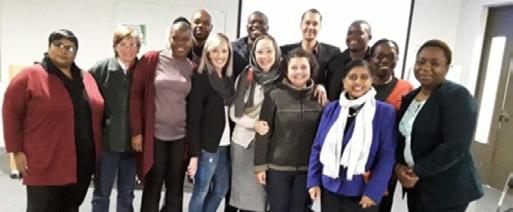
The institutional coordinator for the PgDip (hE) (T&L programme, A/Professor Lorraine Hassan is seen photographed here (far right, front row) with some of the PGDip(HE)(T&L) candidates who graduated in 2019.
Teaching and Learning report
SCHoLArSHIp oF teACHINg AND LeArNINg
The scholarship of Teaching and Learning (soTL) promotes teaching as a scholarly endeavour while drawing on the reciprocal relationship between teaching and learning and research. The soTL gives a community of academics the knowledge and skills to pursue teaching and learning in a scholarly manner and make their work public. at cPUT, the soTL programme has the following aims:
• To explore and promote the notion of researcher development as an emerging field in academic staff development.
• To develop a university-wide community of scholars of teaching and learning.
• To apply the principles of the scholarship of teaching and learning to departmental pedagogical and curricular initiatives for the enhancement of student learning.
• To raise the intellectual profile of teaching in the disciplines.
• To build capacity among academics to become successful SoTL practitioners.
some of the envisaged outcomes are given as follows:
• The research findings of pedagogical experimentation which could be used for evidence-based teaching for the enhancement of teaching and improvement of student performance.
• The empowerment of academics as researchers in teaching and learning, within the disciplines.
• Research outputs in accredited journal articles and conference proceedings which will generate income for the individual, department and the institution, and contribute positively to the ranking of the institution.
The soTL programme runs over two years as a non-formal programme. in the first year, soTL candidates are expected to attend monthly workshops and complete the necessary homework tasks. The soTL programme provides:
1) access to the relevant literature, 2) Methodological expertise, 3) space for discussion and collaboration with like-minded colleagues and 4) Mentoring from senior, experienced researchers. in the second year, a writing retreat is held which provides an opportunity for candidates to write up articles and papers for publication. Making their, work public contributes to pedagogical knowledge in their disciplines (hutchings,huber and ciccone 2011).
in 2019, the first year of a new phase of the soTL programme was implemented. nine soTL workshops were run throughout the year and were attended by academics from the various faculties across the university. an evaluation of the soTL programme showed that many candidates felt that the programme gave them the “confidence to do research”. although, many cited a heavy workload as being a challenge, some did find time to participate in the programme. seven candidates presented their research projects, pertaining to their pedagogical practice, on 18 october 2019. To a large extent, the research projects focussed on the use of multilingualism in teaching and the application of technology to enhance teaching and learning. The successful completion of the soTL programme is contingent on the submission of a journal article for publication or presentation/ publication of a conference paper.
INDUCtIoN progrAMMe
The institutional induction programme provides an excellent networking opportunity for newly appointed academics. it also provides information about the role of the various units within Fundani ched to create awareness of the staff and student support programmes that are available at the institution. There is also a focus on the development of academic staff as individuals in that workshops on strategic career development for early career academics are also offered. The career-T model is adopted to provide guidance and direction in planning one’s career in the areas of teaching, research and academic leadership. inductees are also made familiar with the ad hominem Policy.
Thirty candidates attended the induction programme held in March 2019. Twenty candidates attended the induction retreat held in december 2019 at aha de Zalze in stellenbosh. Positive feedback from the candidates indicated that the induction programme was beneficial in adjusting to the institution and in networking. The session on strategic career development was particularly well received.

The Teaching development Programme (TdP) is a non-formal programme which is mandatory for all newly employed academics. The intention is to provide knowledge and skills in the area of pedagogical practice. The programme runs for a year with workshops being held in the first semester and the development of a teaching portfolio in the second semester.
The following highlights took place in 2019: • Practical workshops were offered to new academics on teaching
learning and assessment covering various topics to expose them to pedagogy of teaching in higher education.
• A seminar was held in November and certificates issued to 17 participants who successfully met the criteria for the requirement. during the seminar 5 participants from 2018 and 2019 groups presented papers on learning and teaching in higher education.
• Riftal funding was received for the impact evaluation of the programme. Focus group interviews were conducted in different departments: Mechanical engineering, clothing and Textile Technology, electrical, electronic and computer engineering, industrial and systems engineering, construction Management and Quantity surveying, horticultural sciences and Wellness sciences.
• Three academics from 2018 and 2019 TDP groups received Excellence Teaching awards
• Research Conference attendance: A paper was presented entitled ‘challenges experienced by students enrolled in the ecP at a University of Technology in south africa’ at athens on 13-15 May 2019. The abstract was published in the Book of abstracts: international conference on education in a coMing – communication institute of greece. Publications: a paper titled ‘entering the world of academia is like starting a new life, a trio of reflections from health Professionals joining academia as second career academics’ was published ion the international journal for academics (a collaboration with stellenbosch and UcT).
teACHINg DeVeLopMeNt progrAMMe (tDp)
The nstitutional coordinator for the PgDip (hE) (T&L programme, A/Professor Lorraine Hassan is seen photographed here (far right, front row) with some of the PGDip(HE)(T&L) candidates who graduated in 2019.

Teaching and Learning report
The RPL report deals with the different types of RPL done at CPUT and how each is implemented:
• Access into first year, focusing on the use of tests to determine whether an RPL applicant meets the entry requirements of a specific qualification;
• Exemptions, credits transfer, determining whether informal and non-formal learning can meet learning outcomes of a subject in a qualification; and
• Advanced standing, providing status to a rPL applicant to continue with studies at a post-diploma level
• This report includes the number of rPL applications processed in 2019.
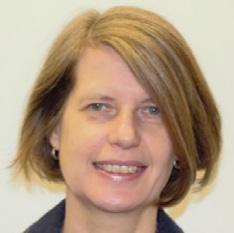
total of 288 rPL applications were received by PUT for the 2020 intake. These applications included all three types of rPL namely access into first year, advanced standing into higher qualification such as the advanced diploma, and exemptions via rPL. a total of 157 was
nate. This is the largest group of approvals done by L are unpacked and the number of applications for each summarised at the end of the report.
L applications received were for access into first year. These applications are received from individuals who do not meet the entry requirements of their chosen qualification. The knowledge gained in the workplace is often sufficient to cope with studies at first year level, notwithstanding the fact the person either does not have matric or has low L process is used to provide the applicant with a platform to demonstrate the knowledge gained either informally or non-formally.

c e n T r e F o r
F U
Frederika de graaff rPL Lecturer
EMC candidates in EMS workshops
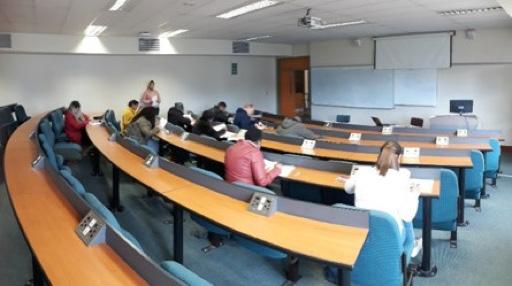
The department of emergency Medical service (eMs) accepts rPL applications from individuals who are working as paramedics with short courses completed through the health Professional council of sa (hPcsa). if the applicant has more than five years’ working experience they may apply for access into the diploma or Bachelor in emergency Management care (eMc) after an initial screening process, some of the applicants are invited to workshops in Mathematics, Life sciences and Physics. These subjects are part of the entry requirements of these qualifications, but are not prerequisites for the courses completed with the hPcsa. cPUT invites the applicants to the workshops over a four week period with the aim of upgrading the individual’s knowledge in these specific subjects. at the same time, the candidates are introduced to higher education and how teaching and learning takes place, preparing these individuals who have not been within a formal education setting for first year study.
in the Faculty of Business and Management sciences (FBMs) a similar approach is used. The faculty has standardised tests for literacy and numeracy. The entry requirement for english is 50% or a 4 (aPs) of all
the qualifications offered by the faculty. The rPL committee in the faculty developed an english test to determine english proficiency which is used for all applicants. some of the qualifications in this faculty require higher marks in the subject Mathematical Literacy than other qualifications. The numeracy test thus makes provision for these differences by having different subsections for different qualifications. These tests provide the academic staff dealing with the rPL applications with insight into the language and numeracy ability of the applicants. Based on these tests and working experience, the faculty can make an informed decision whether to grant an rPL applicant access to first year or not.
rpL exeMptIoNS
rPL is not only used for entry into the university, but also for exemptions based on informal and non-formal learning, referred to as exemption rPL. a total of 53 of these applications were approved in 2019 for specific subjects. These are students currently registered, but with substantial work experience. in order to be able to grant rPL exemptions the work of the individual has to be relevant and sufficient to meet the learning outcomes of the said subjects. Three specific groups of individuals were granted rPL exemptions, namely; • 24 students on the BHSc: Medical Laboratory Science Articulation Programme. These were individuals who have already completed an nd and in some case the BTech in Biomedical sciences and would like to upgrade to the Bachelor in Medical Laboratory science. all of these individuals were granted exemptions for c inical Practice 3 and communication.
• 14 in the ND Mechatronics are individuals who were working as mechanics, millwrights and quality assurors were granted exemptions for subjects: engineering Professional studies, computer integrated Manufacturing, Process control, industrial networking and Mechatronic design.
• Three in ND in Mechanical Engineering for the subject commonly referred to as P1, which is the first six months of in-service learning.
Applicants in FBMS writing tests
• 10 in the ND OMT were individuals with extensive work experience as office administrators.
The assessment for these subjects was done using the learning outcomes of each subject. The students were required to submit a portfolio of evidence. due to the fact that in Biomedical, engineering and oMT these individuals concerned were already students, the portfolio building process was incorporated into the formal programme. especially in the case of Biomedical sciences, the portfolio building process was done over a 12 month’ period, providing the applicants adequate time to collect naturally occurring evidence from the workplace.
occasionally an individual does not have a matric or the aPs is low, but does have extensive work experience in a specific field. in 2019, the FBMs received one such an application in human resource Management. The person had a senior certificate with the incorrect subjects and therefore did not meet the entry requirements of the qualification. This applicant had been working in the hrM environment as an hr generalist for more than 11 years. Passing the literacy and numeracy tests, access could be granted. in this case cPUT granted not only access into first year, but also exemption could be granted based on the portfolio of evidence that was submitted for one subject, Labour relations 1 within the hrM diploma.
Life is a journey of planned and unplanned events. sometimes individuals cannot complete their qualifications for a variety of reasons, some taking more than 10 years before they decide to return to cPUT. The validity of subjects in an uncompleted qualification has a 10-year limit commonly referred to as the ‘ten year rule’. sometimes individuals will in the field studied originally, and develop knowledge within the workplace. if this workplace experience is relevant to the qualification, these applications are regarded as rPL applications. in 2019, only one such application was approved, in architectural Technology, using the exemption rPL route. rPL has recently become the accepted method to accommodate these individuals and assist them to complete their qualifications.
ADVANCeD StANDINg
The university is sometimes requested to consider advanced standing. These are rPL applications into a higher level of study, then the applicants qualify based on their formal studies. one such application, for Food and Beverages was approved by the university in 2019 for a staff member who worked within the academic programme for many years and developed knowledge and skills at the level of the third year of the relevant qualification. a portfolio of evidence was submitted by this specific applicant based on the third year subjects of the underpinning diploma. due to the fact that she is a staff member working as an assistant in the department, she had the unique opportunity to develop knowledge required at third year level and was able to demonstrate it to the academic staff.
it is a challenge for an rPL applicant to provide knowledge at third year level, and fulling this requirement is usually not accomplished by applicants. This was the case in two applications received, one for Project Management, and another in Marketing, who were requested by the university to complete the third year subjects for non-diploma purposes, before continuing with studies at the advanced diploma level.
an average of 60% is required before admission to the advanced diploma is granted. on various occasions the rPL Unit has been approached by individuals who did not achieve 60% average, but had been working a few years and wanted to use the rPL process to gain admission to the advanced diploma. The FBMs decided in the beginning of 2018 to use the rPL process for applications such as these. Two such applications were received in the faculty and approved
one application was received from a graphic designer, whose work is on the level of the BTech: graphic design. after careful consideration of the individual’s working career, achievements, portfolio and a research proposal, the person was granted advanced standing into the MTech: design.
The total of applications which were approved are listed in the table below per faculty.
The rPL Unit in Fundani ched offers training in rPL for academic staff every year. The short course on rPL deals with the theoretical underpinning of rPL, the process itself within the institution and the assessment of naturally occurring evidence.
The rPL lecturer has been part of the co Forum and has been working on the heQsF Qualification development Project Team. rPL was built into the heQsF qualification development short course, both in the face-to-face offering as well as the online course.
The SLU is a subsidiary of Fundani Centre for Higher Education Development. The aim of this unit is to provide academic support to undergraduate students at CPUT. This unit consists of three sections: Academic Literacy, Tutor and Teaching Assistant Development, and Mathematics and Science.

student success remains a priority for the sLU, which is evident in the projects undertaken in 2019. The support initiatives aims to bring together academic staff development of subject lecturers to collectively establish interventions that foster student engagement. as 2019 draws to an end, we reflected on the highlights as well as the opportunities awaiting in 2020. This includes embracing the one sMarT cPUT vision through the development of resources to advance this cause in the new year.

enriching their learning experience, by involving students who themselves have experienced such a transition themselves. By engaging in peer support it can aid both subject understanding and act as a platform for developing students’
Tutor development remains one of the fundamental components of cPUT student academic support initiative. The role of the tutor is to provide peer academic support to students within the discipline or in some instances t has been argued that widened access is no guarantee for epistemological access or student success (Wilson-strydom, 2010). Programmes such as the tutor development are supported through the Ucdg funding as a support and development intervention for student success and PUT, a total of 171 tutors were trained across faculties in 2019. engineering statistics are not reflected here as tutor training in located within the faculty. according to Work study, a total of 237 tutors were appointed with a high percentage of students appointed in theFaculty of Business Management and science (40%) followed by Faculty of engineering (26%) and the Faculty of applied science (17%). Tutors were appointed in the Faculty of informatics and design (6%) and a smaller percentage in Faculty of education and health and Wellness (5.4%). Fundani appointed a tutor in Mathematics development to support the mathematics programme.
MeNt
a large percentage (76%) of students appointed as tutors were at the level of BTech and national diploma, with 10.8% at Master’s level and 13% at Phd level. The total spend on tutor appointments from March – december 2019 was r1 662 316. The appointment rate was lower at the start of 2019 as a result of the uncertainty around the funding of the number of tutors. While there were a few challenges with regards to the appointment of tutors in 2019, future plans include working more closely with faculties and academic staff, more especially with high impact subjects to gauge the efficacy of student support initiatives.
teACHINg ASSIStANt DeVeLopMeNt
The Teaching assistant programme is a cPUT initiative to facilitate the professional development of teaching assistants at a discipline-specific level. This year a total of 84 teaching assistants were trained, which is reflected below. The teaching assistant programme has continues to be supported at cPUT. BTech, Masters and Phd students are employed on a part time basis to help deliver this teaching load, traditionally as laboratory, practical and field class demonstrators, supporting tutors and tutorials. The following is an indication of the number of Teaching assistants appointed in faculties as well as the number of resignations.
ACADeMIC LIterACy
The academic Literacy (aL) section consists of three academic literacy lecturers: two located on Bellville campus and another one located on the diustrict six campus. There was one learning facilitator employed on contract basis located in Bellville. due to the renovations taking place at the e-learning building, student Learning had to be relocated to the engineering Building. This was a huge challenge with regards to office allocation. The unit provides aL support to students who need to submit assignments, reports and essays to lecturers in faculties.
WrItINg CeNtre CoNSULtAtIoNS
This year the academic Literacy unit was overwhelmed by the number of consultations requested by students. as awareness of the unit expands, more and more departments are referring students to the academic Literacy unit. This has necessitated the need to explore alternate ways of providing academic literacy support to students.
consultations at the Bellville campus remain high. a number of departments make use of the academic literacy support offered by student Learning. There has also been an increase in requests from postgraduate students for writing support. historically, student Learning support did not extend to post-graduate students; however, there are increasing requests for writing support workshops. This year there was a movement towards online consultation. The option was made available to students to send their projects via email. Mr Mtonjeni used track changes (micro level feedback) and summary (macro level feedback). The table below accounts for the online consultation performed.
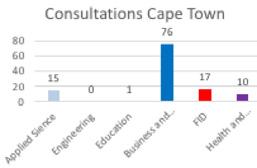
MAtHeMAtICS SUpport INItIAtIVeS

Mathematics support consists of one lecturer who provides academic support through individual, group consultations and self-study activities. Team teaching between the mathematics support lecturer and lecturers in faculties take place
regularly. There are also 4 learning facilitators on Bellville campus and one learning facilitator on the district six campus.
at the start of 2019 a mathematics support initiative was established at the granger Bay campus for Maritime studies. Mr Frikkie george worked closely with the lecturer by developing tutorial sessions which took place on Tuesdays and Thursdays. This initiative proved to be highly successful. Mr george successfully pioneered the first Mathematics and Physics Project in the department of Maritime studies. Mr george will continue to provide academic support to students in the new Bachelors qualification in 2020.
opeN eDUCAtIoNAL reSoUrCe
oer material and short videos are in the process of being developed for students to access online. The aim of the online material is to make mathematics assistance and revision available to students as and when required. The students below are creating the online material by talking through the various equations and screening casting/video recording the process. This will enable students to revise mathematical problems at their own pace.
NAtIoNAL BeNCHMArk teSt (NB
Mr george was invited to participate in a 3-day workshop, run by a senior psychometrician from the educational Testing service, Usa The diploma panel workshop was from 17 to 19 october. Participants were asked, inter alia, to consider the probability of the students they taught being able to pass various items. This usually elicited some interesting discussion and argument!

teACHINg ADVANCeMeNt
At UNIVerSIty (2018-2019):
Dr xeNA CUpIDo
Symposium: Student Learning Unit/Student Feedback Symposium
The 2nd annual student Learning symposium was held in conjunction with student Feedback, 2 october at sareTec Bellville. The theme of the symposium: ‘co-creating decolonised Learning and Teaching spaces: Toward student Partnerships’.

This annual event is fast becoming a highlight for the sLU as staff and students from various disciplines are provided with the opportunity to engage in dialogue around teaching and learning. The aim of the symposium was to explore new approaches to engage students in the learning and teaching process. approximately 73 academics and students from across the six faculties registered to attend the symposium.

Dr thulani Mkhize, a senior lecturer in english studies at the University of KwaZulu-natal presented the keynote address, titled: ‘The role of a university in creating and promoting student partnerships’. her keynote presentation focused on the urgent need to transform institutions of learning and work towards what a decolonized and transformed south african university should look like.

nokhanyo Mdzanga (nMU) and respondent Prof. dion nkomo (rU) illustrated this interconnectivity by drawing from case studies in the teacher education curriculum. a panel discussion consisting of lecturers and students from various faculties contributed to the debate by reflecting on multilin gual practices employed at cPUT or lack thereof. in the typical Language indaba fashion of promoting multilingualism and social cohesion, simultaneous interpreting services (english-isiXhosa and english-afrikaans) were provided by professional language practitioners.
New Frontiers in Forensic Linguistics: Themes and Perspectives in Language and Law in Africa and Beyond

beyond its borders was made possible by funding obtained through the national
Forensic Linguistics is an unfamiliar field of study in africa, while it is popular in stralia and United Kingdom. This field is a coming together of already independent and established disciplines of language, law, anthropology, psychology, criminology, police science, among others.
frican academics, together with their counterparts from the caribbean and ustralia have provided rich content that illuminates the challenges posed by linguistic diversity in the rigid legal and justice systems in the respective regions, and how this further disadvantages marginalised communities.
The book is divided into four parts: Police investigative interviewing; Language Practice in the Legal Process; Language as evidence; and Forensic Linguistic evidence. The themes covered attest to the benefit of an interdisciplinary approach to legal and justice challenges. researchers and students will benefit immensely from this book.
Highlights for the Language Unit:
• The Language Indaba • Book on Forensic Linguistics
Nomxolisi Jantjies
Co-editors Prof. Monwabisi Ralarala and Prof. Russell Kaschula. Photo credit: CPUT MCD
5.7 heLTasa

report oN A CrItICAL DIALogUe: HeLtASA IN 2019
re-imagining academic development in a changing university landscape: the case of a university of technology. siya sabata, emmanuel ekale esambe, Thembinkosi Mtonjeni, Fundani centre for higher education development (Fundani ched) cape Peninsula University of Technology
This critical dialogue above reflected on an ongoing curriculum development Unit (cdU) project at Fundani ched which examines the extent to which ad practices (in various units) enable or constrain transformation agenda. This project emerged out of our thinking and debates around ways in which the Fundani ched could be re-imagined and repositioned to be at the centre of all pedagogic interventions geared towards transformation in our institution. This critical dialogue was an attempt to demonstrate to the sector ways in which action research might enable more informed transformative praxis in the field of academic staff development.
For the purpose of this critical dialogue we focused on three significant projects in south africa’s higher education space:-
1. The extended curriculum Programme (ecP)
2. The Writing centre
3. The First Year experience (FYe)
This was a ground breaking research which demonstrated how a novel theoretical framework, the racial contract code Theory (sabata, forthcoming) enables a far more nuanced analysis of the inner workings of a racialised higher education (he) system. We demonstrated how practices in the selected projects represent an over-dependence on epistemological access and yet are blind to the historical racial structure and culture which forms the foundation of the current higher education predicament. critical analysis of the underlying practices of these projects motivated the call for a transformation of ad that builds on a critical humanist curriculum to recentre african ontological being and epistemologies.
critical questions generated through this dialogue were as follows:-
• What do you think could be the role of HELTASA?
• To what extent is the current PGDip enabling or constraining cultivation of agency?
• How could the framework for enhancement of academics as teachers help to achieve this goal?
• How do we build communities of trust to engage with the systemic problems beyond the boundaries of the colonial universities?
a book chapter emanating from this project is currently in press and is entitled ‘The curriculum and academic development in an era of transformation in south africa’.

L i B r aries 6
The ability to access, evaluate, manage and use information is one of the key outcomes in cPUT academic programmes. it was in recognition of this critical graduate outcome that, in 2017, the cPUT senate resolved that the integration of information Literacy content and assessment will be compulsory to all undergraduate programmes. The integration was implemented through a collaborative effort between cPUT Libraries and faculty academic staff. The year 2019 therefore marked the second year for the compulsory integration of information Literacy into academic curriculum. as such, the year offered an opportunity to reflect on the integration, as well as the information Literary content and assessment.
Led by the information Literacy committee, a sub-committee of the senate Teaching and Learning committee, the integration of information Literacy continued successfully in 2019. all faculties were able to comply with the senate decision and most programmes integrated information Literacy content and assessment in a first year subject. although the integration was only compulsory for first year subjects, some departments also rolled it out beyond first year. some departments also requested advanced information Literary sessions for their advanced qualifications.
implementation of the compulsory integration in 2018 highlighted the need to review the information Literacy content. some faculty academic staff, in whose subject integration was implemented, had requested better alignment between information Literacy and their existing subject content. information Literacy content also needs to be relevant to the workplace after students have graduated. cPUT
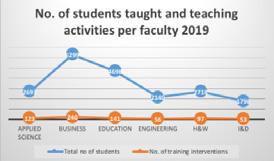
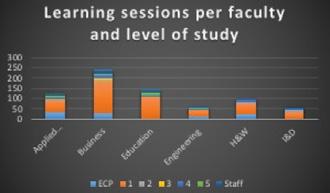
Teaching and Learning report 2019
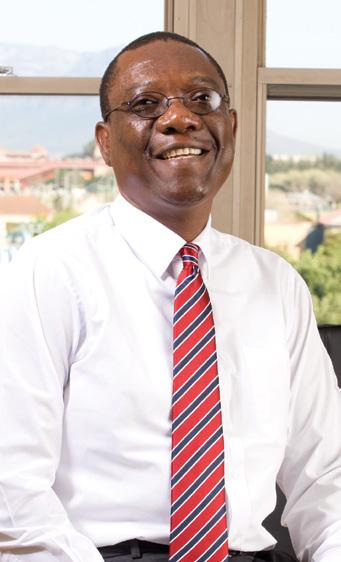
Dr Elisha Chiware
d i rector: c P UT Libraries
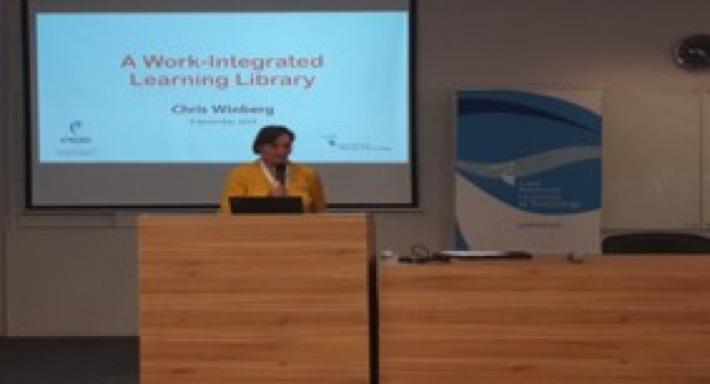
experts and other relevant stakeholders. The workshop was followed by the Libraries’ internal information Literacy curriculum review workshop. input from the seminar was very informative in guiding the Libraries’ curriculum review workshop. a draft review curriculum has been prepared for implementation in 2020.
in addition to curriculum review above, cPUT Libraries also embarked on an exercise to review the information Literacy assessment. an item analysis was conducted on the existing assessment to identify questions which needed to be reconsidered. a working group, consisting of Libraries and faculty academic staff, was formed to review the identified questions, and any other issues on the assessment. after two intensive workshops, the working group developed the draft revised assessment. The revised assessment will also be implemented in 2020.

ser V i ce L e arning & c i V i c e ngage M e n T 7
service-Learning and civic engagement in context
service-Learning (sL) favours an academic and scholarly approach to community engagement which requires lecturers to integrate their activities into the curriculum. Lecturers are encouraged by the service-Learning Unit to register both their service-Learning and civic engagement (ce) projects with the respective units. although these projects reside in two separate units, the projects often overlap or in some cases, evolving from a ce project into a sL project. departments and faculties are expected to conduct at least one sL project per academic programme and as a result, there are an increasing number of academic disciplines across faculties which integrate sL into academic programmes. in 2019 the sL Unit conducted individual and project team consultations with academic staff and external partners to plan and conceptualise their projects. Project teams continuously improved on their projects by conducting reflection and evaluations. The table below indicates those faculties and departments which implemented sL in 2019.
Many new conveners with new projects come on board every year and therefore future activities for the unit will include more intensive capacity building sessions for staff, students and external partners.

The second chance Matric rewrite flagship project has been in operation since 2015 and provides tuition and support to Matric learners on Fridays and saturdays at cPUT, Bellville campus. Learners were provided with an opportunity to rewrite the national senior certificate (nsc) examination which took place
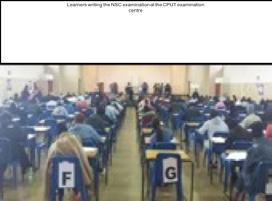
from october to november 2019. The main aim of the project has evolved over the years to specifically focus on providing learners with an opportunity to improve their marks so that they can qualify for university entry in their chosen programme. Mr Vuyo Mhlonto is the Project coordinator and is responsible for project implementation and coordination. he carefully selects learners according to the department of Basic education (dBe) criteria from an application pool of approximately 500 learners. Many learners are referred by university staff and student societies, including the student representative council in cases where they did not meet the criteria for acceptance for the programme of their choice. The classes were opened to those cPUT students who required additional support in the offered subjects. in 2019, 240 Learners were accepted into the programme and were registered with the Western cape education department (Wced). The project contributes to job creation by employing qualified and registered sace teachers to conduct revision of selected scarce skills subjects: Mathematics, Life sciences and Physical science. due to the high demand, Mathematics Literacy and english First additional Language were added in 2019. This project contributes to the science and technology sector as it offers subjects which learners require to be accepted into engineering, science and health fields. registered cPUT students who are second chance alumni volunteer their time to assist Mr Mhlonto with some of the project activities. in 2019 dr Francois Wewers from the Faculty of applied science successfully integrated his chemistry programme into the project which saw the implementation of the sL component. chemistry students provided additional tutorials for the learners in Mathematics and Physical science. This project is also part of an ongoing research project on the implementation of graduate attributes in the chemistry programme.
trANSDISCIpLINAry SerVICe-LeArNINg proJeCtS
The trans-disciplinary approach to curriculum integration dissolves the boundaries between the conventional disciplines, and organizes teaching and learning around
SeCoND
Learners writing the NSC examination at the CPUT examination centre
the construction of meaning in the context of real-world problems or themes. This approach relies on team members sharing roles and crossing disciplin[ary] boundaries; the primary purpose is to collaborate and integrate the expertise of team members providing a more efficient provision of service (Bruder, 1994).
Service-Learning transdisciplinary p
The emergency Medical sciences department, Mechanical engineering department, construction Management and Quantity surveying, Maritime studies and hospitality Management combined forces with camissa solutions to implement their projects at rural high schools on the West coast and at a cultural music festival in the columbine nature reserve in Paternoster.

The very first project was initiated by Mr nicholas Pinfold, Town and regional Planning department, with the training of youth volunteers and gis mapping of the columbine nature reserve. in 2019, the project kicked off with the training of community food vendors at the cape Town hotel school. This was followed by a visit to the festival construction site at the columbine reserve where students were given a lecture and experienced the building of the stage that was designed by a german engineer. The students followed this activity by engaging in educational activities with youth, high school learners and the general public in the columbine nature reserve and at Louwville high school in Vredenburg:
• Water purification
• Energy saving
• Water safety and drowning prevention
• Basic CPR
• Fire safety
• Sex education
• Alternative construction techniques
• Raft building and testing.
Teaching and Learning report 2019
transdisciplinary Service-Learning projects: District Six
a transdisciplinary sL workshop with multiple stakeholders and lecturers was held on 2 May 2019 for all district six projects. The academic departments involved currently in district six service-Learning projects are Town and regional Planning, civil engineering, hospitality Management, construction Management and Quantity surveying, graphic design, Management and Project Management, Mechanical engineering, horticultural Technology, sports Management, architectural Technology, and Photography. There is potential for the inclusion of many more disciplines. additional workshops and meetings were conducted during the course of the year with more project teams which focussed on the further development of the projects.




transdisciplinary Service-Learning project: Wellington Campus
Lecturers and students from the education department in Wellington together with the sports Management department launched a unique project
Emergency Medical Sciences students with Mr Walter Kohlhofer at Louville High School, Vredenberg
Construction Management and Quantity Surveying students and lecturers from Electrical engineering visit the construction site at the Columbine Nature Reserve.
Electrical Engineering students preparing their energy saving installation for the youth.
Construction Management and Quantity Surveying students showing young children how to build a shelter from gabions and sandbags.
Youth testing the raft that they built under the guidance of the Emergency Medical Sciences students.
for school learners.

This concept evolved from a pilot project in 2018 which was first conceptualised by sLce Unit Manager jacqueline scheepers and dr hanlie dippenaar. in 2019 dr dippenaar extended the project to include dr candice Livingston; Mrs joanne arendse; Ms Valencia Theys; Mrs Kobie Meiring; dr Pieter Boer, dr andries de Beer and Mr ettienne joubert.
in this project students shared their expertise, and guided and supported fifty grade six and seven learners at the following activity stations:
Creative arts – Mrs. c Meiring, danielle Beugger (Feather) cecilia Pienaar
ashwill Meyer, coleen Lewies
Human movement & First Aid – dr Boer, Megan carstens, jc, Monita
Koen (Feedback sheet & card with emergency numbers)
Wellness – cPUT clinic, sister irene damon & cPUT Psychologist, janine
Mentoor-Van sitters
reading – Mrs arendse, dr Livingston, corne conradie
Writing – Ms Theys, johan Pienaar, chris Botha


Learners and students received certificates of participation. The project was applauded by the academic departments and lecturers intend to publish write and disseminate research on the project.
trANSDISCIpLINAry eNgINeerINg AND SCIeNCe expo
camissa solutions invited the sLce Units to attend workshops with the Black Business Forum (BBF) from 5 – 6 september 2019 and to conduct workshops with 30 school learners from 7 – 8 september 2019. The organisation sponsored the workshops and provided accommodation for cPUT staff and students. The workshops with the BBF was initiated by the sLce Units and facilitated by the office of the consumer Protector, department of economic development and Tourism, Western cape government. The cPUT programme focussed on Maritime sciences and disasters at sea, sustainable and renewable energy solutions, mapping and drone technology, 3-d printing and a visit to the Mossel Bay harbour. academic departments that participated were emergency Medical sciences, Mechanical engineering, Maritime studies and electrical, electronic and computer engineering. Facilitators shared their personal success stories and expertise in engineering and science with learners. students and school learners were provided with opportunities to reflect on the impact of this intervention. camissa solutions has agreed to collaborate on more projects in the future, especially in rural communities in the Western cape. The programme below shows the activities which were conducted with high school learners in Mossel Bay.

The Service-Learning Trans-disciplinary project team: students, school learners and lecturers
Human Movement and First Aid to promote Health and Wellness
The finished product: Spread your Wings!

c e n T r e F o r Persona L and Pro F e ssiona L d e V e L o P M e n T ( c P P d )
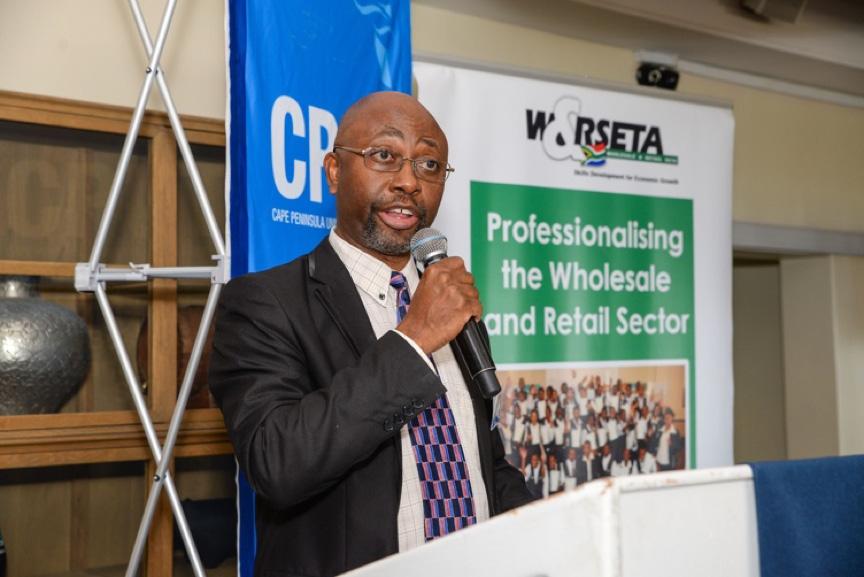
Mr Shoni Khangala
director: centre for Professional and Personal development (cPPd)
was focused full-time on his coaching and mentoring company ertified Life and Business Master coach, and a coMensa registered honi’s 29 years’ corporate experience includes the clothing industry, financial services, education consulting services, as well as tourism and conservation within the public
honi has a wide range of experience including assessment of competency, training of assessors, and tutoring in business schools, where he has tutored MBa students in marketing, international business, corporate strategy, business and professional ethics, organizational behaviour and management, as well
honi has two Master’s degrees: in Marketing, from heriot-Watt University’s edinburgh Business school evelopment and Management, from new Buckinghamshire University (Top iploma in Marketing from the institute of Marketing Management (iMM) (Top iplomas in Business Management and in Personnel Management (executive education); as well cience degree from the University of cape Town.
AND perSoNAL DeVeLopMeNt) – SHort CoUrSeS
ontinuing education (cce), the centre for Professional and Personal ) is the department charged with custodianship of short courses within the cape PUT). in addition to approximately 80 undergraduate and post PUT offers a variety of short courses spread across all six faculties of the university.
‘The s environment is like a mini-university’, says Khangala, director of cPPd. ‘Most of the challenges within the short course environment are quite similar to those within the university’s main stream academic t is thus important for any university offering short courses to have appropriate governance, management and administrative structures in place, specifically focused on the short courses environment.’ The role and mandate of cPPd is to ensure a well-managed and coordinated approach to developing, managing and growing the short course offerings at cPUT. it is cPPd’s role among others, to ensure suitability and viability of short course offerings within the University.
during 2019 there were a number of milestones and achievements within cPPd since the appointment of the new the director in november 2018, 15 new short courses were introduced across four faculties. Five short courses in nursing science were approved at the last cPPd Management Body meeting of the year (27 november 2019). in total, 2100 students enrolled for short courses in 2019. 1500 students successfully completed their courses in 2019.
CertIFICAte AWArD CereMoNIeS
Whilst most short course certificates are issued individually, during 2019 there were also special certificate award ceremonies. certificate award ceremonies serve not only as highlight for the learners, but also a way to strengthen relations with organizations that sponsor the studies. 43 certificates were awarded by the Wholesale and r academy at a ceremony that was attended by representatives of the retail industry. The certificates issued included certificate in retail Financial Management, retail operations Management, and the retail store Manager Qualification.
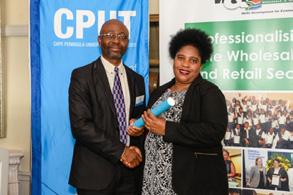
The gcM (graduate centre for Management) also held a certificate ceremony for 20 employees of the cape Winelands district Municipality, for the occupational certificate office administrator: Public service administrator program. This is a 52 credit
Teaching and Learning report
qualification, assessed externally, and registered with the Quality council for Trades and occupations (QcTo).
toWArDS QCto poLICy
during 2019 there was much debate within the institution as to whether or not it was appropriate for short offering entities to be involved in QcTo and seTa-accredited qualifications.
cPPd took the lead in and ownership of the process to help the institution find direction regarding this matter. Following guidance from the Quality directorate, efforts are now underway to formulate a policy with respect QcTo related qualifications. a Task Team chaired by the cPPd director, which will focus on policy on QcTo related qualifications, has already begun its work. The Policy on QcTo-related qualifications, which will be finalized during 2020, will clear the way for cPUT to contribute optimally to an undoubtedly massive landscape in terms of the country’s skills needs.
expLorINg CAreer AND experIeNtIAL LeArNINg opportUNItIeS
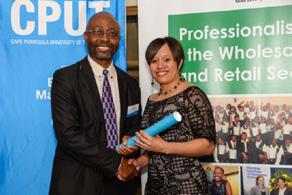
The cPPd director has forged relationship with the Tourism, hotel investment and networking conference (Thinc). he is exploring ways by which Thinc can offer experiential learning opportunities for cPUT students – especially those within the tourism and hospitality environment. during the 2019 Thinc event, which was held at the cTicc in cape Town, cPUT students from the ape Town hotel school offered logistical support to the event. They were also provided an opportunity to network with captains of industry. Through the hinc event, there was potential for some of the participating organizations to target cPUT students for career opportunities or for experiential learning.
INDUStry eNgAgeMeNt
during 2019 cPPd participated at the Kimberly-clark career day. Kimberlyclark south africa is a subsidiary of the Us-based Kimberly-clark corporation. The company has manufacturing facilities located in springs (gauteng) and cape Town (Western cape), and employs over 800 people. The career day was hosted for the company’s employees and it is linked to the company’s bursary programme. The programme covers the following areas: engineering & projects, supply chain & logistics, hr, operations, manufacturing, finance, marketing and quality. since cPUT does offer both formal programmes and short courses in the above areas, the relationship with Kimberly-clark south africa provides opportunities.
WAy ForWArD For CppD IN 2020
during 2020 cPPd will implement the outcomes of a process that was initiated in 2019, i.e. the alignment of staff roles and responsibilities with the short course Policy and the department’s strategy. The process of rewriting all job descriptions for cPPd staff has already been finalized. cPPd staff are motivated and encouraged by this process. human capital has offered to assist the process where required.
2020 will see the beginning of joint ownership of the strategy and direction of the short course environment between cPPd and the short course offering entities (scoes). a joint strategic planning workshop between cPPd and the scoes was scheduled for February 2020.
on the governance side, the following aspects of the short course Policy will receive particular attention during 2020:
• Submission of business plans for all by the offering entities;
• Drafting of MOUs that govern the relationship among the CPPD, CPUT and the scoes;
• A quality audit of environment;
• Implementation of risk management strategies in line with the risk register, the draft of which was finalized in november 2019.

sT r aT e gic i n i T i aT i V e s
and Par T n ershi P s ( s i P ) 9

Prof René Pellissier director, strategy and internationalisation
sMar T inTernaTionaLisaTion
Smart internationalisation is CPUT’s commitment to the strategic value of our internationalisation efforts in achieving and sharing our advancements in technology and innovation, and collaboratively blurring the lines between ourselves and our partners in the achievement of multicultural and intra-international communities of practice for mutual beneficence and sustainability of the global environment.
internationalisation is undoubtedly one of the most powerful forces for change in contemporary higher education (he). The international dimension and the position of he in the global arena are given greater emphasis in international, national and institutional documents and mission statements than ever before. While internationalisation was practiced at cPUT since before its merger in 2005, finding a strategic direction and purpose for internationalisation that kept cPUT visible in the global arena, as well as continuing to provide value-added opportunities and access to resources for students and staff, became a challenge in the ever-evolving digital era. s gnificant functions and activities were developed in 2019.
in 2019, three major internationalisation developments took place at cPUT, viz. the senate approved ‘smart internationalisation strategy’ which underpins all internationalisation activities and provides a road map to becoming a global player in the changing world of information and knowledge. The strategy is a response to the government Framework on internationalisation that requires a more focused approach of internationalization and acknowledges the role of internationalisation in cPUT’s new direction of becoming a smart university through one sMarT cPUT. The strategy identifies three components for smart internationalisation: inbound internationalisation, outbound internationalisation and internationalisation of the curriculum to enrich the cPUT academic and research community through internationalisation value. Work is underway to ensure that all three components of smart internationalization are on track.
secondly, cPUT implemented a strategic internationalisation review committee (sirc) to oversee the strategic value of possible partnerships or collaborations and ensure that they are aligned to cPUT’s smart internationalisation strategy and goals; to ensure fair support, distribution of knowledge, and shared
Teaching and Learning report
information across cPUT; and to identify, and discuss issues in relation to strategic partnerships consistent with the Vision and Mission at cPUT. This committee met quarterly. cPUT’s internationalisation direction is determined through a tiered partnership framework. These tiers direct the strategic direction towards increasing our strategic partnerships on the african continent, in line with cPUT’s identity.
table 1: tier 1 and tier 2 partnerships and strategic direction
Internationalisation value Transactional and historical value strategic direction and value
individual, unit, departmental level institutional and longterm value-added partnerships
exchange of resources collaborative work for infrastructure and capacity development, including grants and third-stream income possible applications student mobility degree completion staff mobility joint/ collaborative degrees research collaboration Postgraduate qualification completion Policy development
Thirdly, an internationalisation Forum was introduced for academic and support staff to meet and share how each can, and does, play a role in instituting a culture of internationalisation across the university. The internationalisation Forum is intended to bring a broader understanding around internationalisation and its impact on all role players at an institution of higher learning. Faculty research coordinators were identified as the champions of internationalisation in each faculty serving the dual role of supporting the cPUT internationalisation agenda. The platform was also used to showcase partnerships and project
best practices, share strategic partner information and grant and funding opportunities. The internationalisation Forum met three times a year.
StrAtegIC INterNAtIoNAL pArtNerSHIpS
cPUT continued to engage with international partners with the fundamental objective to seek teaching and learning opportunities through mobility, blended learning opportunities, curriculum development, as well as seeking out research collaboration and publication initiatives.
new partnerships enquiries in 2019 were required to synchronize intent with cPUT’s research focus areas, the 17 sustainable development goals (as determined by the United nations) and display mutual benefit, using our assessment form. While cPUT continues to grow its internationalisation dna, our partnership collaborations continue to fluctuate between being of strategic or of functional value. The implementation of the smart internationalisation strategy across faculties in 2020 will, with time, develop a more strategic approach to partnerships.
engagement with local, national and international partners increased in 2019. The highest number of international partnership agreements came from germany, France, Belgium and the netherlands (Fig 1).
Mobility is often the first activity undertaken in a partnership agreement. during 2019 mobility continued to be the vehicle for new and existing partnerships in providing outbound internationalisation experiences for cPUT staff and students. Figure 2 below provides a cross-section of the academic faculties engagement in mobility, the academic arenas the mobility is carried out in, as well as the regions in which most mobility is undertaken. international student enrollments at cPUT (Table 3) reflect the full-time student numbers from 2011 – 2019 showing a decline in enrolments in 2019.
erASMUS pLUS CApACIty BUILDINg AppLICAtIoNS FUNDeD IN 2019
ViTagLoBaL
cPUT is involved in the ViTagLoBaL erasmus+ project through the department of agriculture, Faculty of applied sciences. The lead partner is University of rovira i Virgili (UrV), catalonia. The objective of the capacity development programme is to contribute to local development in the field of oenology, by enhancing study programmes in agricultural science and, specifically, vini-/viticulture, which are of strategic economic importance in europe, south america, south africa and georgia. The specific objectives are to build capacity to develop joint programmes in vini-/viticulture and oenology at the Masters level, to internationalise and integrate curricula, widen mobility opportunities for students and staff, and ultimately internationalise the university contribution to local development; as well as capacity of higher education institutions (heis) to sharpen their impact on local development in the vini-/viticulture sector, via multilateral knowledge transfer and in conjunction with industry and other socio-economic partners, and to consolidate a diverse international network of heis with a common interest in contributing to local development and a shared commitment to agricultural science, vini-/viticulture and oenology, as a basis for academic cooperation and industry partnerships.
erASMUS pLUS CApACIty BUILDINg proJeCtS UpDAte For 2019
Peesa iii
Peesa iii (Personalized engineering education in southern africa) is a project funded by the european Union on the erasmus + K2 programme. it commenced in 2017 and is funded until september 2020. cPUT is part
of an eight-member consortium of universities (four south african UoTs and four european Universities) which is currently developing a range of professional master’s degrees in the engineering field. The P eesa iii consortium undertook to develop two master’s degrees: viz, a Master of engineering in sustainable construction and a Master of engineering in engineering Management. The Master of engineering in engineering Management has been developed by the consortium and is going through the regulatory processes.

Figure 1: International partnership Collaborations 2019
Teaching and Learning report


terNAtIoNAL CApACIty DeVeLopMeNt progrAMMeS
PUT engaged in a series of strategic capacity building international network alliances. These networks are with south african and european universities.
he yeBo! Capacity Building project
The YeBo! project is an international collaborative project involving seven outh african and five european universities. Participating universities in outh africa are the University of the Western cape, Tshwane University of Technology, central University of Technology, University of Pretoria, University stellenbosch and the University of cape Town.
The european institutions are Technical University of Berlin (germany); Vilniaus edimino Technikos Universitatas (Lithuania); Uppsala University (sweden); hent University (Belgium) and University of Montpellier (France). There are three uropean organisations involved: cirad (France), eUa and coimbra group.
The project focuses on internationalisation of Phd studies, promotion of internationalisation of Phd studies in south africa and europe, increasing the number of Phd students and staff trained in the internationalisation of Phd studies, as well as facilitation of access to information relating to funding, mobility and administrative procedures of Phd programmes.
a series of workshops, conferences and meetings were held to develop structures and services to support the Phd life cycle. The following trainings and conferences were held in 2019: • Training 1 (March 2019). hosted by University of Pretoria on the theme of structuring services (e.g. iros) to support international mobility and collaboration on Phd level and on structures/services (doctoral schools) to enhance the international quality of the Phd research.
Figure 2: International Mobility 2019
Figure 3: international student enrolment (2011-2019)
• Training 2 (June 2019). hosted by stellenbosch University and UcT on the theme of developing a toolbox for supervising international Phd students.
• Conference 1 (June 2019). hosted by eUa-cde annual Meeting in Brescia, YeBo! partners organised a brief session withing eUacde programme to present the challenges and opportunities for the internationalisation of Phd studies in south africa.
• Conference 2 (August 2019). hosted during the ieasa annual conference in cape Town, a dedicated session on the internationalisation of Phd studies was organised by YeBo! consortium.
SANorD
The southern african, nordic center (sanord) is committed to advancing strategic multilateral academic collaboration between institutions in the southern african and nordic regions, and seeks to address new local and global challenges of innovation and development. sanord’s activities are based on fundamental values of democracy, social equity and academic engagement, and on the relationships of trust built between the regions over time.
The Brian o’connell (Boc), scholarship program was introduced for Ma students to spend between three and five months at a sanord nordic member institution to conduct research. The primary focus was to provide mobility for academic and research collaboration with nordic partners. one cPUT candidate from the Faculty of Business and Management sciences was awarded the schorlarship.
in september, the University of Botswana, gaborone, hosted the 12th annual scientific conference. The theme for the conference was ‘The role of higher education in Forging sustainable Livelihoods’ particularly in its alignment to the sustainable development goals (sdgs). The conference was organized according to priorities reflected within the various themes – sdg
implementation, graduate employability, gender equity, female empowerment, poverty eradication and global partnerships for sustainable development and sustainable livelihoods
SASUF
The south africa-sweden University Forum (sasUF) is a strategic internationalisation project running from 2017-2020 with the overall aim of strengthening ties between sweden and south africa in research, education and innovation. sasUF is a collaboration between 36 universities in sweden and south africa together with embassies, funding agencies and ministries in both countries. Uppsala University has the task of coordinating the project. during the lifespan of the sasUF project (2017-2020) the project aims to fulfil the following objectives:
• Bring together researchers from Sweden & South Africa in seminars, exchanges & projects
• Create innovative ways to approach internationalization & utilize the power of digital tools in international collaboration
• Connect researchers with funding agencies, industry, ministries & surrounding society in working towards the sustainable development goals (sdgs).
sasUF has a budget of 22 000 000 seK and is funded by sTinT (swedish Foundation for international cooperation in research and higher education), the national research Foundation and the department of higher education & Training in south africa, in combination with partner universities.
The south africa/sweden research & innovation Week was hosted in south africa, a sweden research seminar that took place in May 2019 at stellenbosch University. Upon the submission of abstracts, the participating researchers were asked to select one of six thematic areas, referred to as ‘challenges’, which were derived from the Un sustainable development goals (sdgs). each
Teaching and Learning report
challenge involved roughly 60-70 participants, with some variation, who were subsequently divided into 2-4 subgroups within each challenge. The format for the research seminar and the division of participants into groups was coordinated by the academic advisory committee (aac) for each of the six challenges:
• Climate change, natural resources and sustainability
• Education for a sustainable society
• Social transformation through change: Knowledge and social development strategies for society
• Understanding the burden of disease in Sweden and South Africa and its impact on the health systems of the two countries in the future
• Sustainable urbanization, travel and tourism in the 21st century
• Digital Technologies, cybersecurity and digital transformation
INterNAtIoNAL ACtIVItIeS AND eVeNtS
International Mother tongue Day
in February, cPUT celebrated international Mother Tongue day by calling on the cPUT community to learn a greeting in a foreign language. international students were filmed doing greetings in their mother-tongue and shared on social media in the week running up to the campaign. cPUT uses a variety of interventions in the lecture halls to accommodate multilingualism from online multilingual glossaries to a touch screen directory with various faculties trying different approaches to see what works best. The concept was also a hot topic at last year’s decolonisation seminars.
International Scholarship Fair
in april, cPUT hosted an international scholarship fair for students and staff that was funded by the British council. international scholarship agencies
showcased opportunities at display tables in the outside student arena; international representatives presented an overview of their programs and staff and scholarship representatives were invited to a networking lunch to share ideas and concepts around internationalisation. international representatives included the British council, the european Union, the United states consulate, the national research Foundation, the german scholarship agency daad, the embassy of France, the department of higher education and Training, the government of hungary, the irish embassy, sanord, the dutch exchange agency nUFFic, and the chinese embassy.
Africa Day
in May, cPUT celebrated africa day as a social media campaign via Facebook and instagram. staff and students were challenged to dress up in traditional wear and share what makes them proud to be an african. The campaign reached over 27 000 users.

c e n T r e F o r i n no VaT i V e
e d U c aT i ona L Techno L o g Y ( c ie T )
Using Multimodal academic staff development Modalities
since 2017, staff from the curriculum development Unit in Fundani ched and the centre for innovative educational Technology have been working with academic departments that are designing advanced diplomas, postgraduate diplomas and honours degrees, which need to accommodate diverse students by offering flexible learning options using blended learning. support to the curriculum officers (cos) and departments in the development of the new heQsF qualifications has taken various forms, such as seminars, workshops and co forums, which have focused on interrogating and discussing the principles, theories and practices of programme and curriculum development in a UoT context. however, we decided to move to a more intensive and systematic approach to programme and curriculum development to assist these academics to conceptualise and design educationally robust learning programmes that, at the same time, conform to the prescriptive requirements and templates of the national accreditation and registration authorities. Moreover, as a way of building longer-term curriculum development capacity in the institution, these interventions needed to promote the social construction of knowledge through collaborative activities among participants and with their colleagues in academic departments.
To enhance the collaborative approach, we decided therefore to pilot a blended learning short course in the first semester of 2019, offered as a series of nine workshops with online facilitator-supported activities in between the face-to-face sessions. This proved very successful, as participants’ feedback showed that they enjoyed the collaboration and discussions during these workshops and appreciated the input and support given by facilitators and colleagues on their curriculum designs. however, there were also challenges, such as staff being from different campuses and with high teaching loads which made it difficult to attend the course face-toface, and long-term unsustainable demands on the facilitators. Therefore, in
the second semester, to mitigate some of these challenges, and to open the course to a wider spectrum of academics interested in curriculum development, we redesigned the short course as a largely online offering, consisting of weekly webinars on Blackboard collaborate and collaborative online activities.
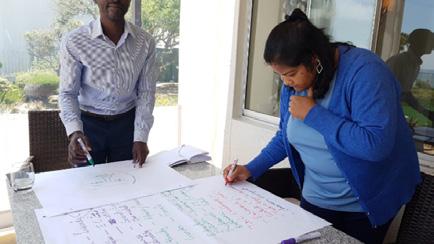
The course was completed with a 2-day face to face learning design workshop in granger Bay. in their feedback, participants responded positively to the webinars (which for many participants were still a novel experience at that time), and the online learning activities (both individual and collective), helped them find structure and rhythm to their learning experience. They commented that the intimacy of the webinars allowed for ongoing conversations, contributing towards the building of a learning community across the institution, and provided opportunities to listen to the recordings in their own time. They also mentioned the short and easily accessible critical readings that sparked provocative conversations, and the value of the final two-day design workshop, which consolidated the contents of the module and allowed for productive engagement and discussions among participants.
see https://sites.google.com/view/2019flexiblelearning/home for the online course.
Participants working on Learning Design Activities

cieT continued offering monthly seminars and workshops on the use of technologies in teaching and learning. workshops were held across all on various topics such as blended learning course design, online assessment, eportfolios, increasing classroom engagement and many more. were 337 attendants at these workshops. For an overview of the seminars/workshops please see our blog: blogs.cput.ac.za/edutech

oer proJeCt AND WorkSHop

We also continued with our oers project and selected another group of lecturers at cPUT to receive funding to create learning resources for their teaching and for sharing online as oers To support them, cieT invited a materials developer and oers specialist Tony elliott from saide to run a two-day workshop on developing open education resources for cPUT colleagues. Pre-workshop survey showed that some of the participants did not have materials development skills, had not used oers in their teaching and learning and did not know how to use the open licenses. at the end of the workshop, participants were equipped with the above skills and some of them produced oers. experience showed that a two day workshop was not enough to fully capacitate the staff members, which will be addressed in the next iteration of the project. Procurement process at cPUT was a big hindrance to implementation of the project as there were many challenges for participants accessing their grants. The above challenges will be addressed in the next offering of the project aimed at producing learning materials for our students in difficult areas where relevant materials are not available in textbooks and existing oers; sharing these materials as oers; and hence helping the participants and cPUT participate in the open education movement. Lecturers who attended this workshop may have found the knowledge they gained in this workshop useful as they developed multimodal materials for remote teaching and learning in the wake of the coVid-19 pandemic.
Moving Academic Staff Development from a face-to-face workshop to online learning
Learning Design Workshop
Materials developer and OERs specialist, Tony Elliott from SAIDE facilitating an OERs workshop for CPUT
2019 CpUt teACHINg AND LeArNINg WItH teCHNoLogy DAy
2019 cPUT Teaching and Learning with Technology day took place on 22 august 2019 in sareTec, on the Bellville campus. The theme was ‘Unpacking the 4th industrial revolution’. approximately 125 participants registered and 93 participants attended. The programme consisted of three keynotes, Prof. deshen Moodley, deputy director: centre for artificial intelligence research, University of cape Town, who spoke on artificial intelligence: implications for teaching, learning and research in south african universities; Prof alexander Broadbent, executive dean humanities, University of johannesburg, who asked the question: if 4ir won’t happen, what then for he institutions? and finally Prof johannes cronje, dean informatics and design, cPUT, who reflected on how teaching and learning would change in the 4ir: We may be in the 4th industrial revolution, but we are still working with human 1.0 educational Technology: Myths debunked.
in total we had 16 presentations and 1 workshop delivered during the day. one venue focused on discipline-specific approaches to respond to the 4ir, such as implications of the Fourth industrial revolution for the fourth estate, or how to move to an integrated course in engineering as gateway to industry 4.0 education; another venue hosted presentations on tools and technologies to use in the 4ir, such as using augmented reality to educate the millennial learner, or teaching tourist guiding with vlogging; and the third venue had presentations focused on how to support 21st century students, such as reflecting on assessments for 21st century learners, or psychological preparation of students for the Fourth industrial revolution. Feedback on the event showed that 86% of participants felt encouraged to use more technology in their teaching and learning, 85% found that presenters did a good job, 89% were happy with the organisation, and 92% indicated that they would recommend the event to their colleagues. This feedback showed that the event achieved its intended aim, whereby champions within the university shared innovative pedagogies and exposed
and encouraged staff who were not using technology to consider integrating technology into their teaching and learning practices.

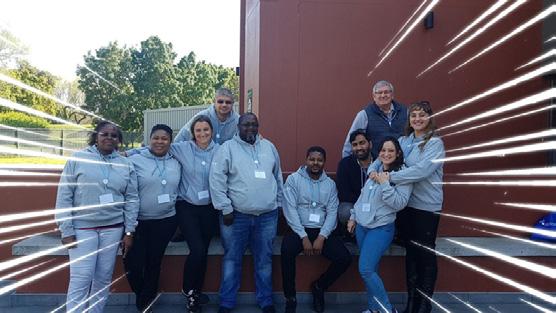
The event was made possible by the work and efforts of all cieT staff members in collaboration with faculty This was also the last official event hosted by our former director, Mr sakkie smit, who retired at the end of august 2019. We wished Mr smit well in his retirement.
Meet the CIET 2019 Dream Team
Mr Sakkie Smit, closing the 2019 event
CeNtre For INNoVAtIVe eDUCAtIoNAL teCHNoLogy (CIet)
LeArNINg ANALytICS SyMpoSIUM

Toward reaffirming cPUT’s position as a forerunner in the field of learning analytics, the centre for innovative educational Technology (cieT) hosted a symposium from the 8-9 april 2019 at the river club in observatory, cape Town. cPUT is amongst 80% of the world’s leading higher education institutions utilising the Blackboard Learner Management system (LMs). cieT invited two experts, dr ruth newberry and Ms adriana Botha to present at the symposium to ensure that cPUT was able to continually utilise the powerful functionality of its LMs for data mining for improving teaching and learning and for decision making. ruth is senior Product Marketing Manager at Blackboard and adriana is an educational consultant at the University of Pretoria, in the final stages of her pursuit of a Phd in the field of higher education.
The objective of the symposium was threefold: firstly, the symposium aimed to build an understanding of how the goals tool in Blackboard could be used to ensure the envisaged alignment of programmes/modules outcomes on the LMs; secondly, to uncover how student learning analytics, generated by the goals tool can be used to inform instructional practices, course design and programme assessment; and thirdly, to establish guidelines that will be used to inform best practices for the use of the goals tool and student learning data to improve student performance and decision making.
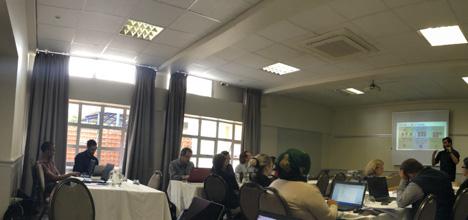
during 2019, The centre for innovative educational Technology (cieT), offered a blended learning and learning analytics staff development programme at the granger Bay hotel school and sareTec The aim of these workshops was threefold: firstly, to facilitate staff in their conceptualisation of blended learning; secondly, to lay the foundation for staff to redesign their teaching and learning practices towards the adoption of blended learning; and finally, to provide staff with an overview of the powerful analytics tools available to them. The three aspects covered in these workshops are important because one can only get good and quality data if courses are properly designed and blended learning is implemented as a practice to promote student-centred approach to teaching and learning.

+27 (0)21 959 6767
info@cput.ac.za
@cput
@wearecput
www.cput.ac.za
www.facebook.com/cput.ac.za
